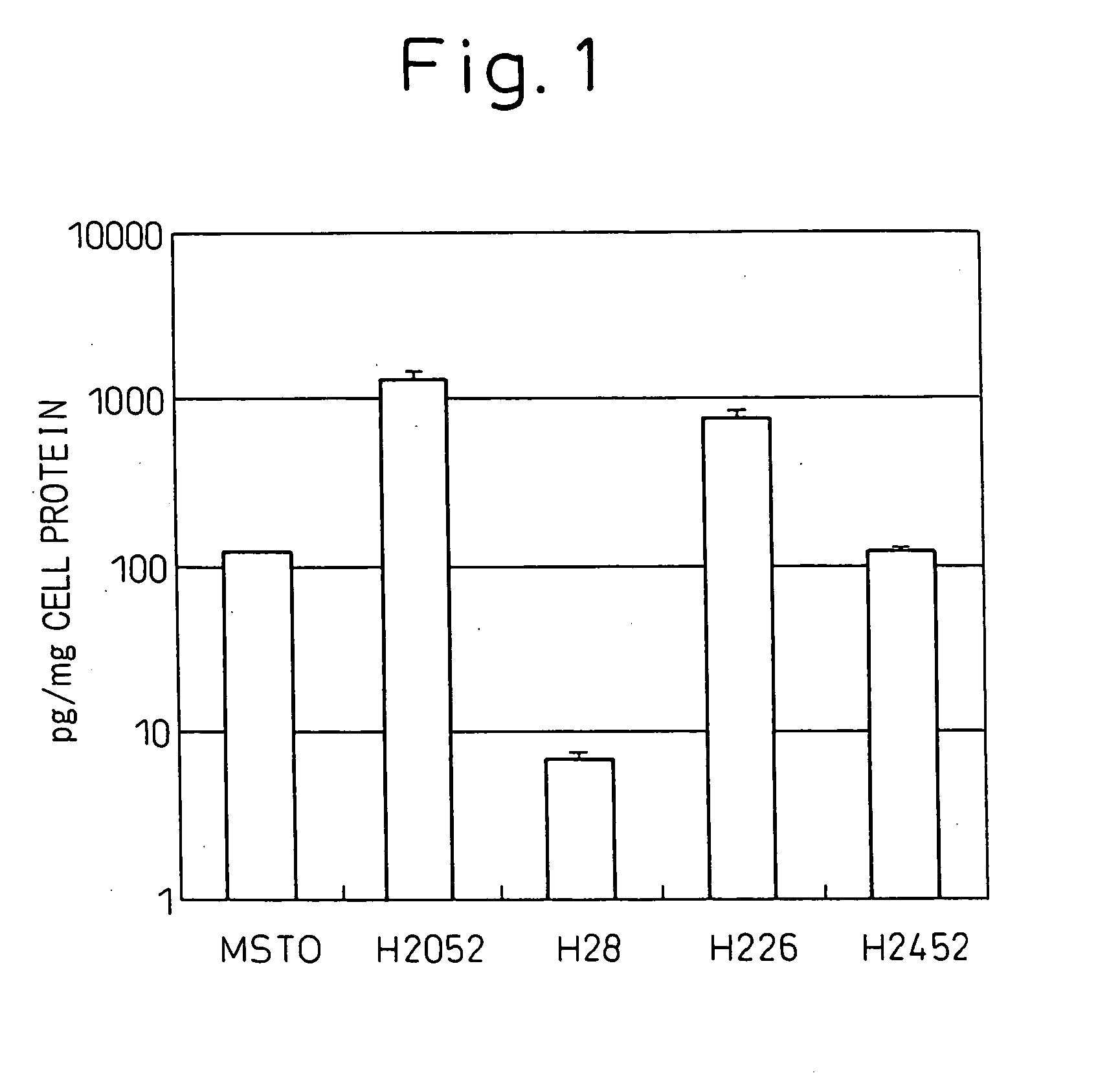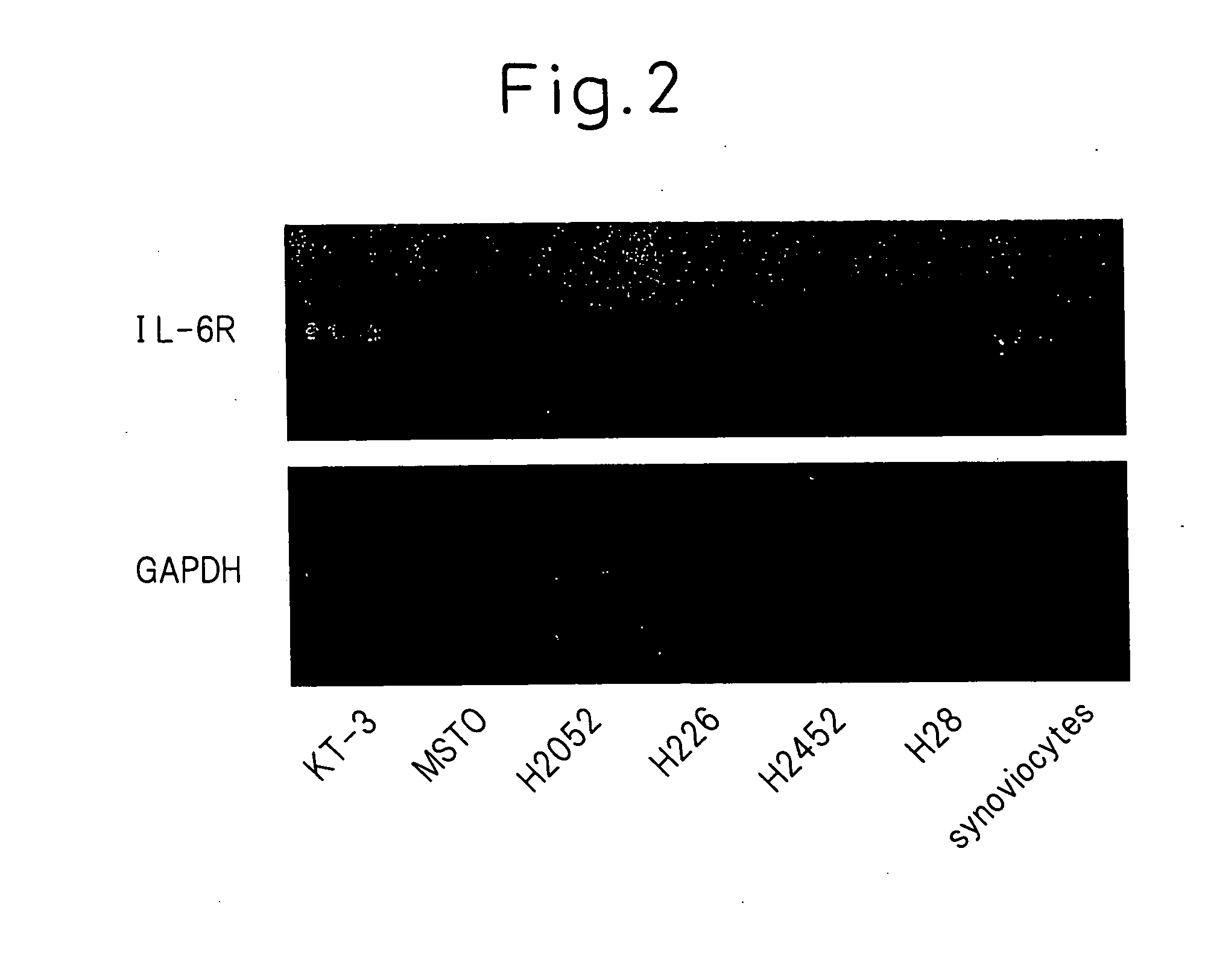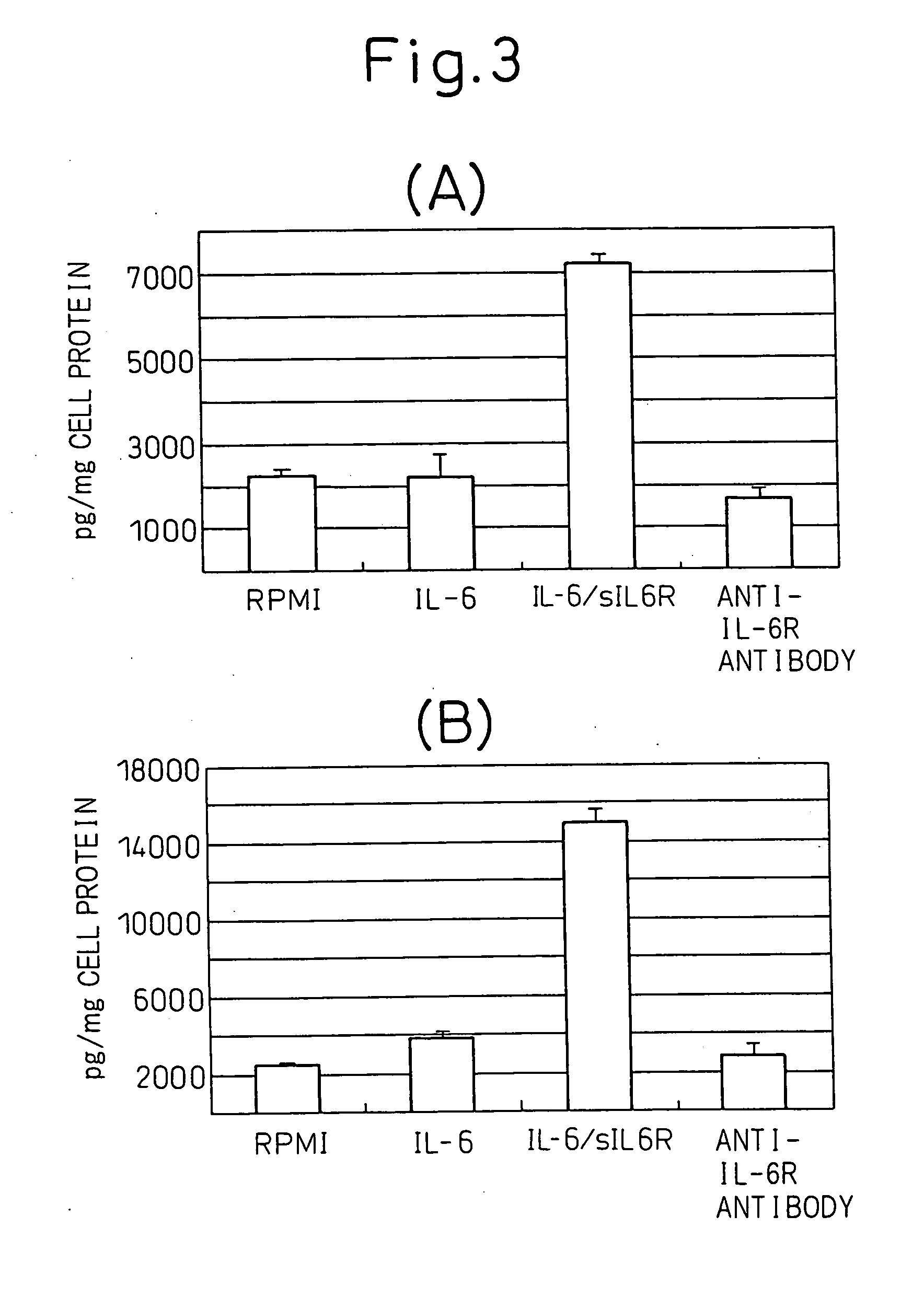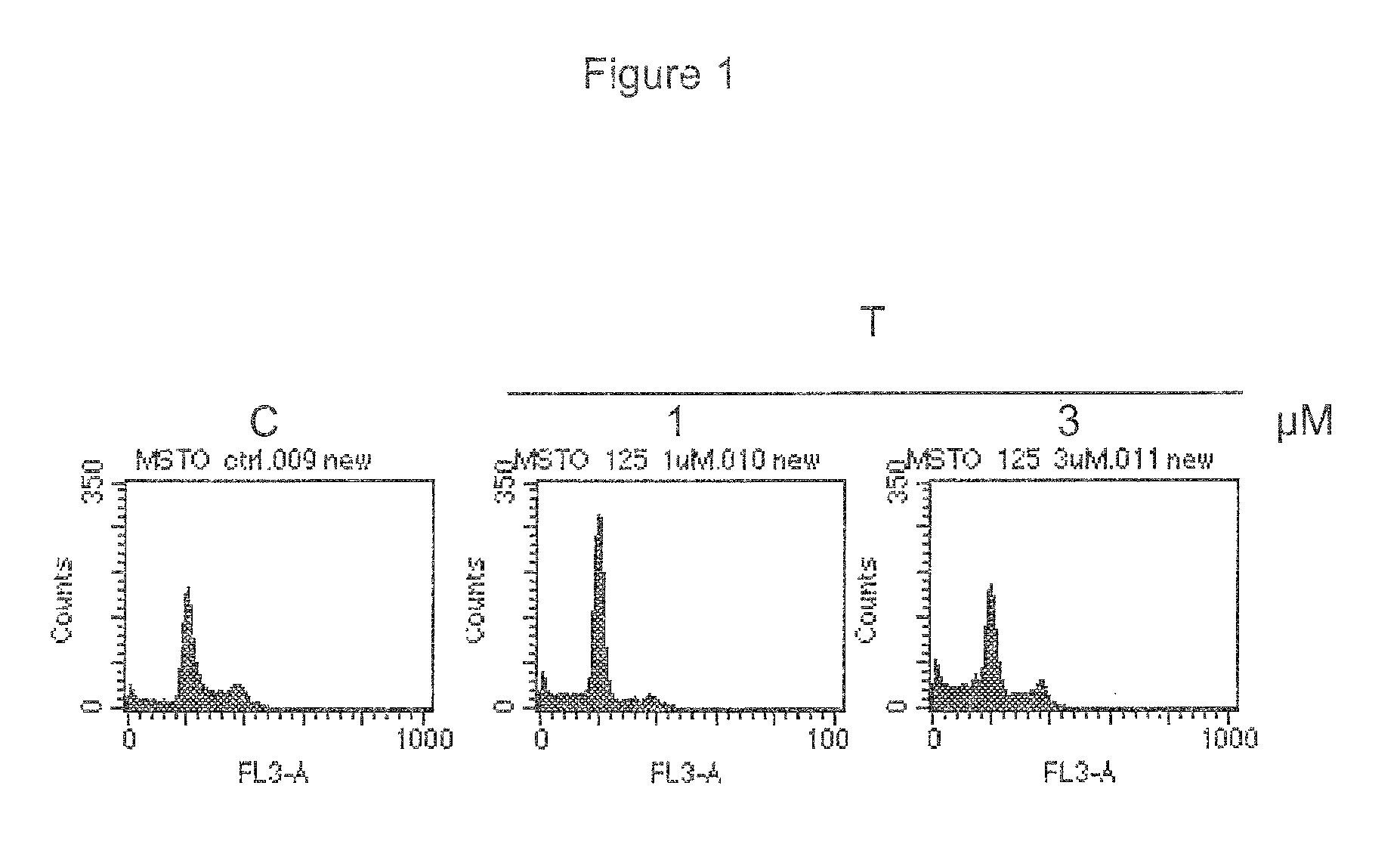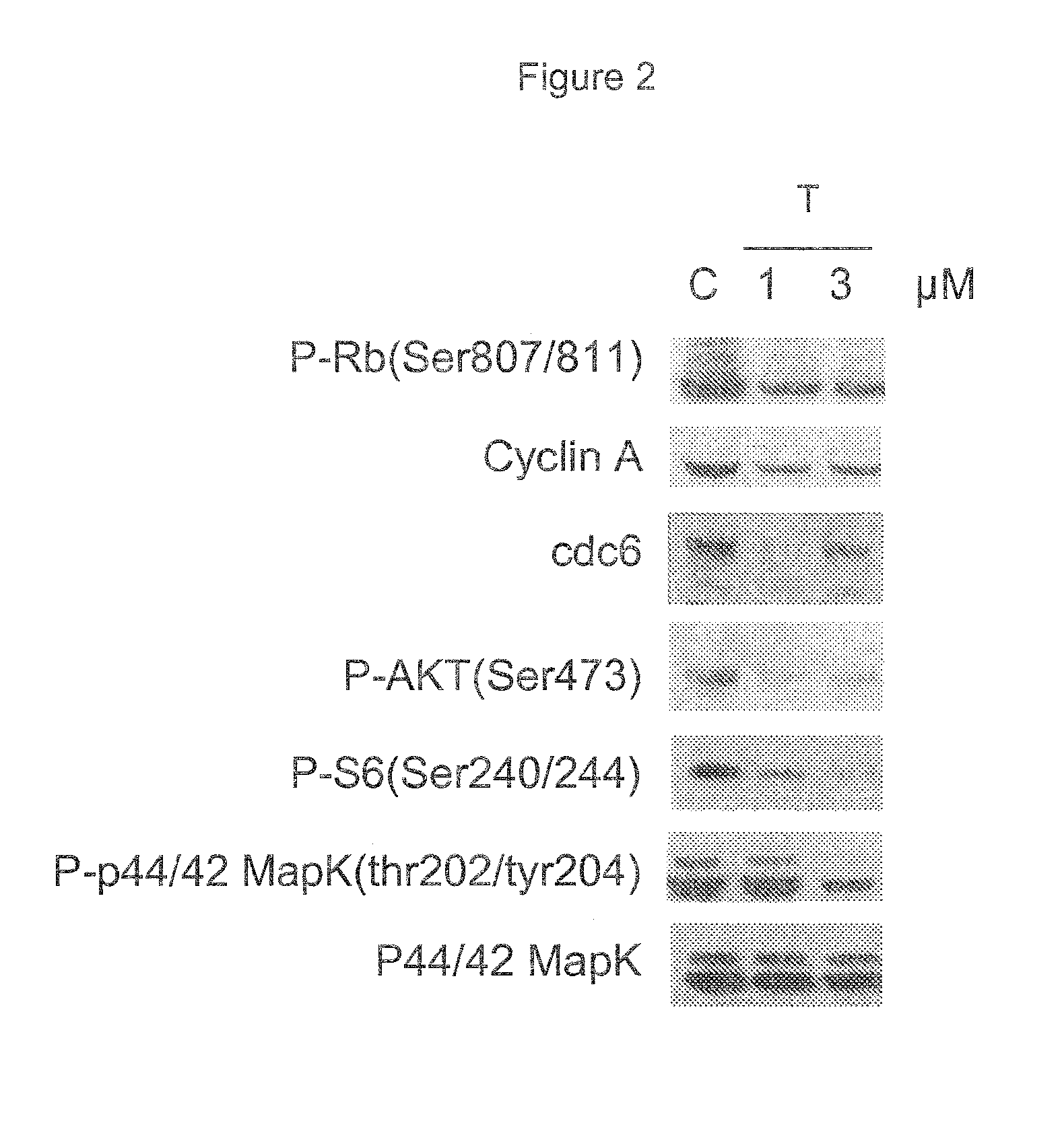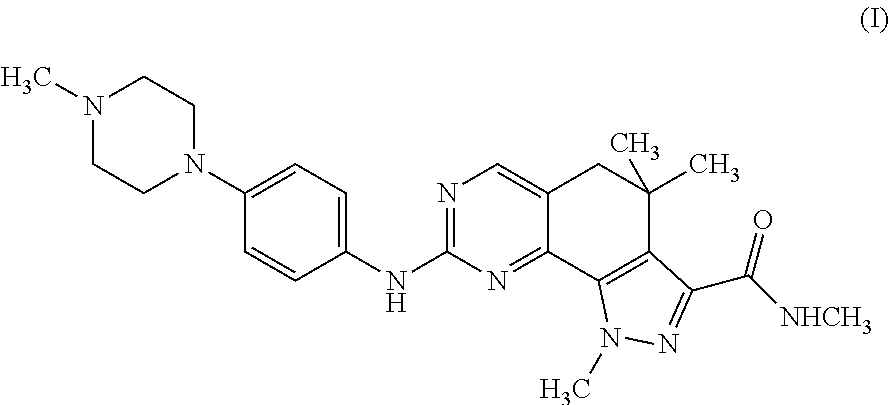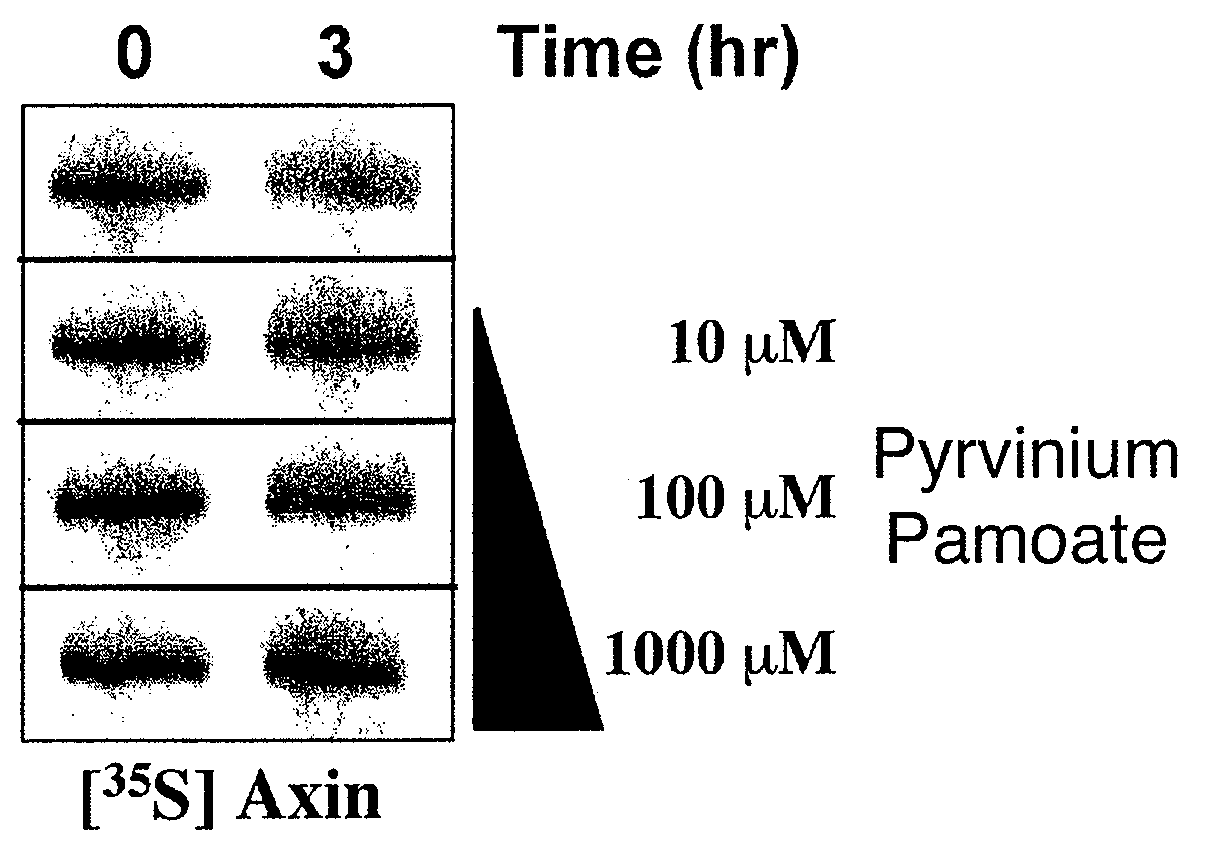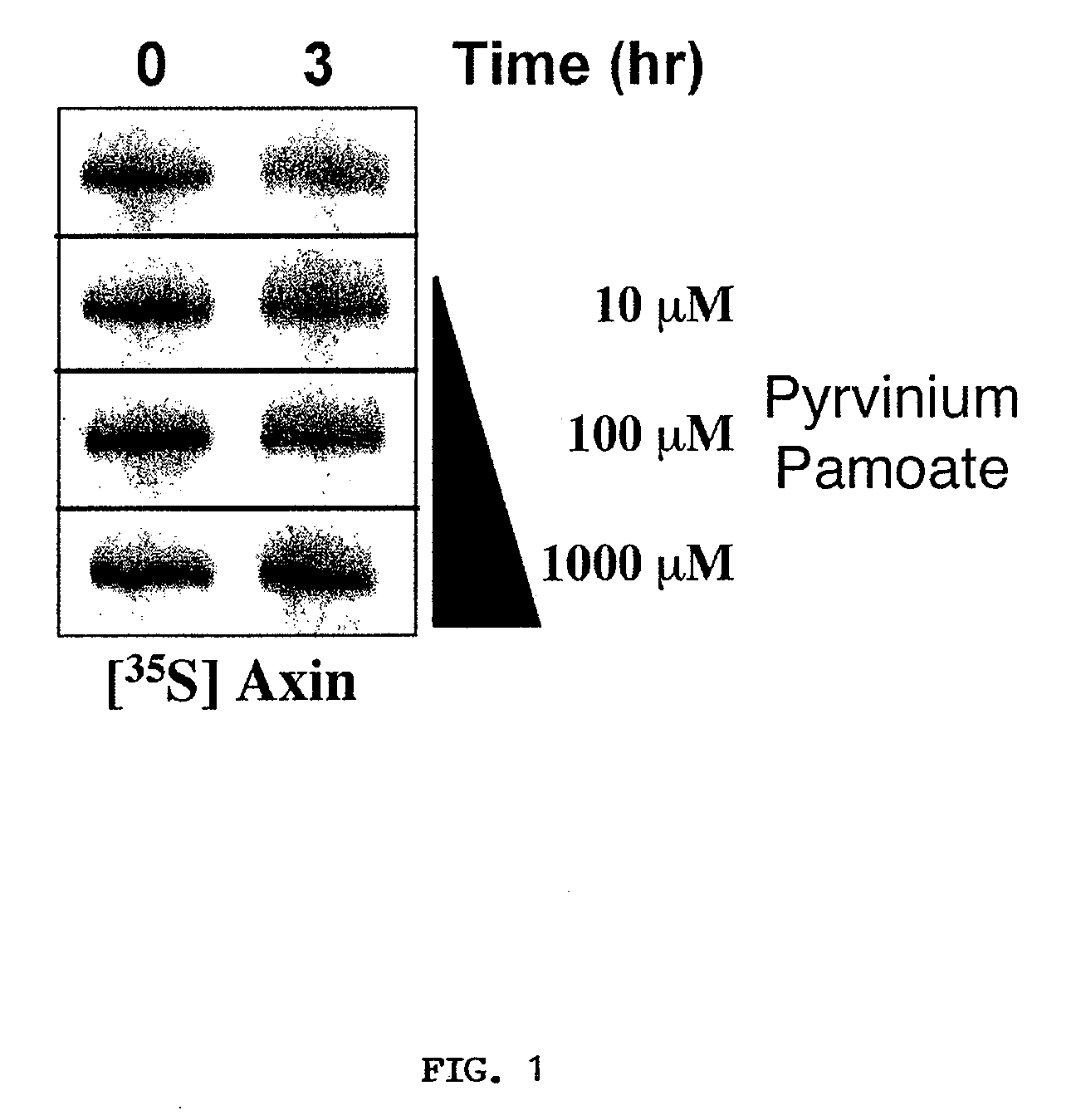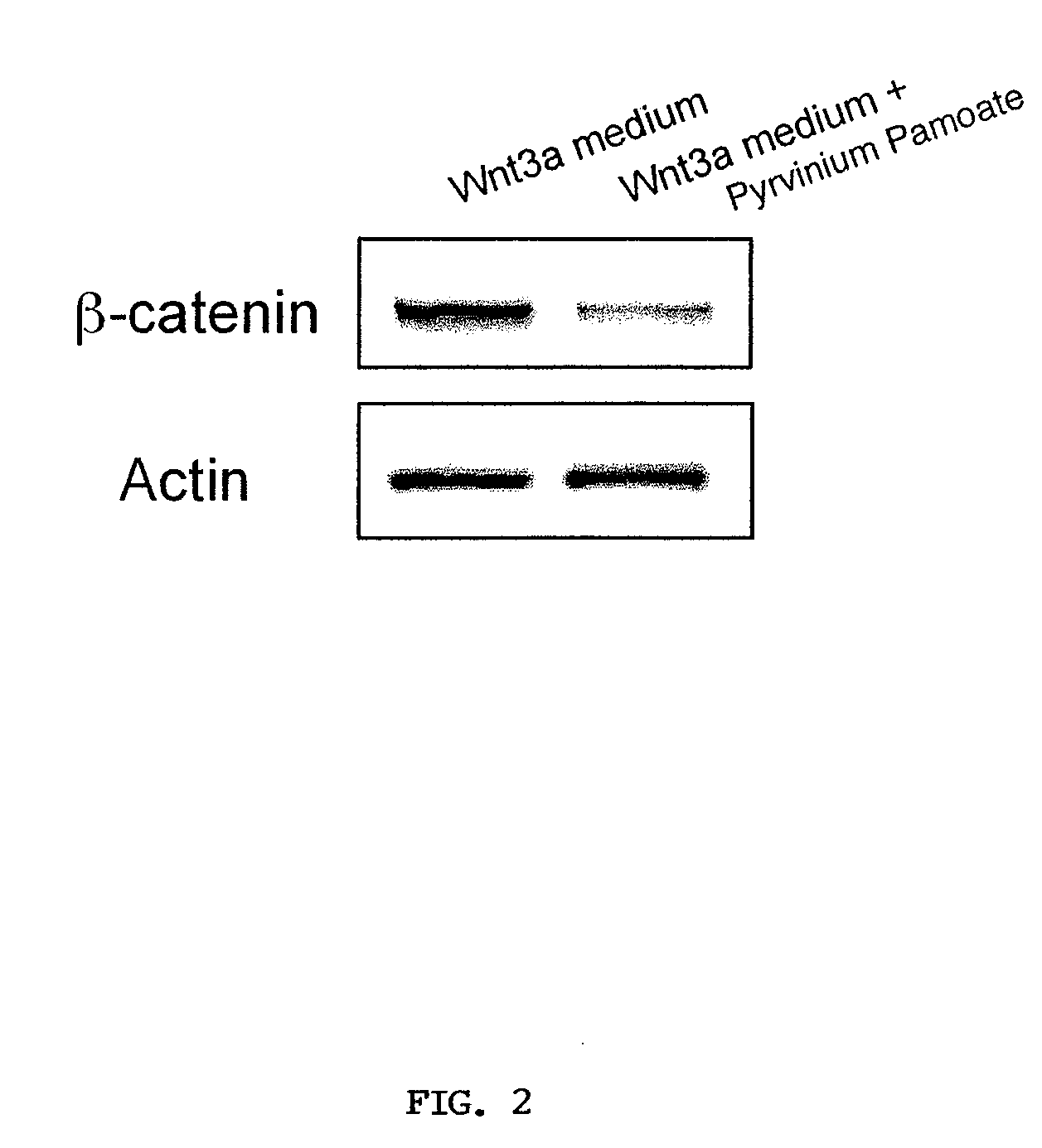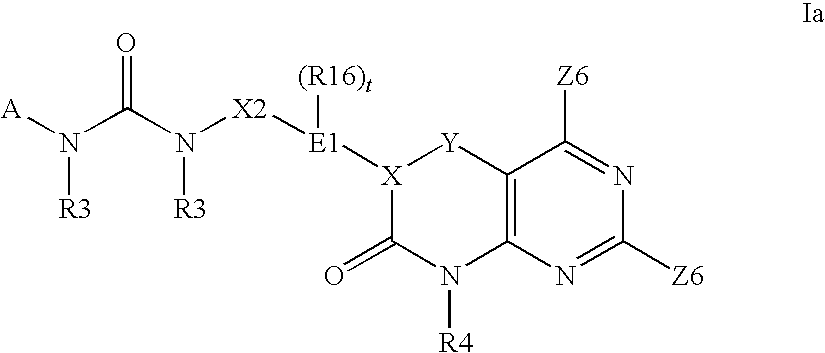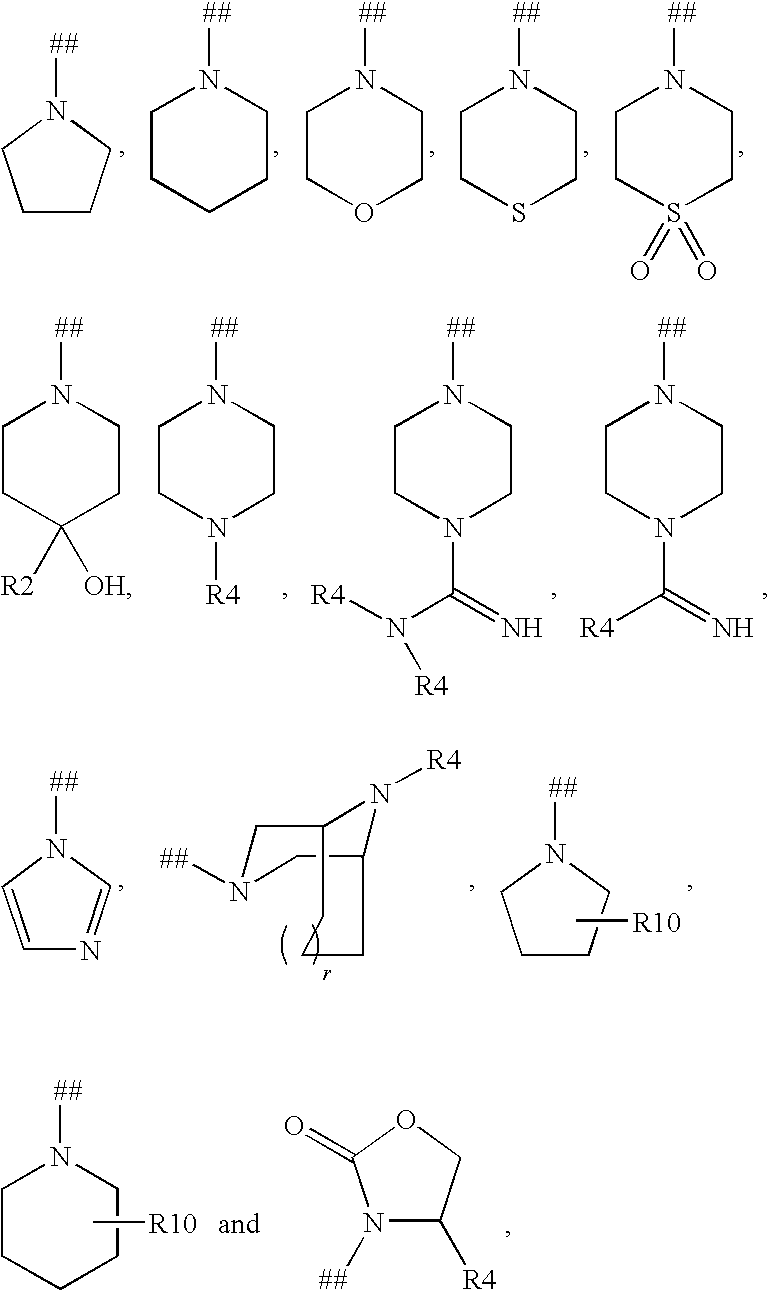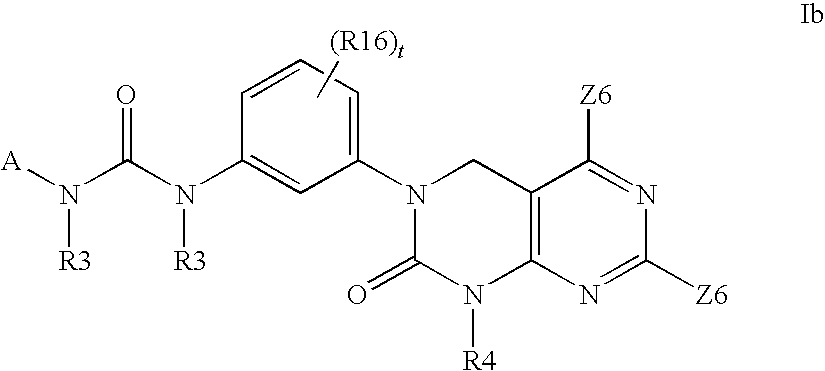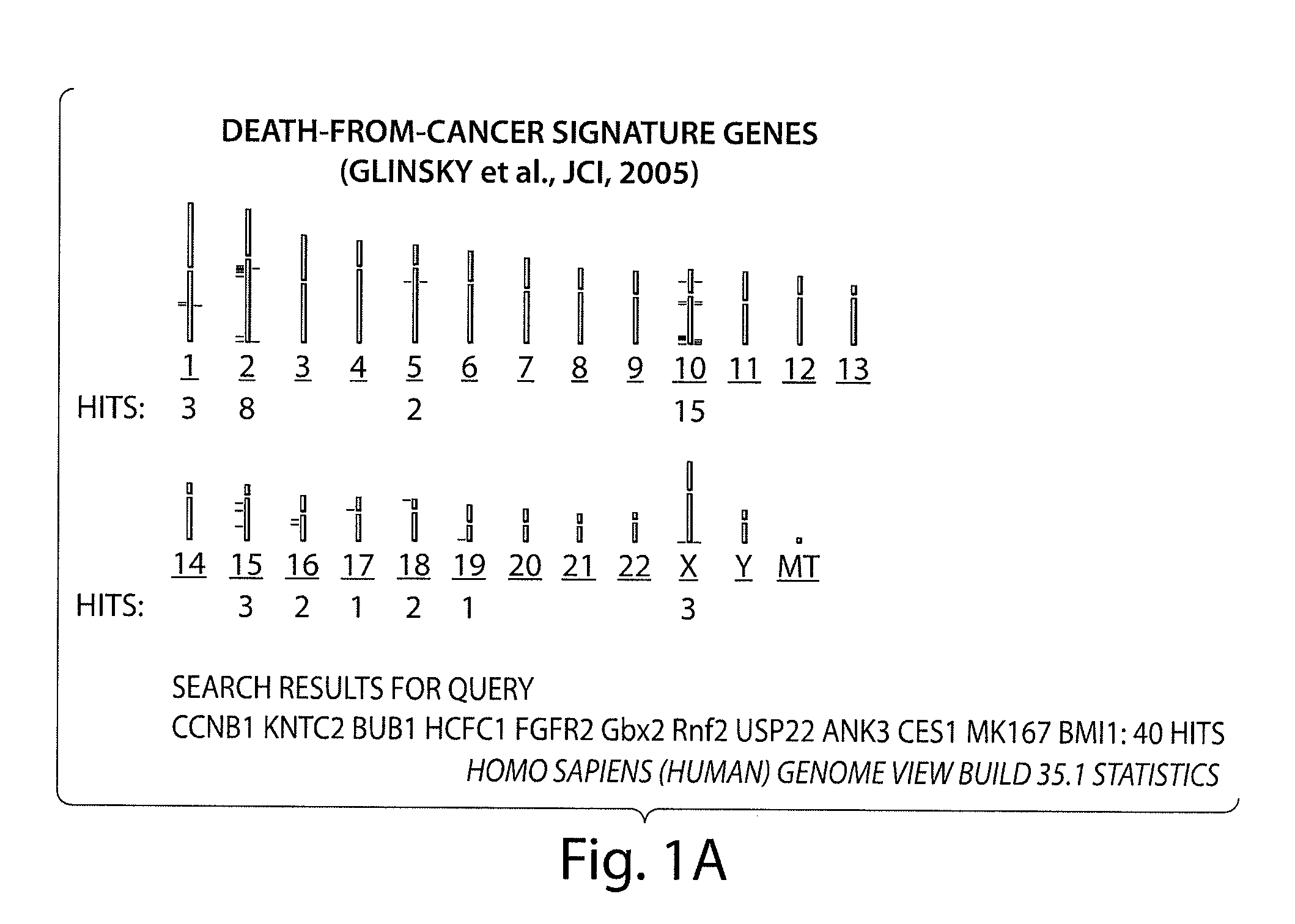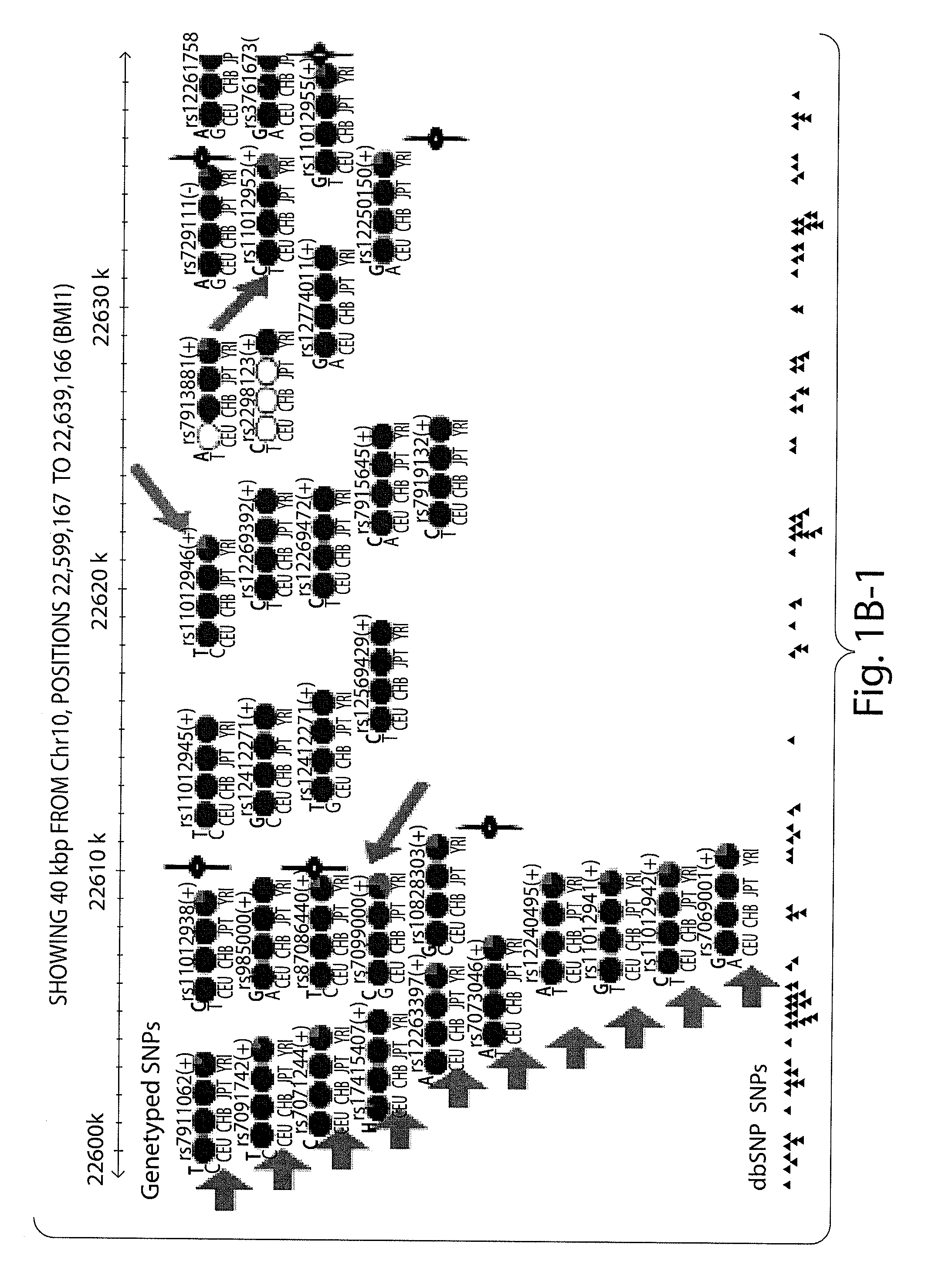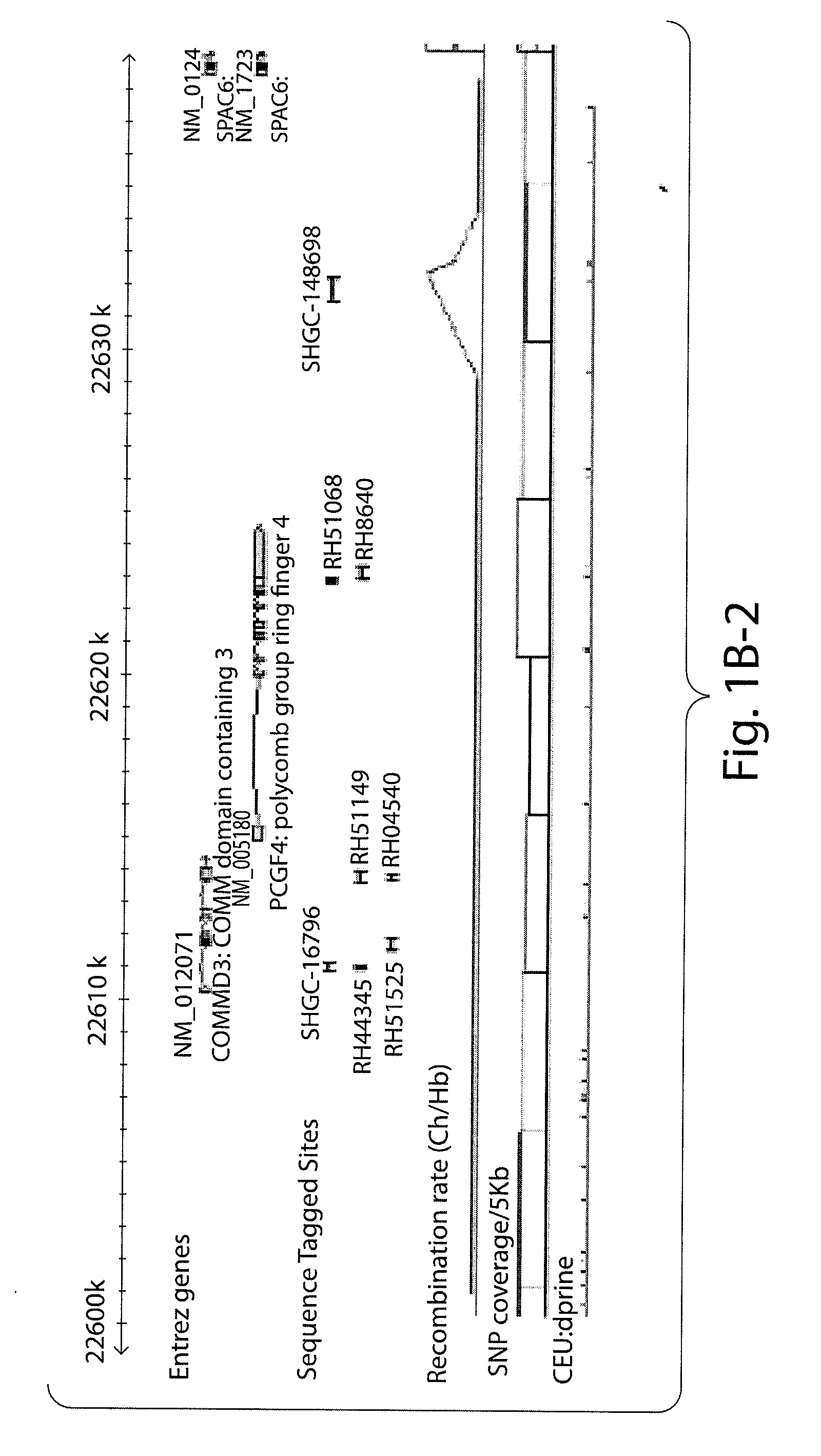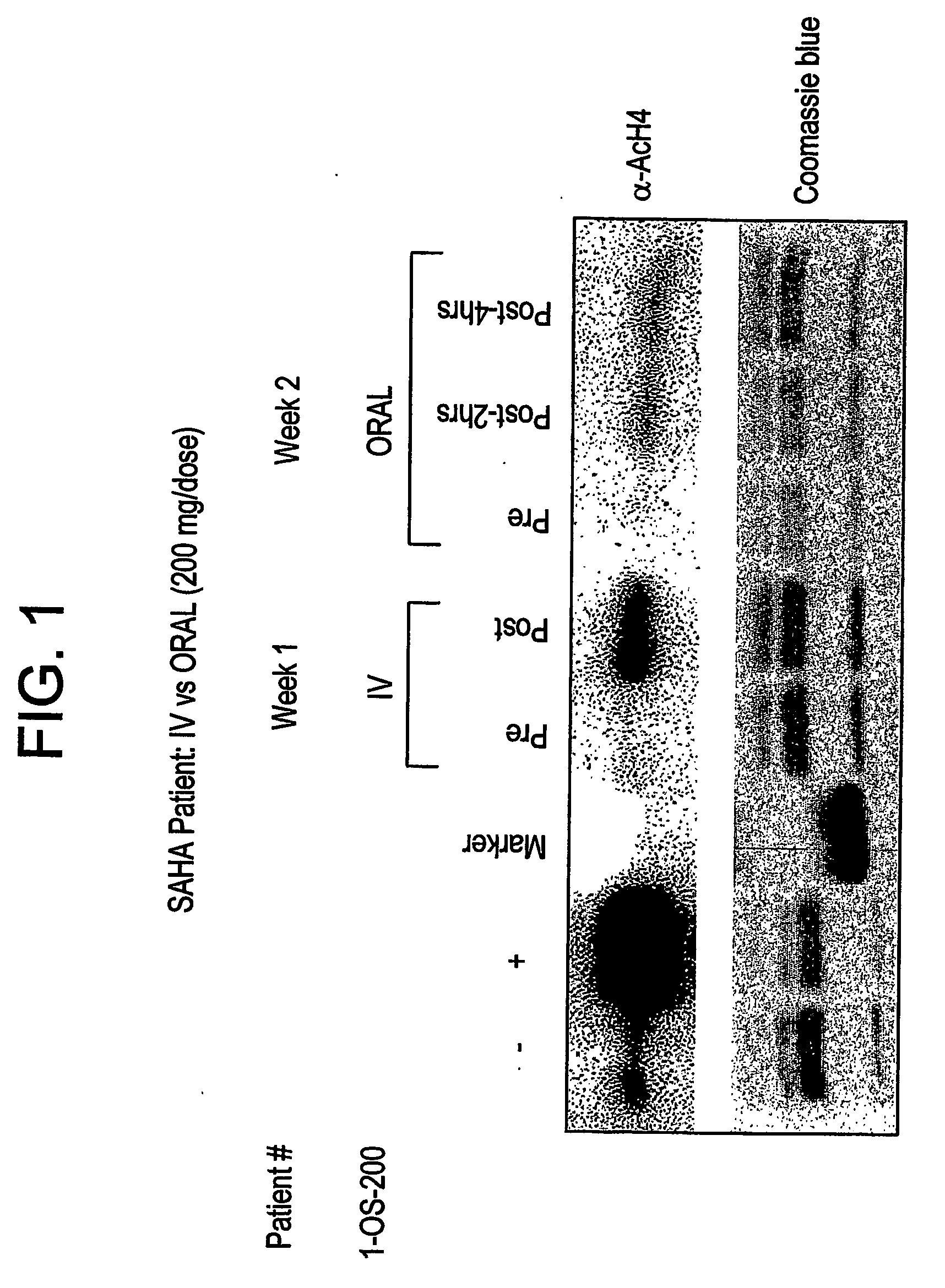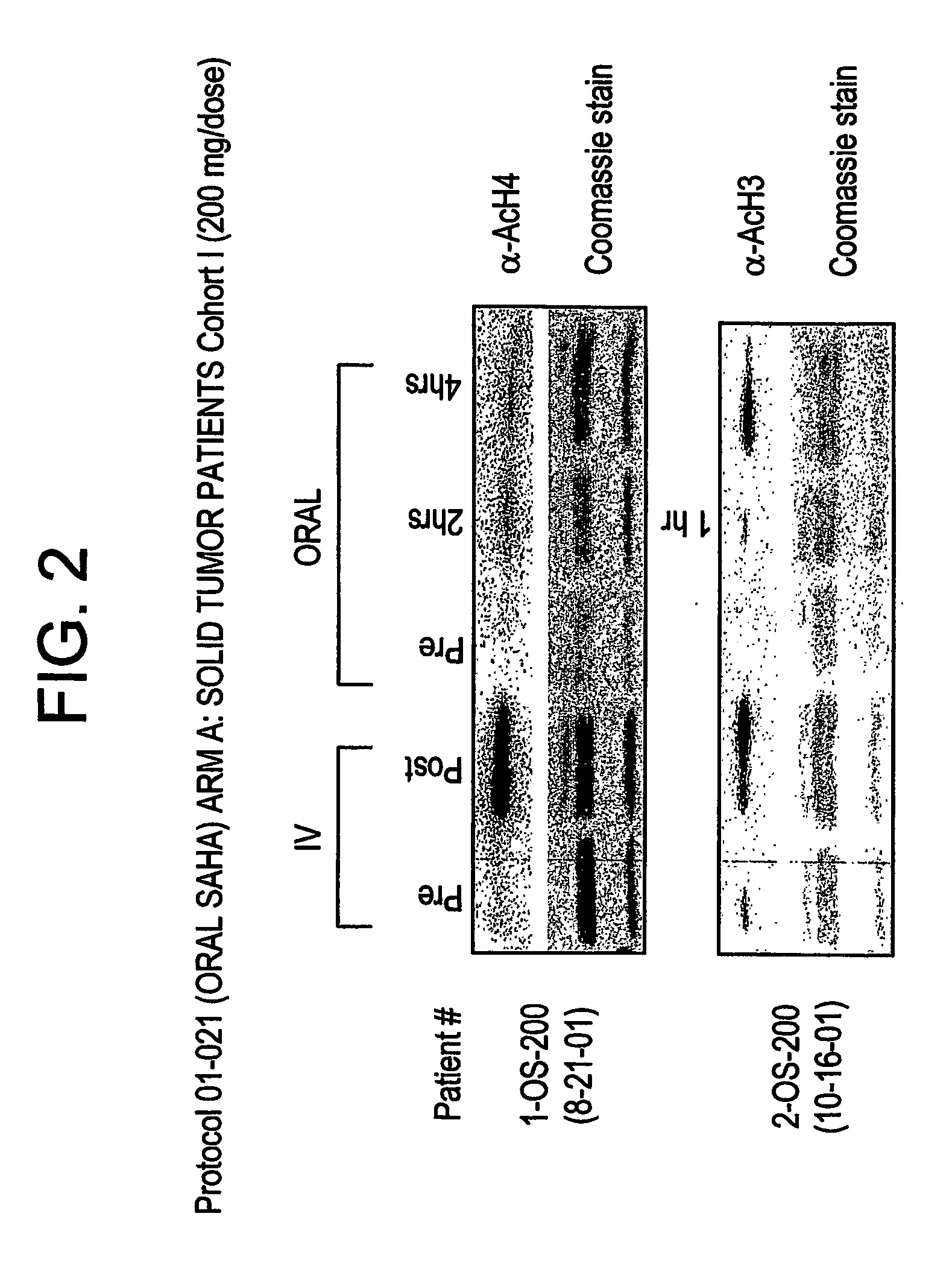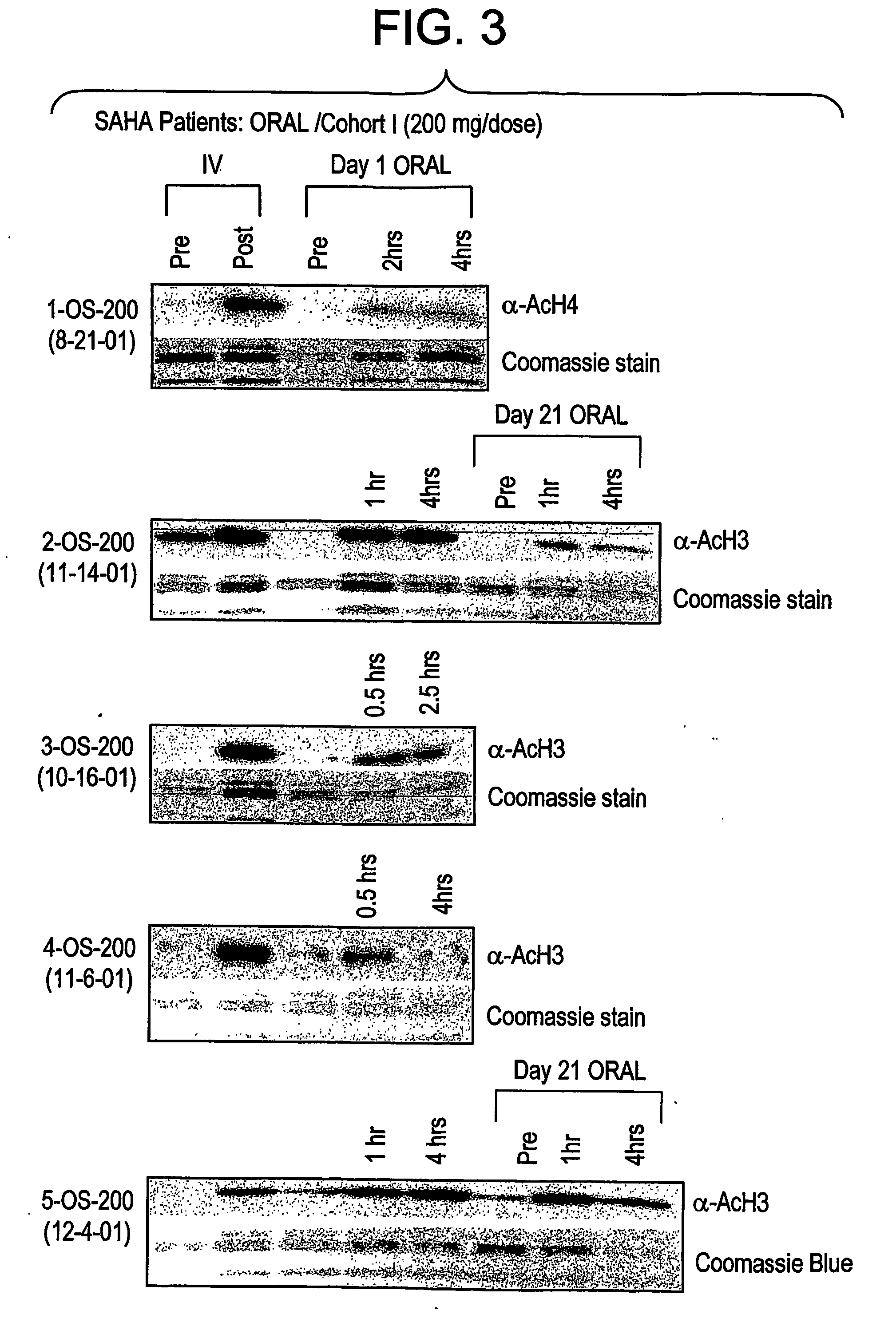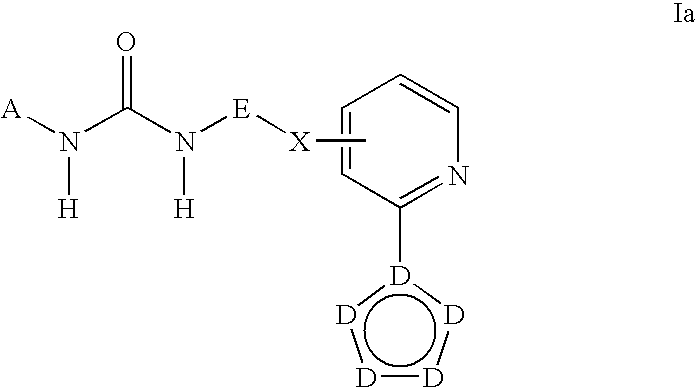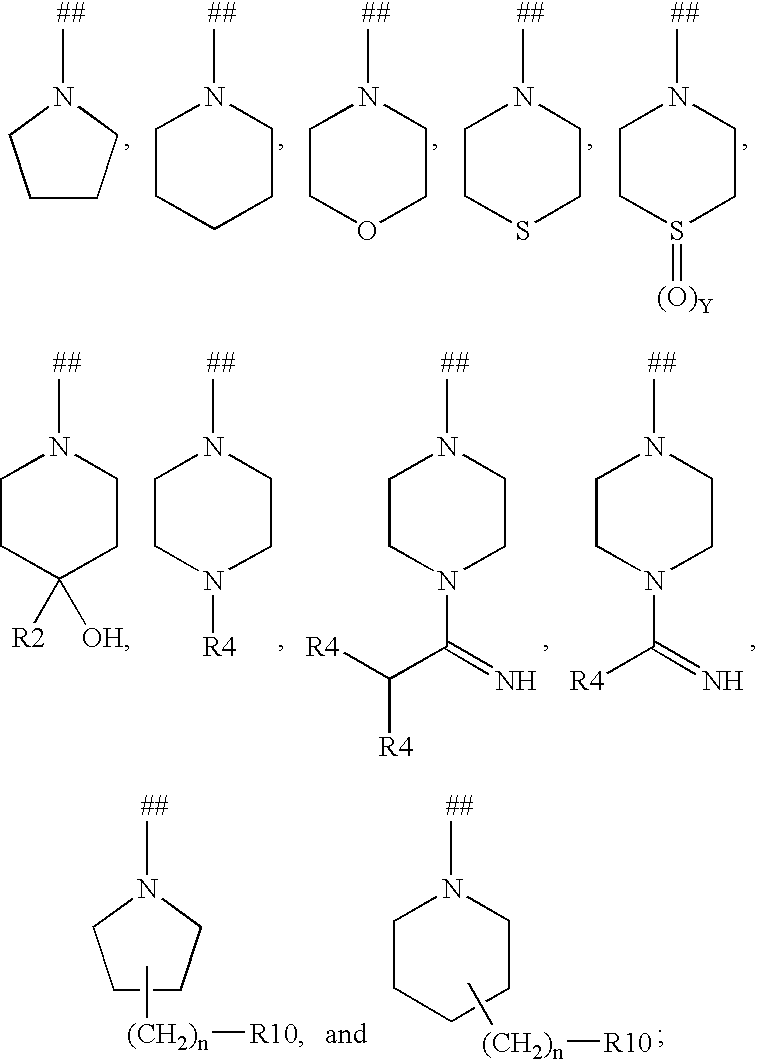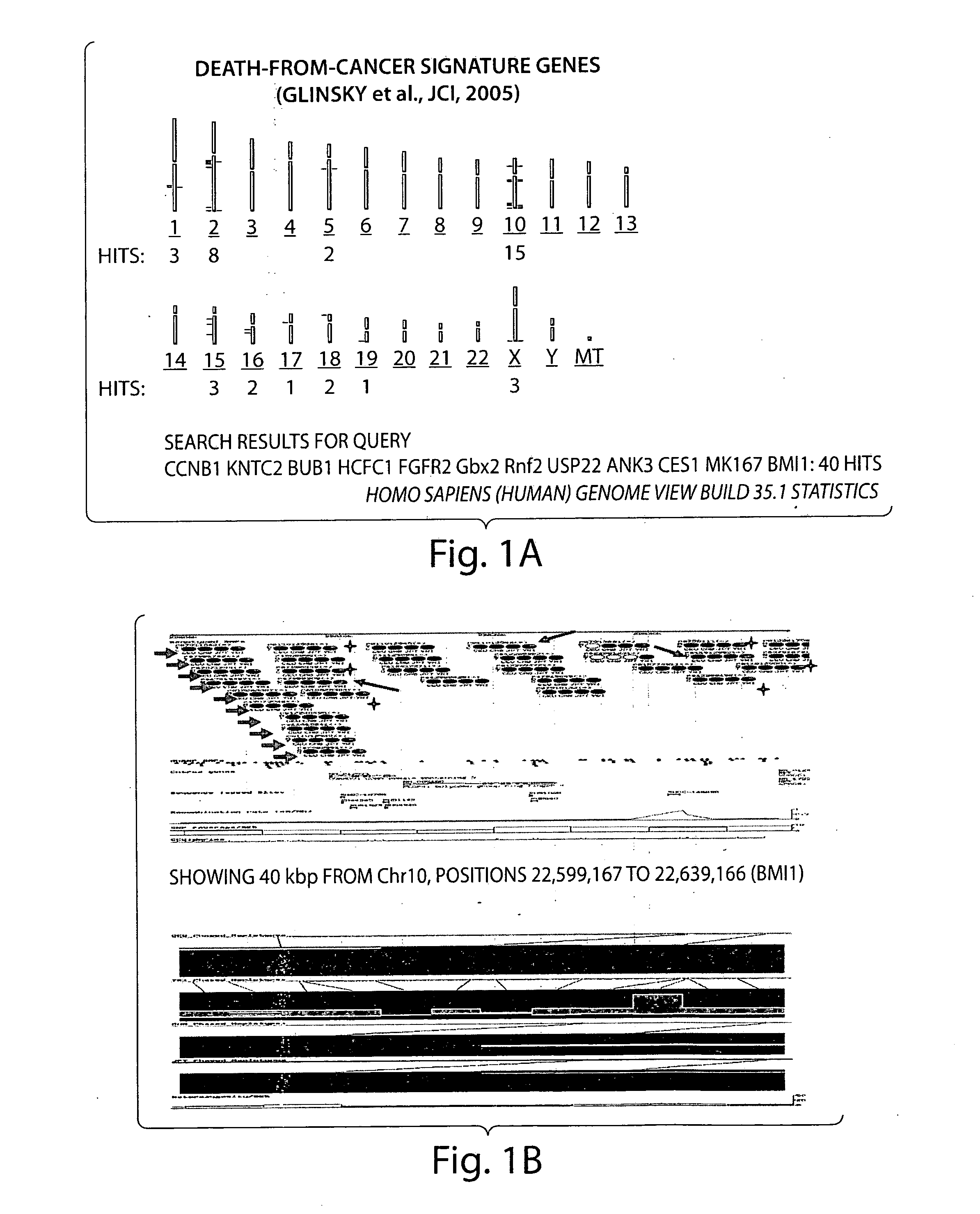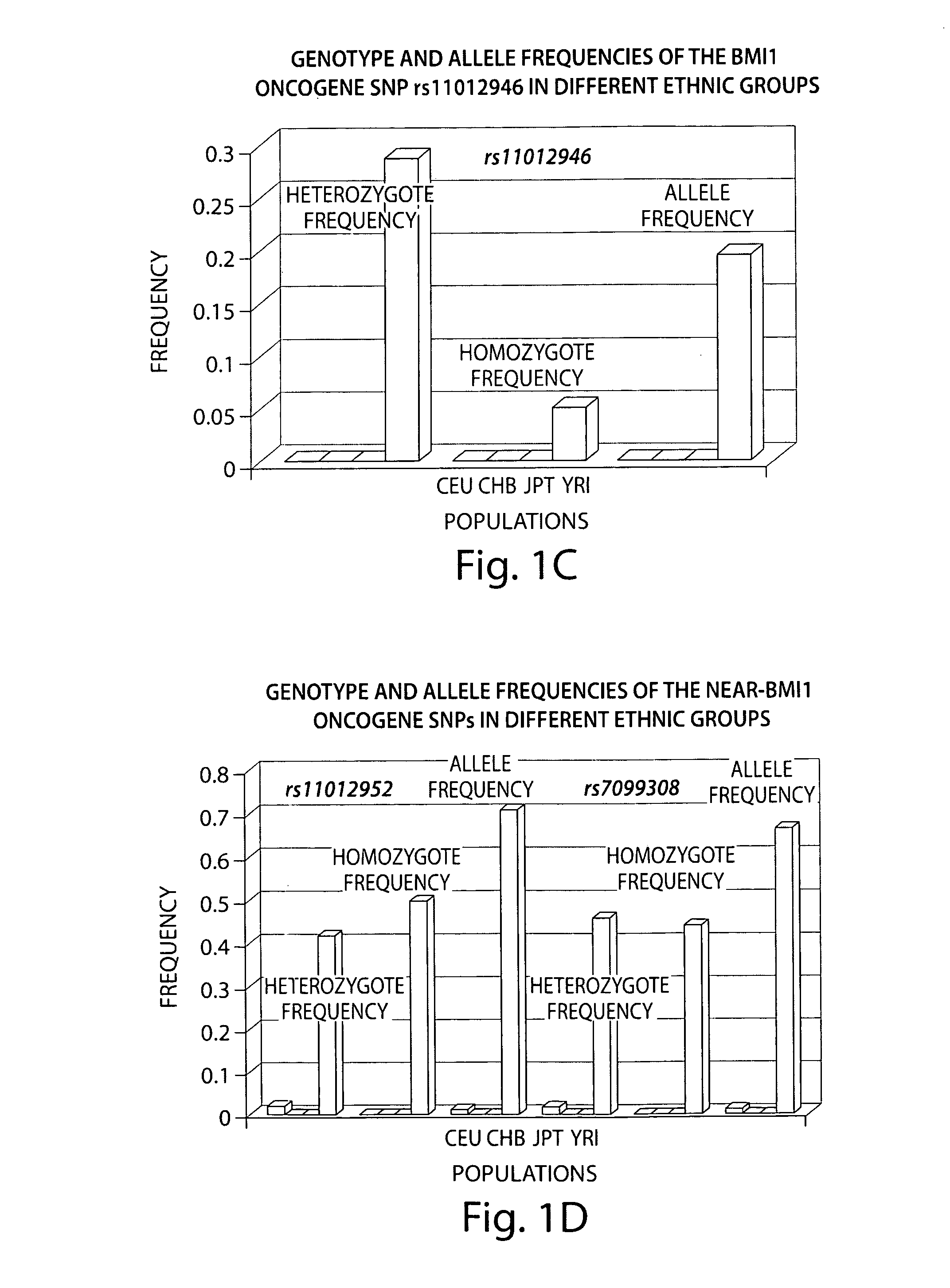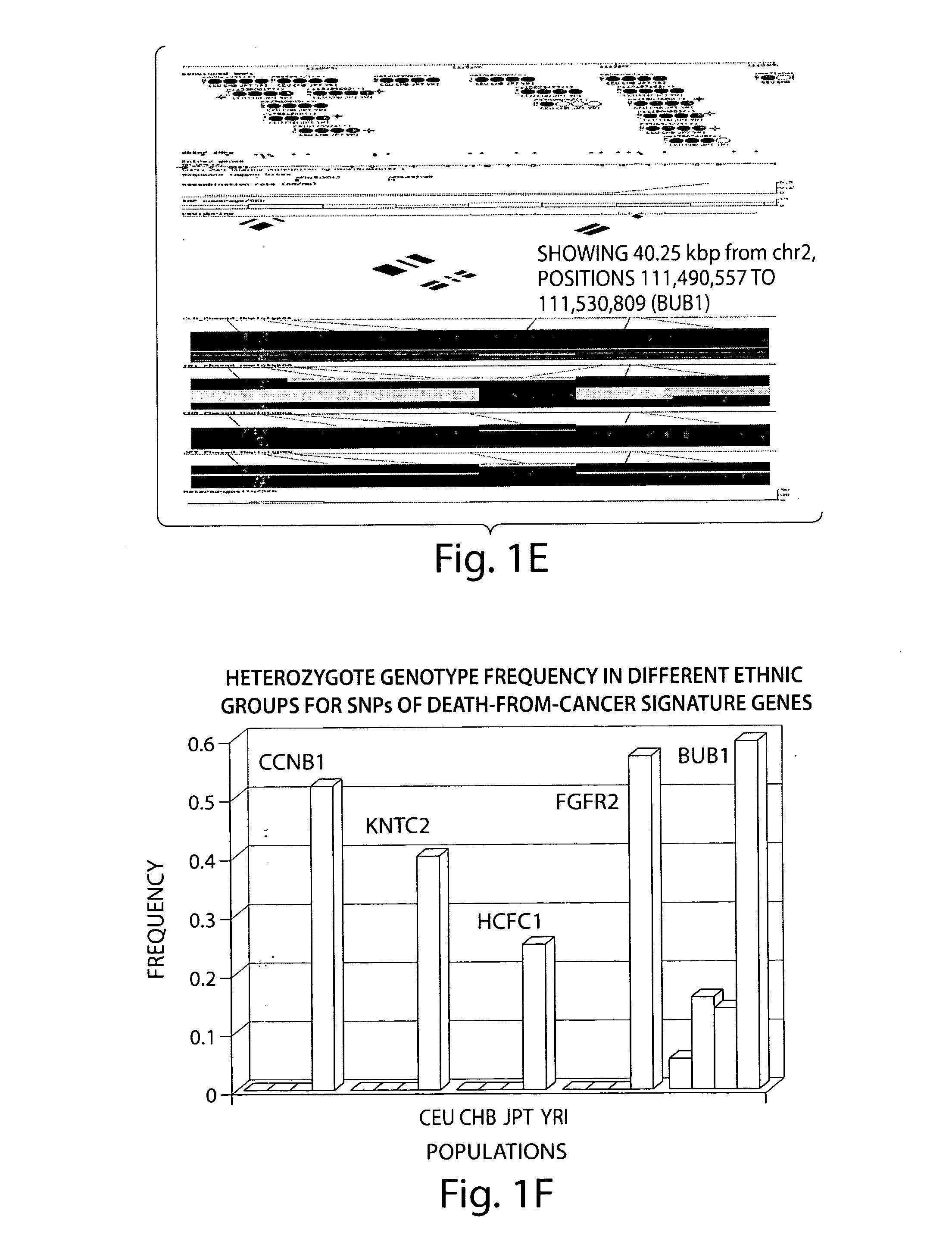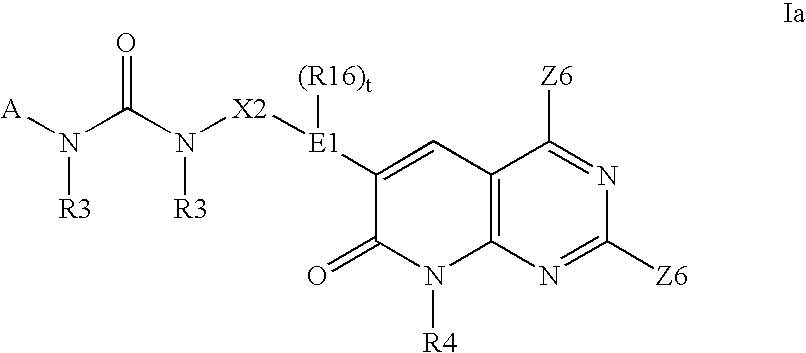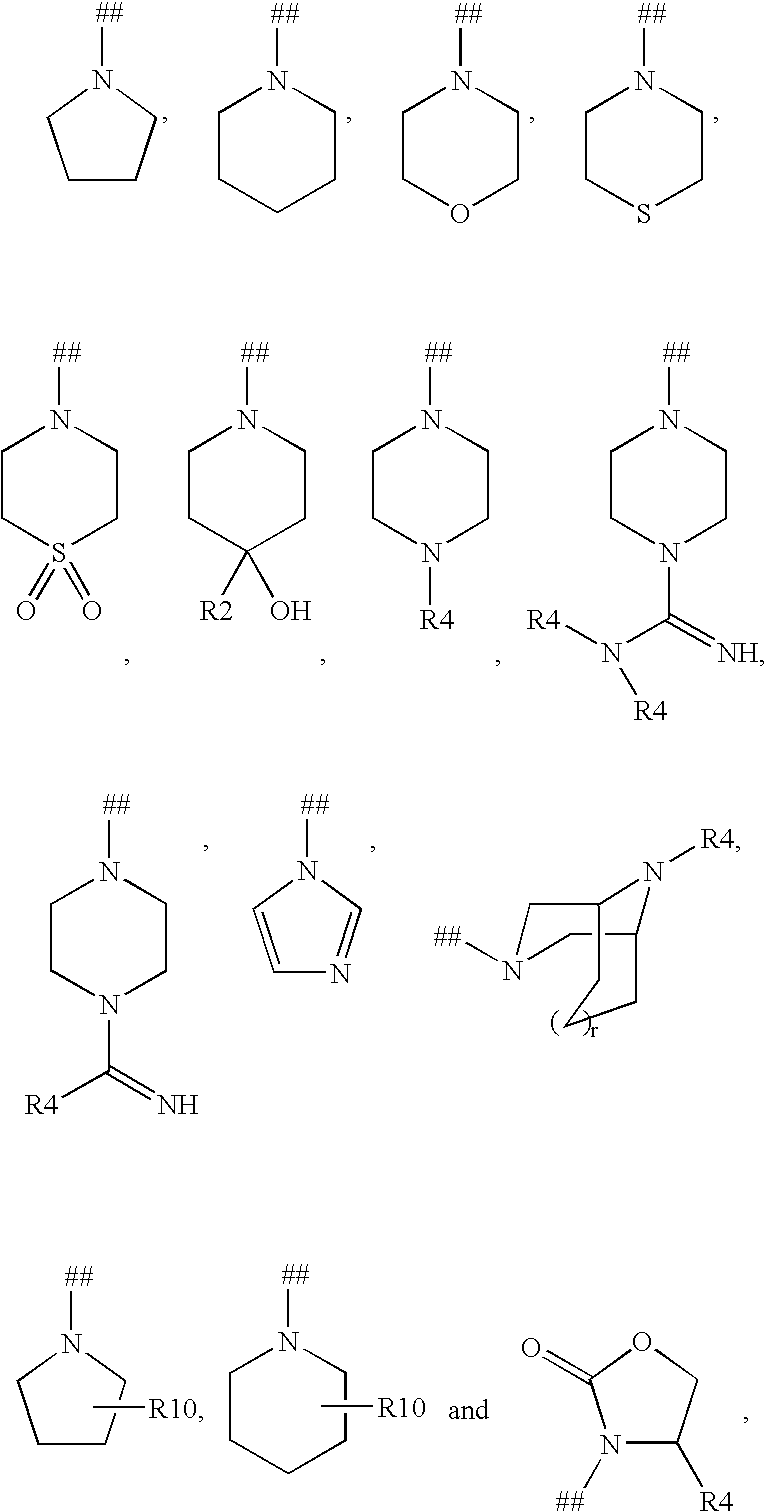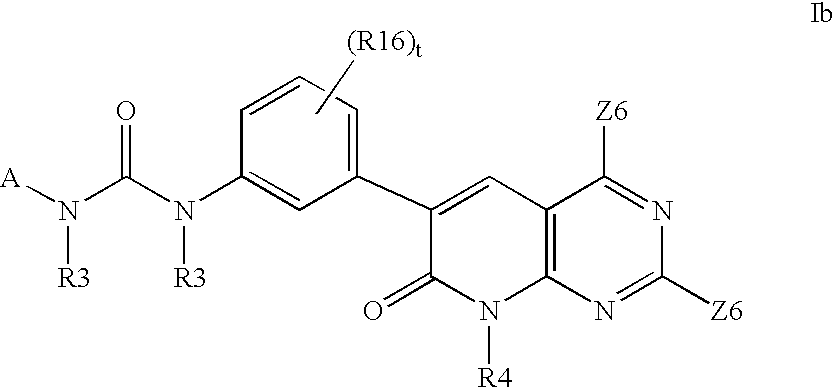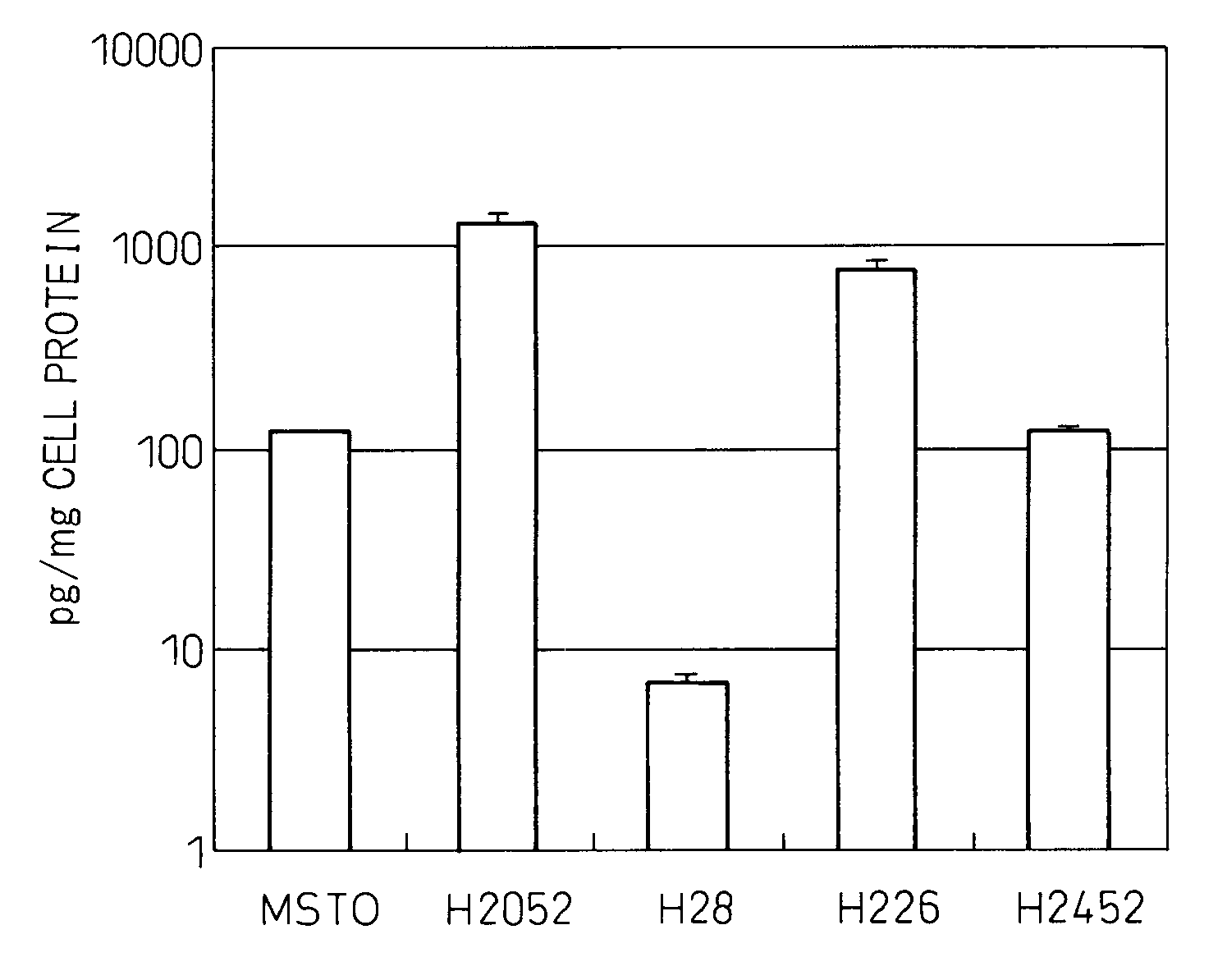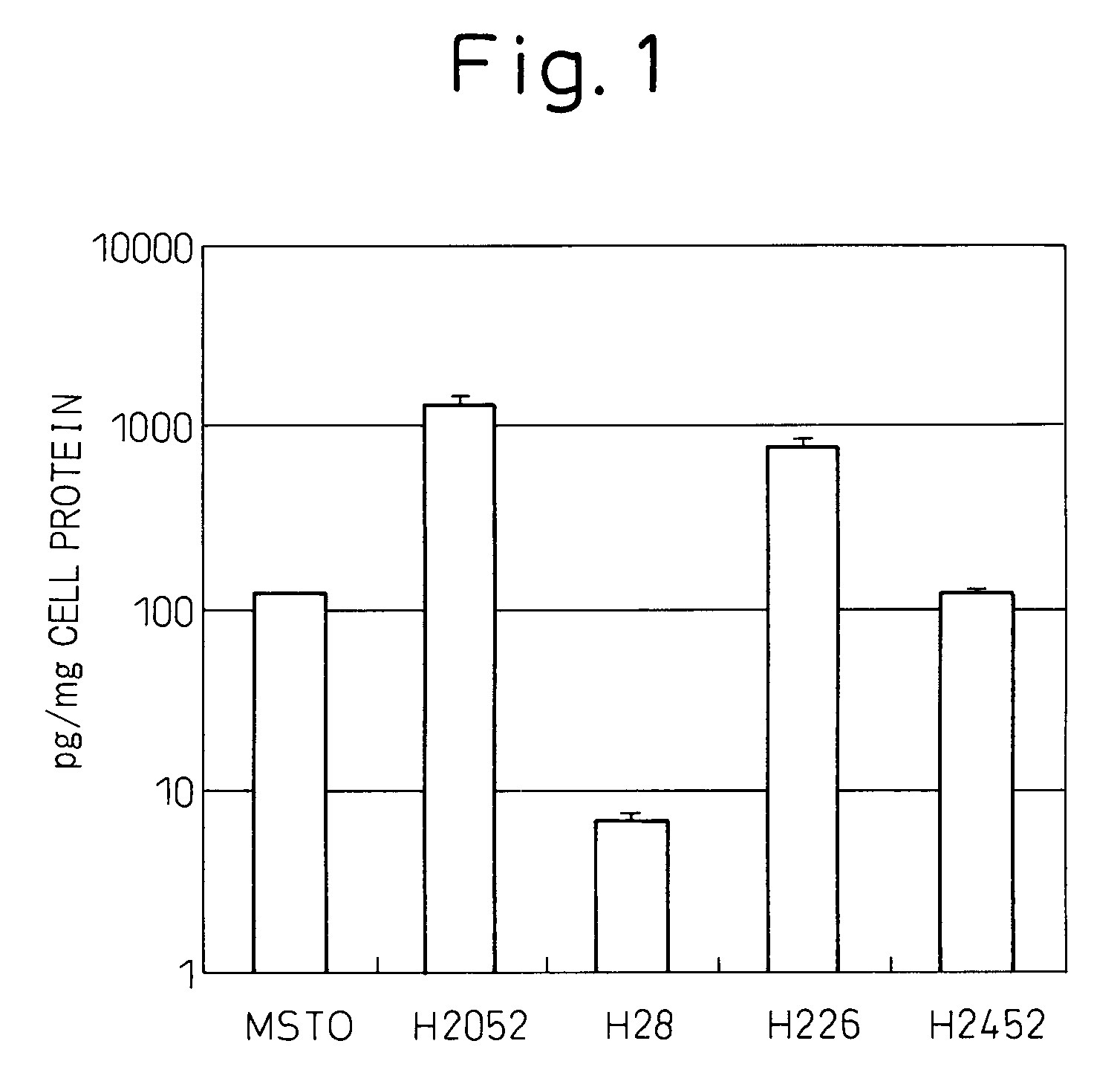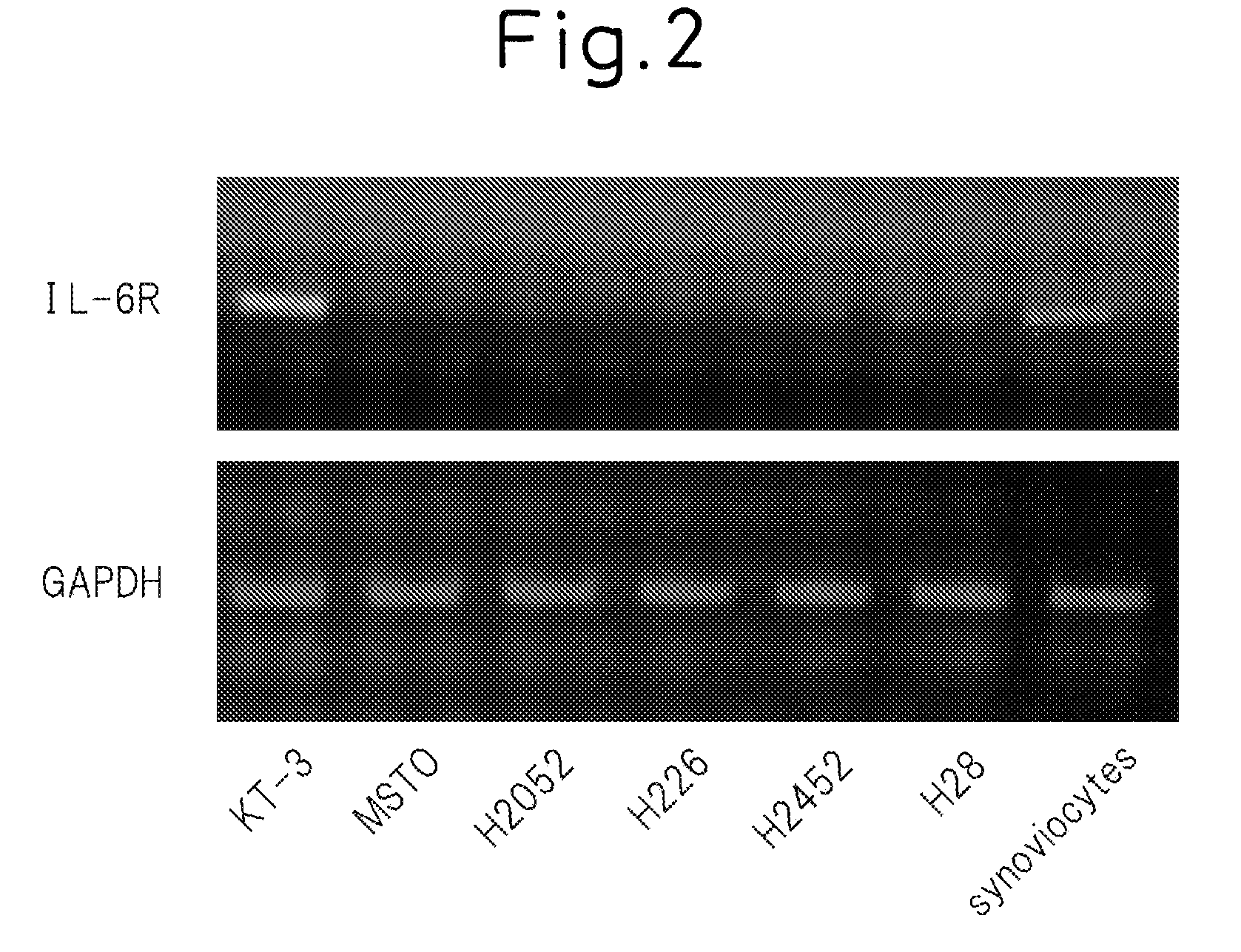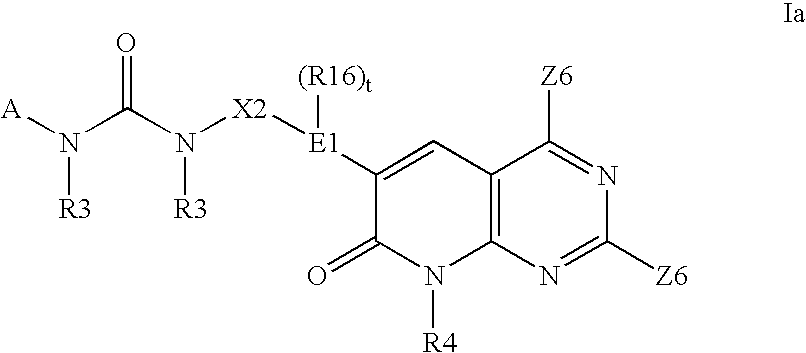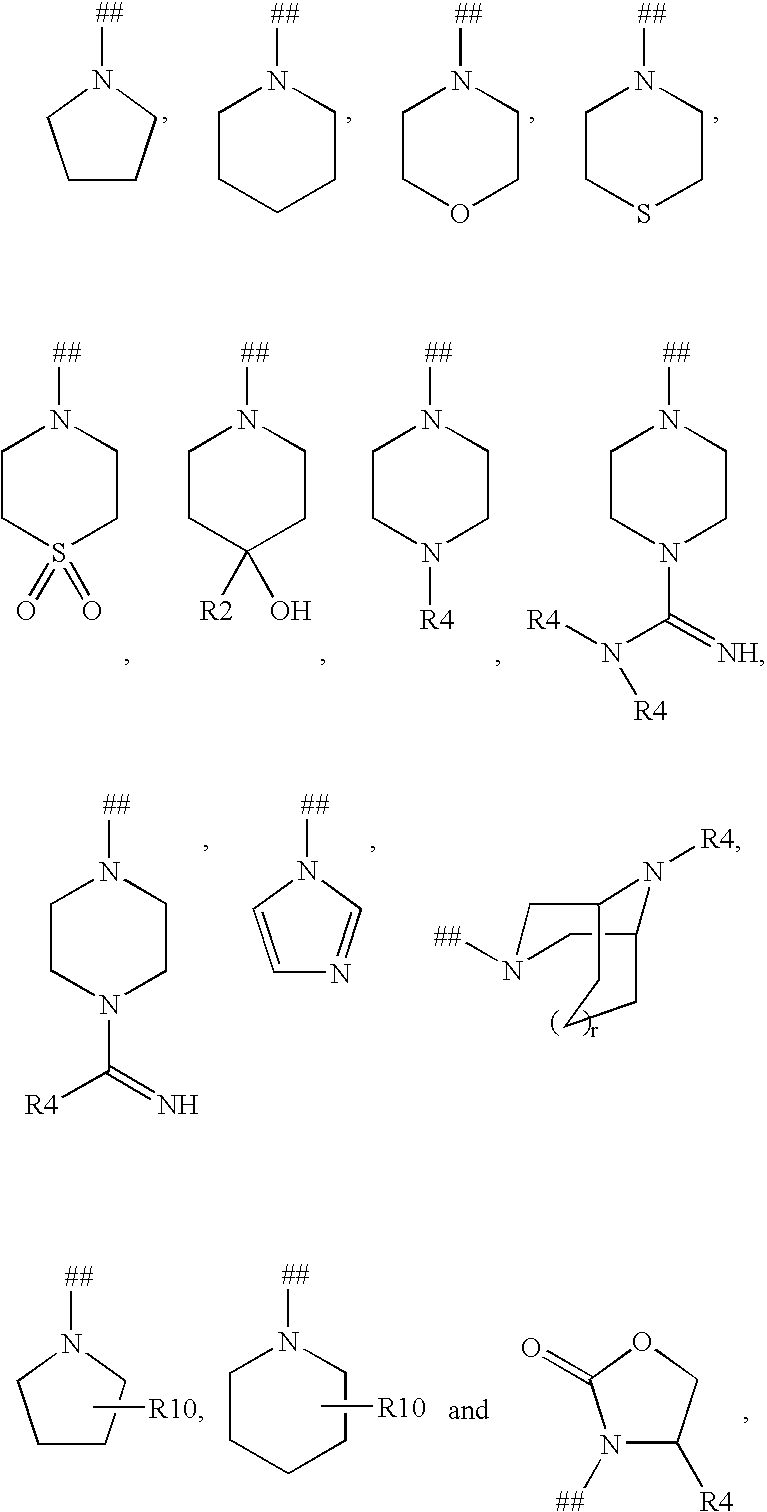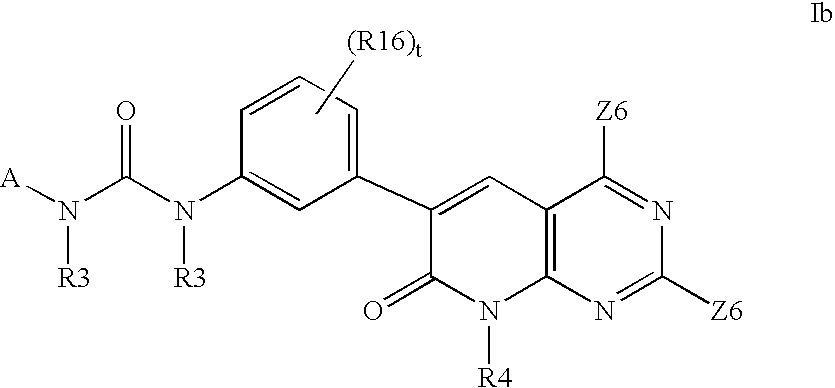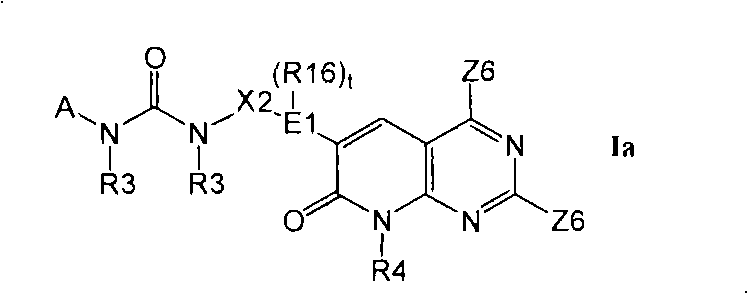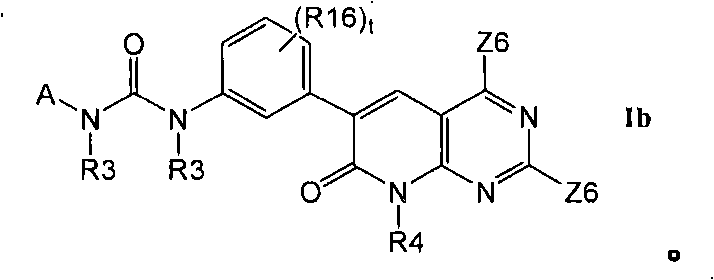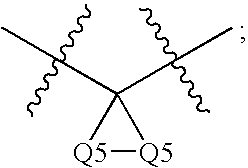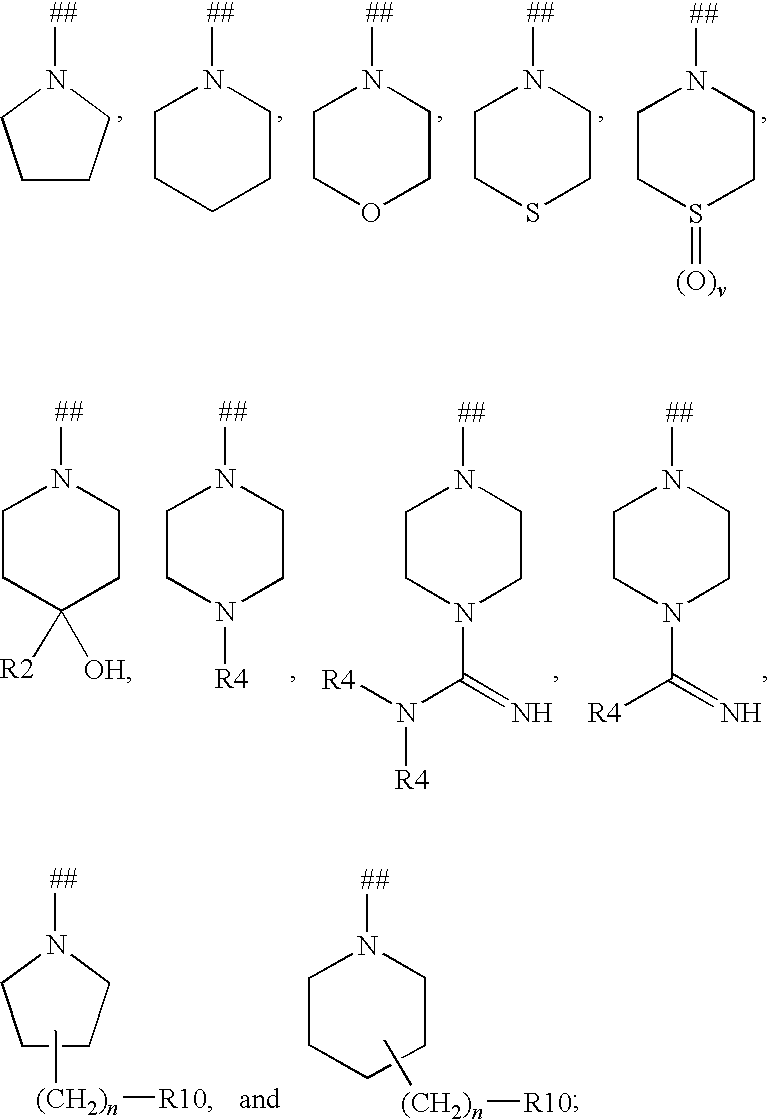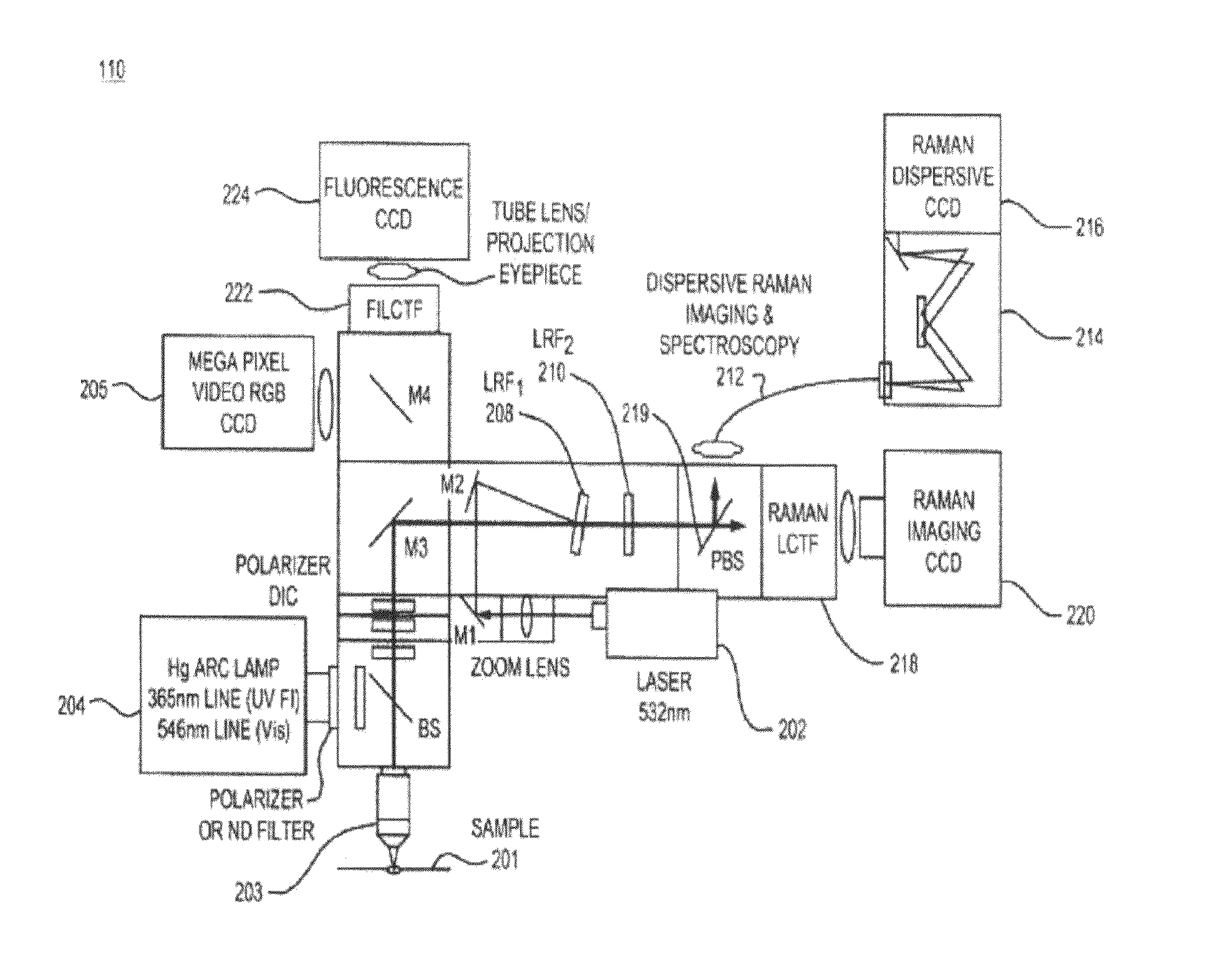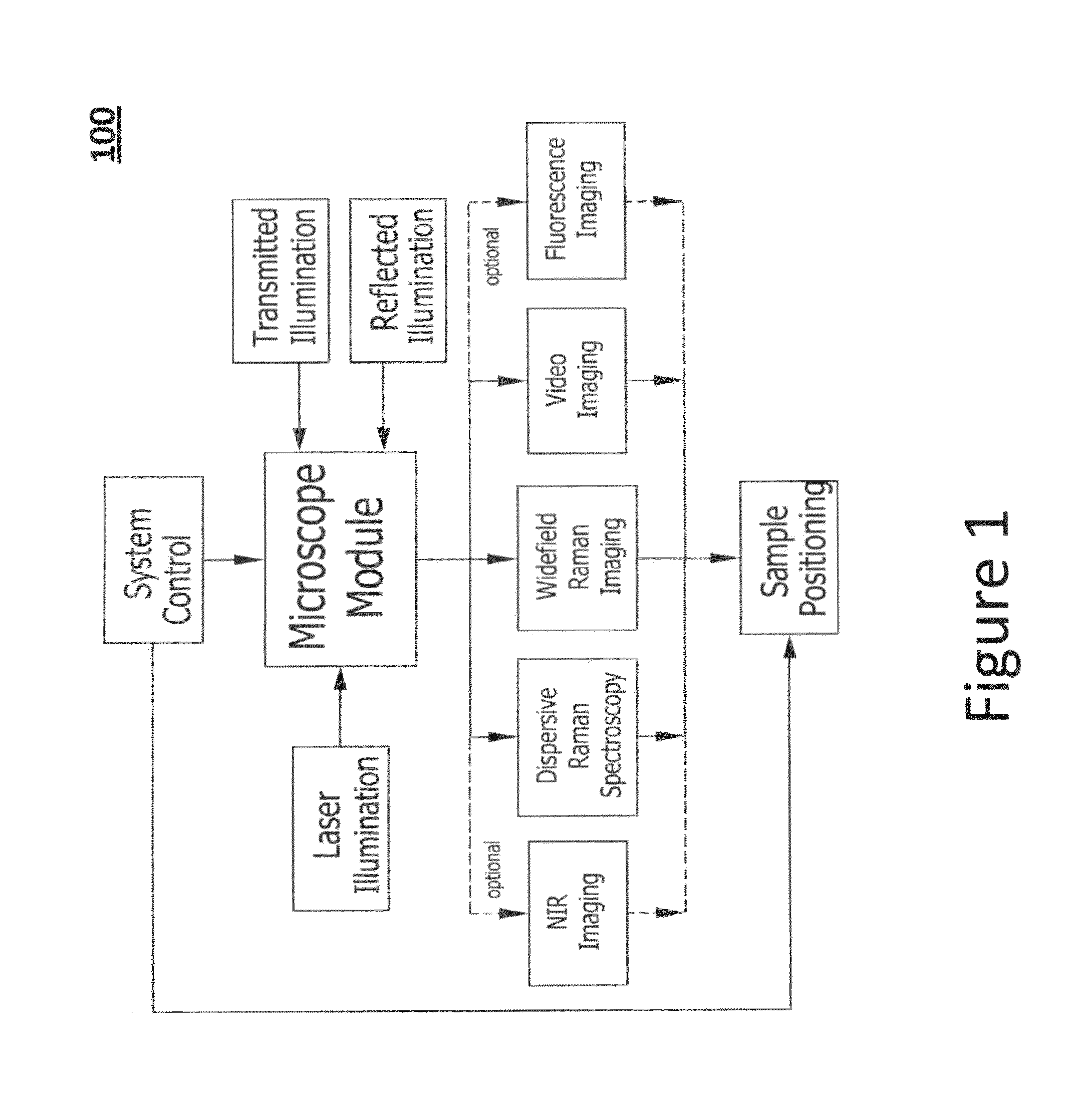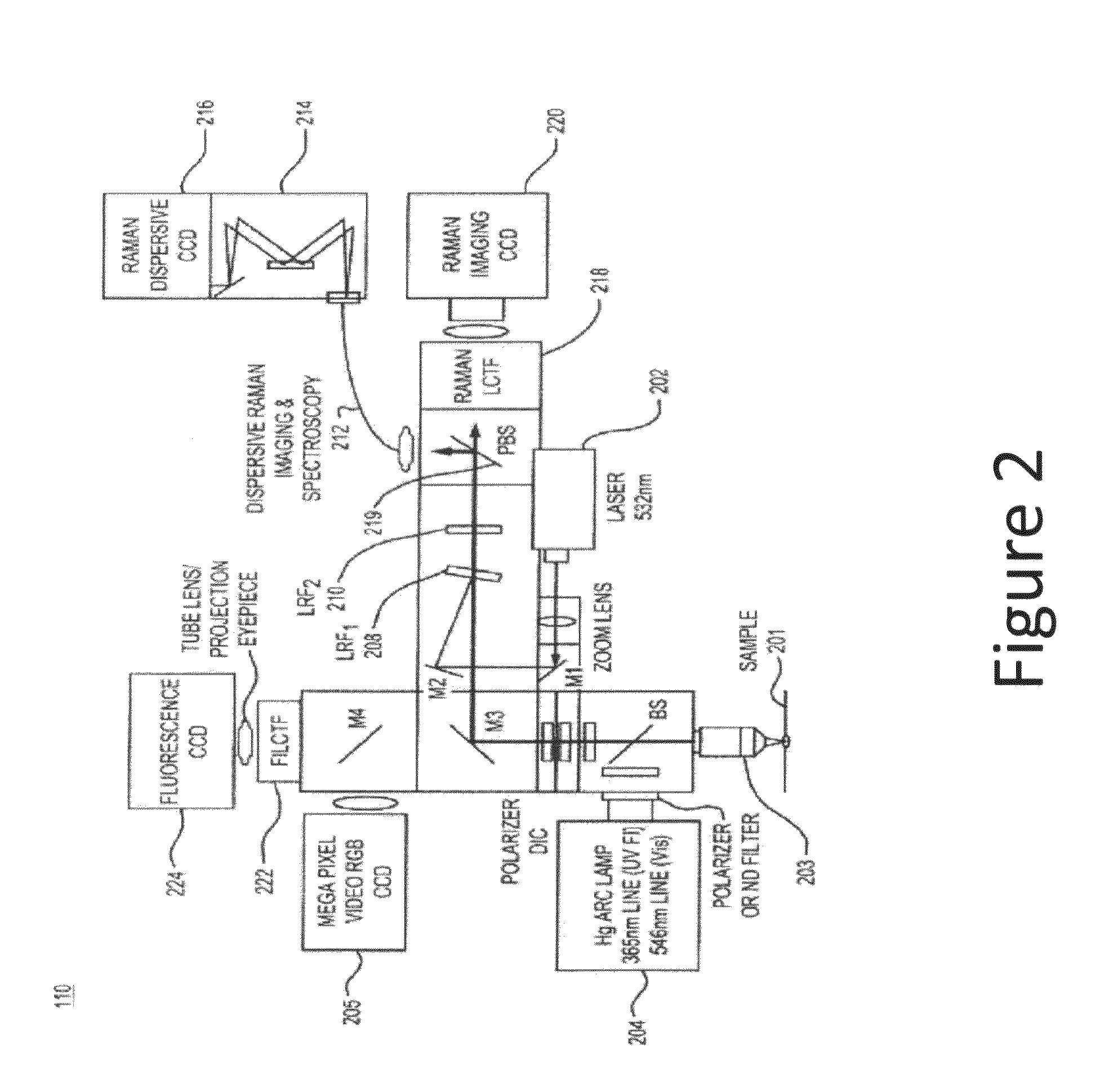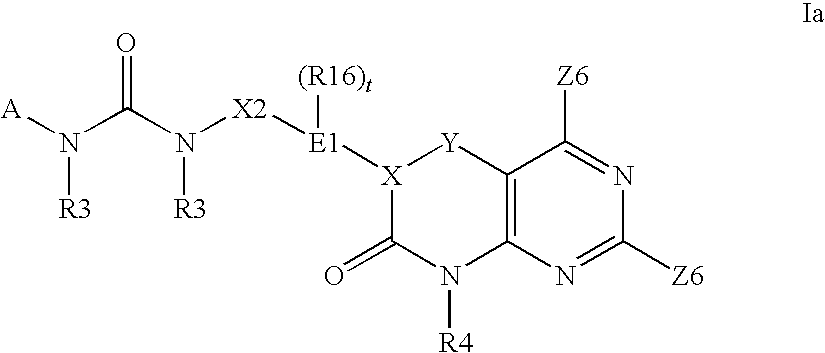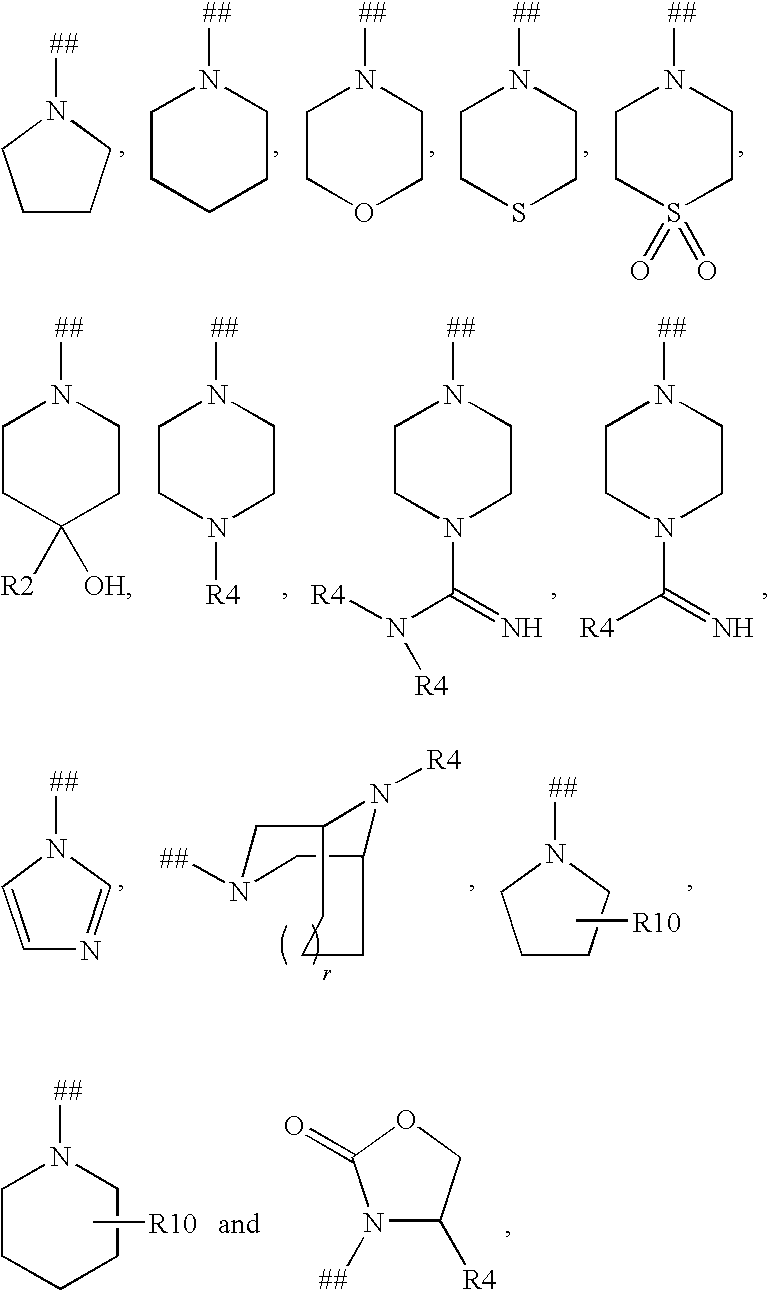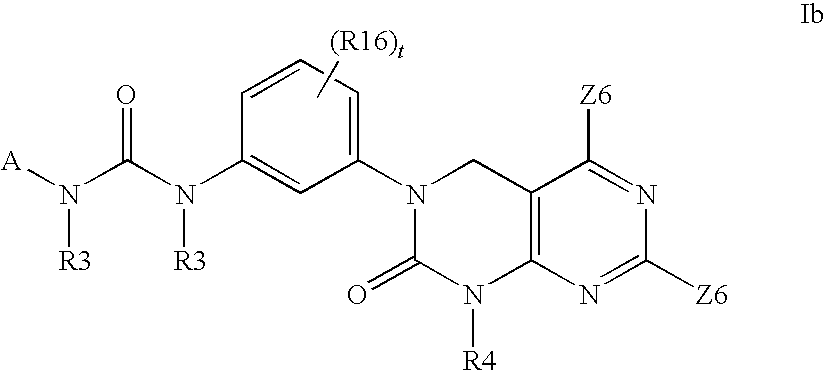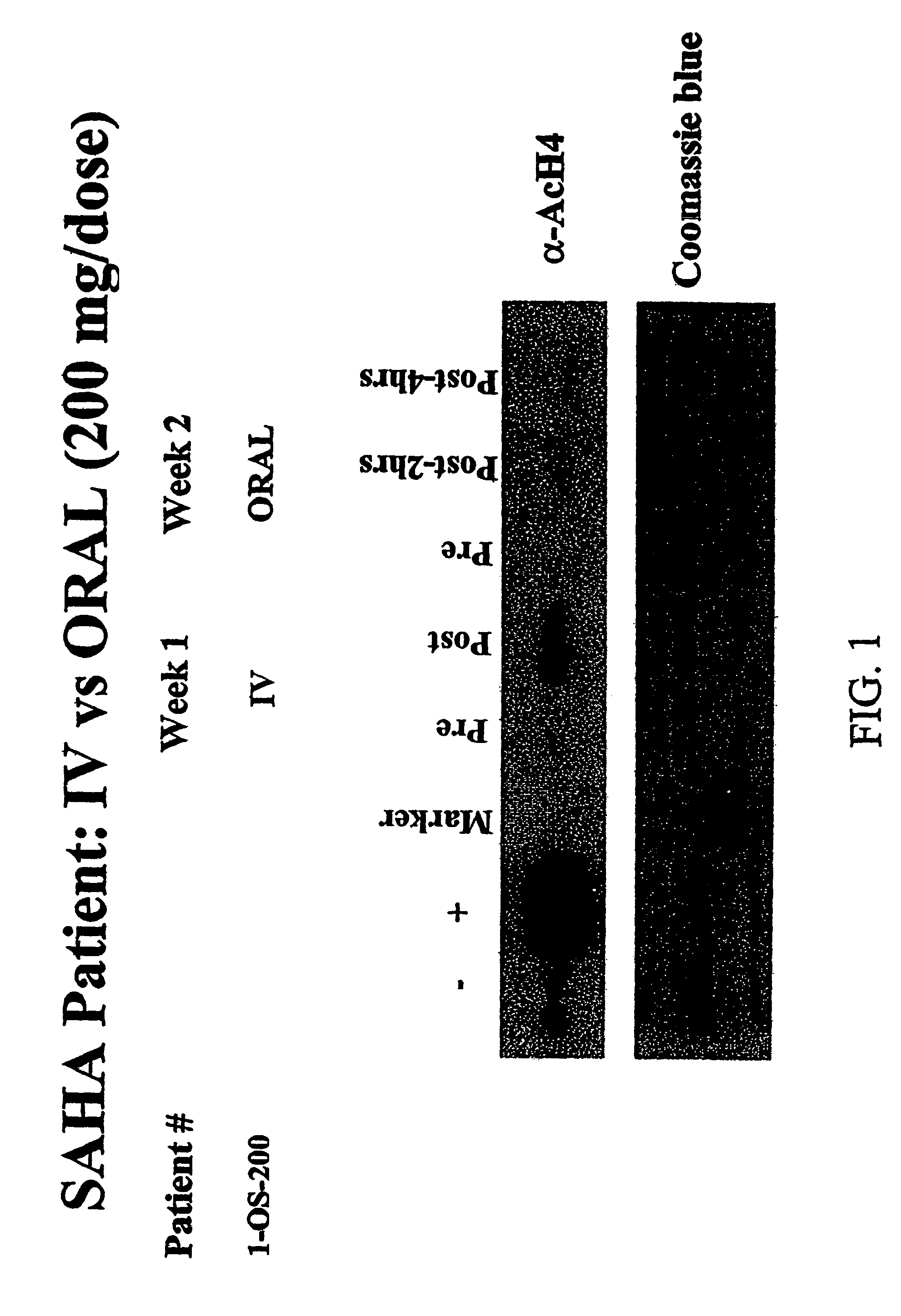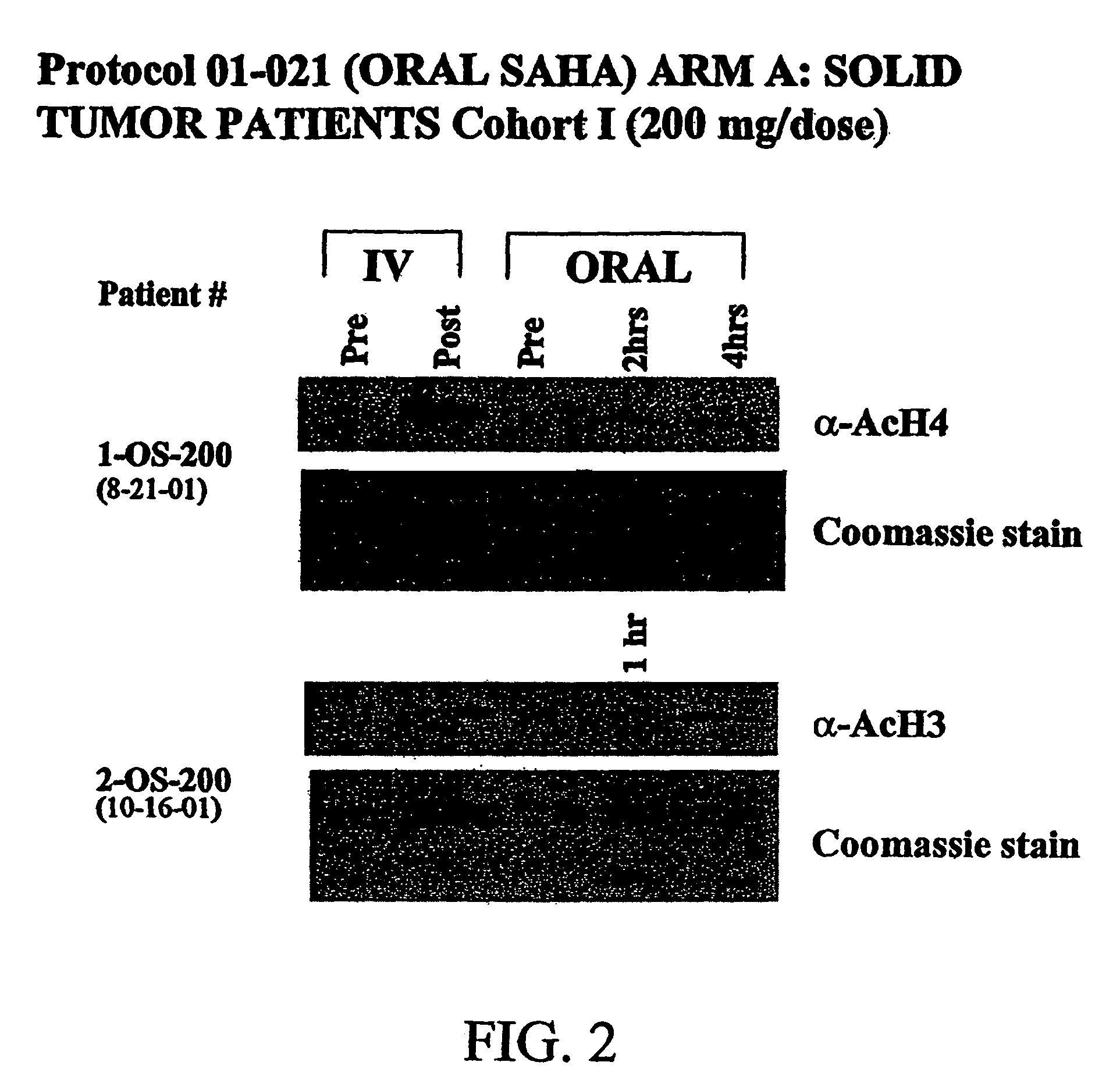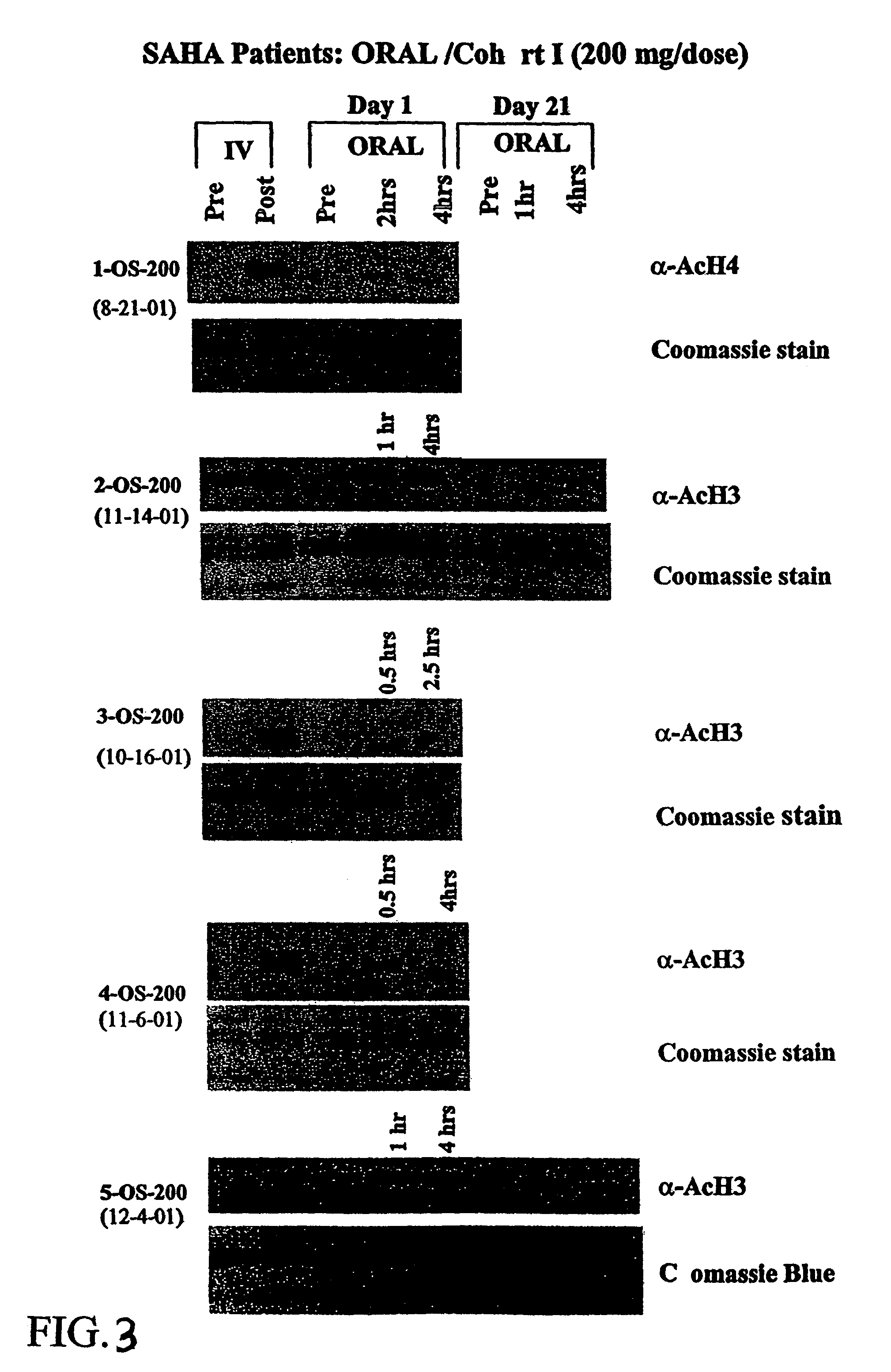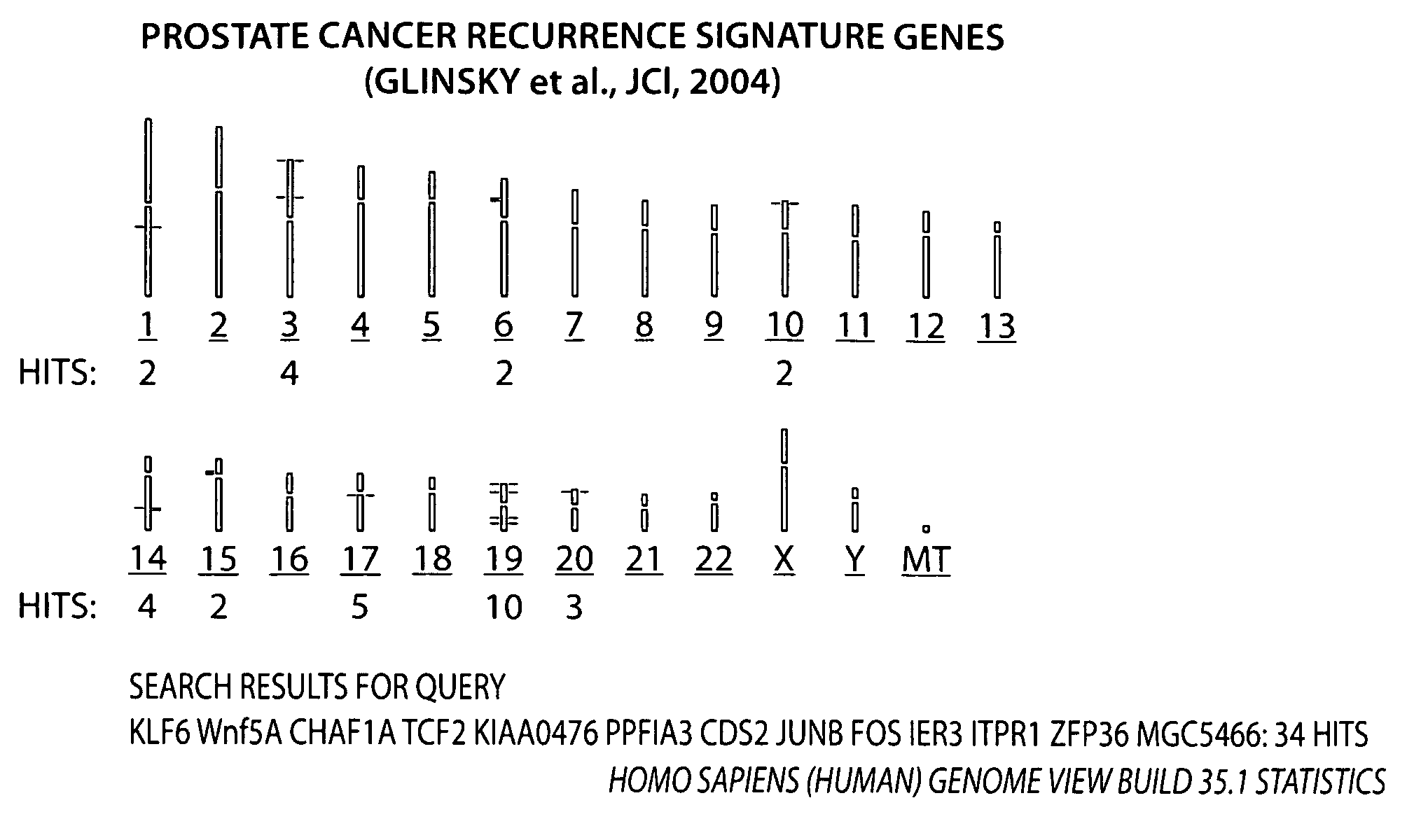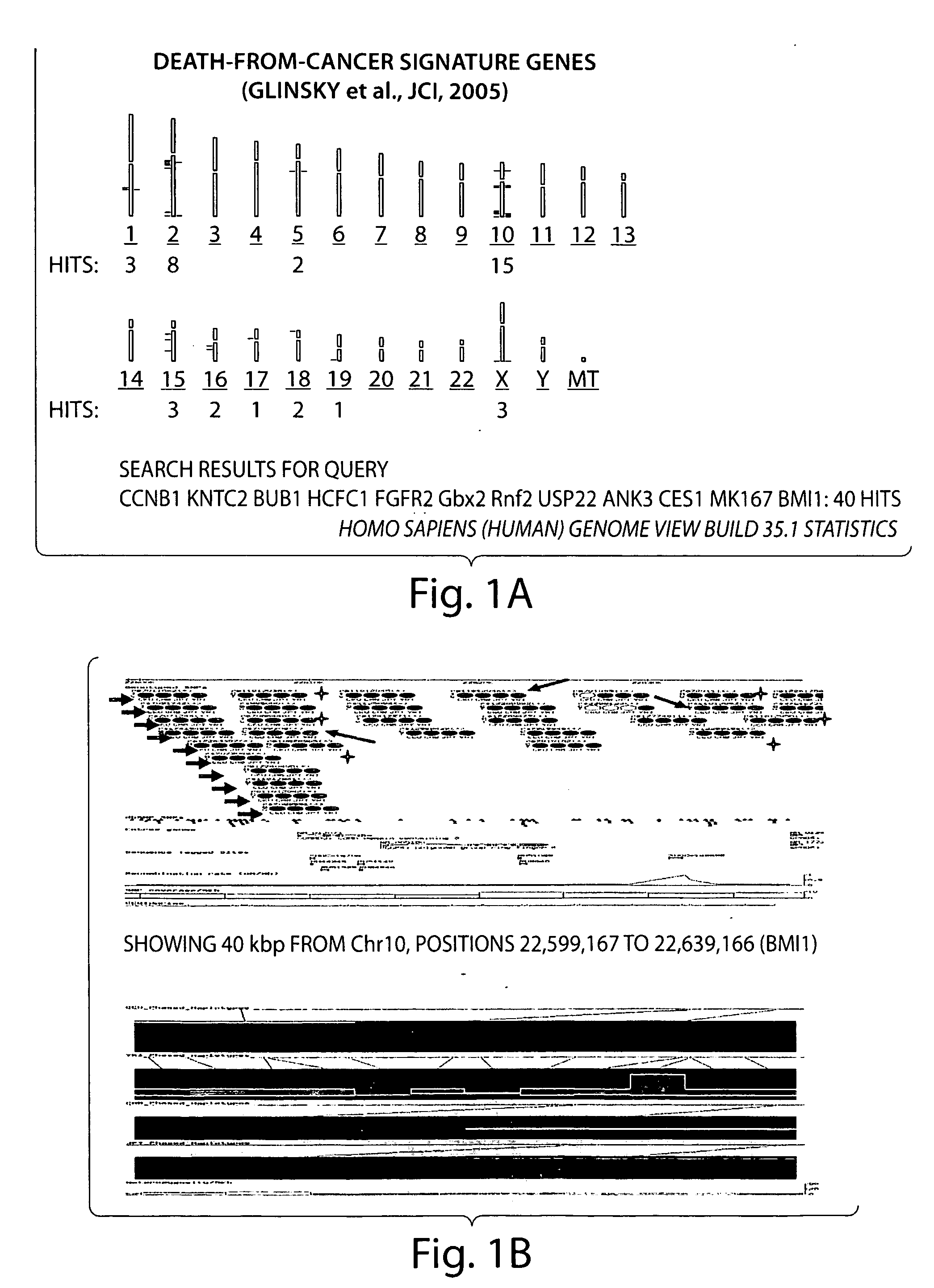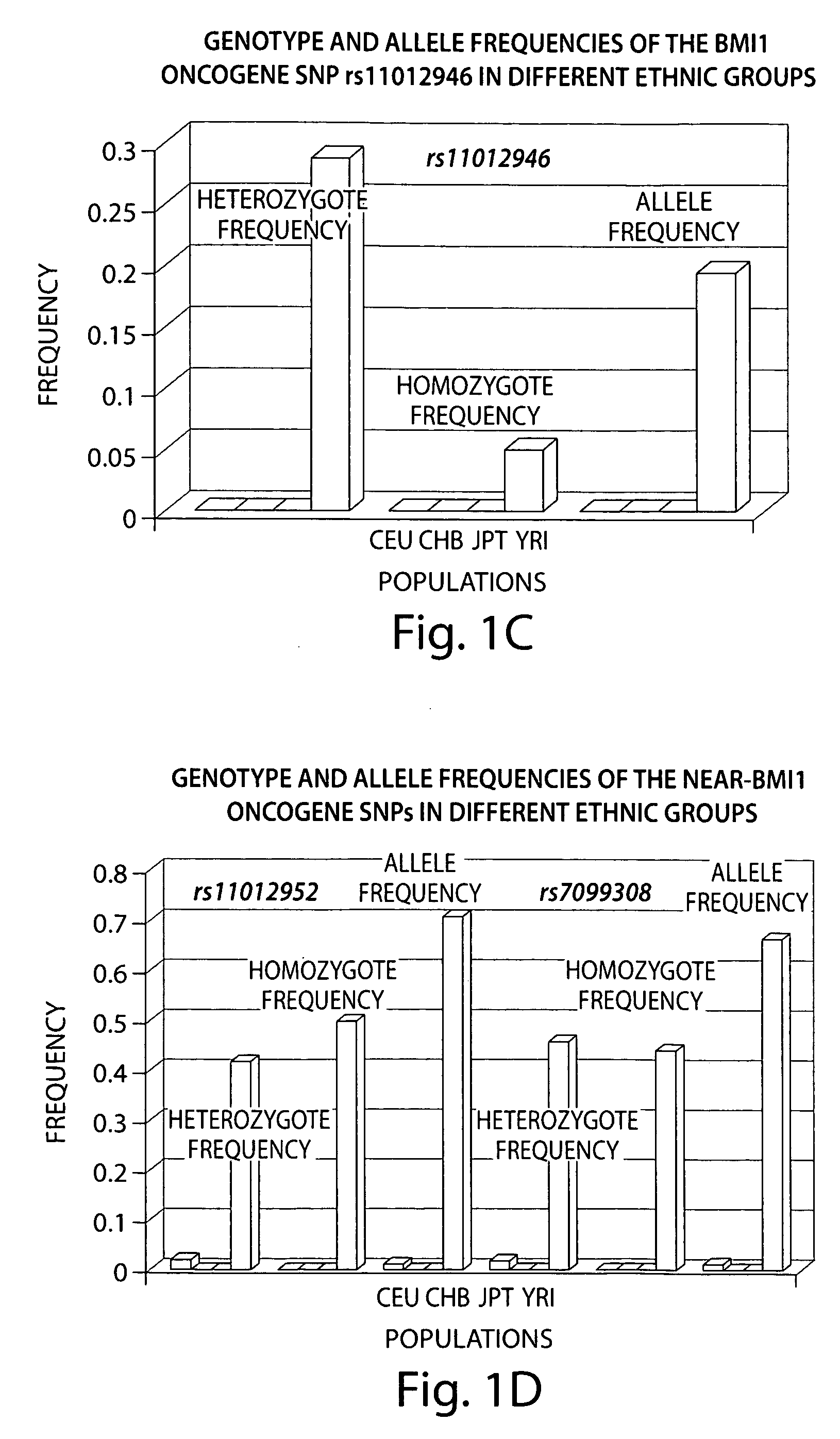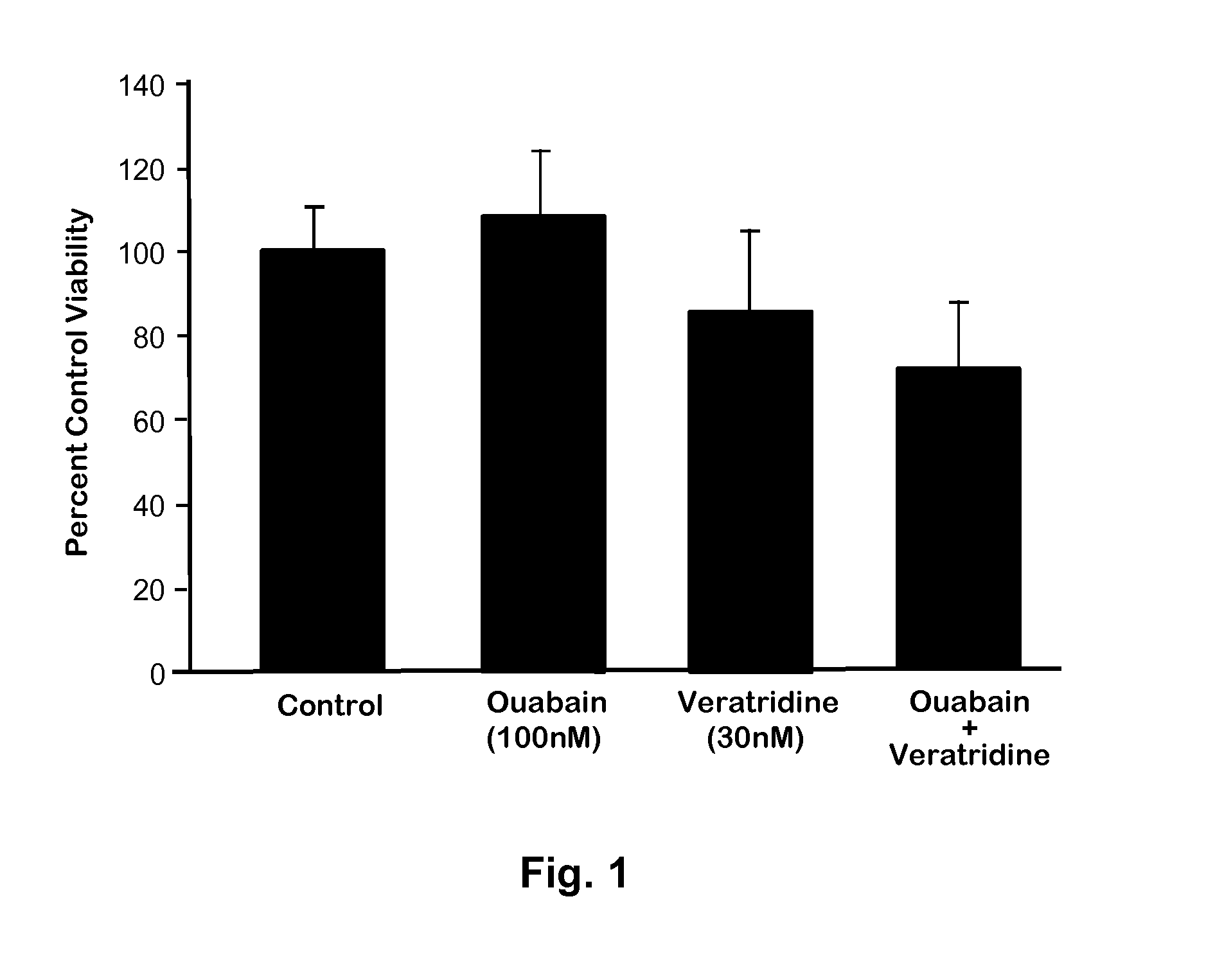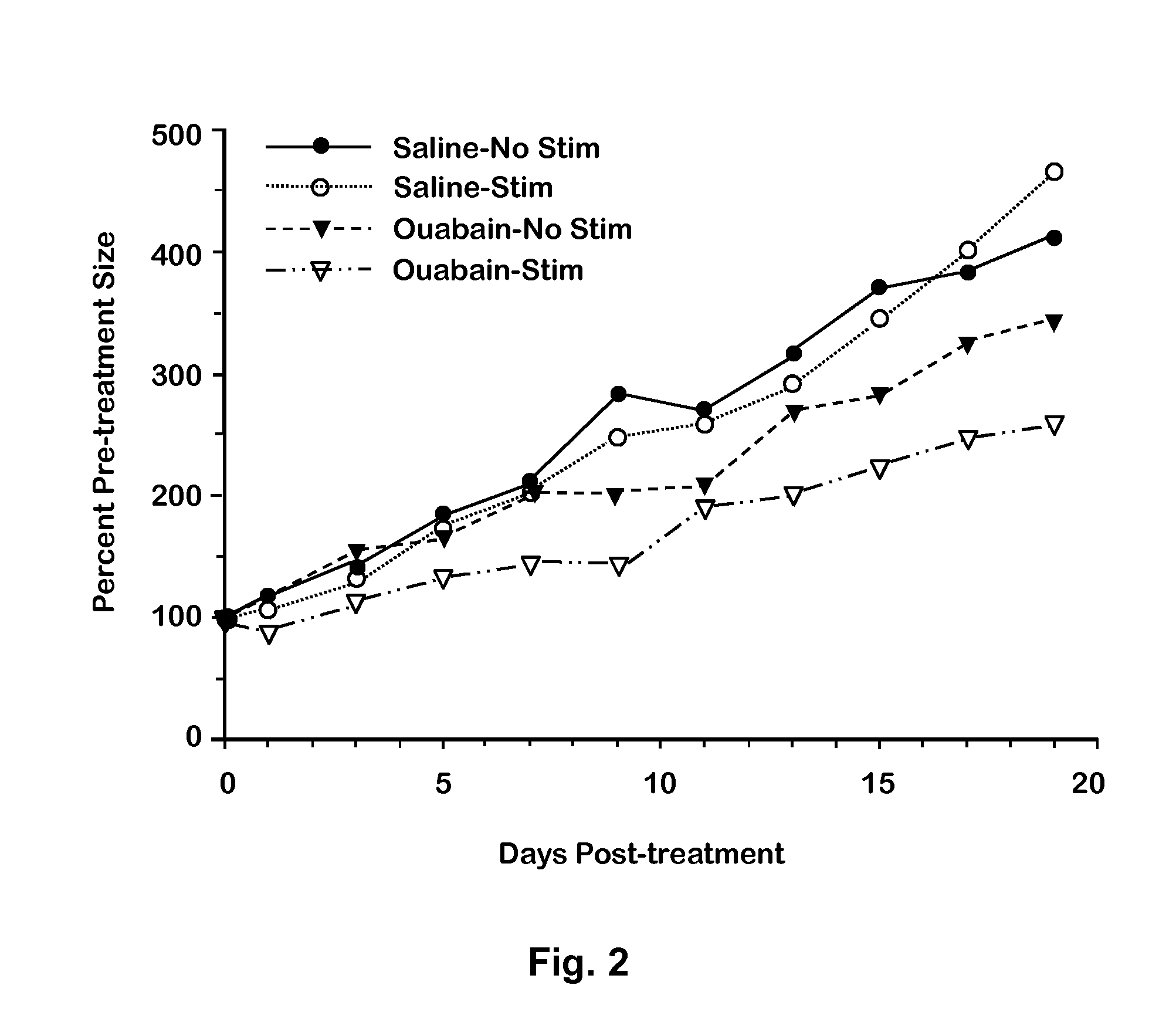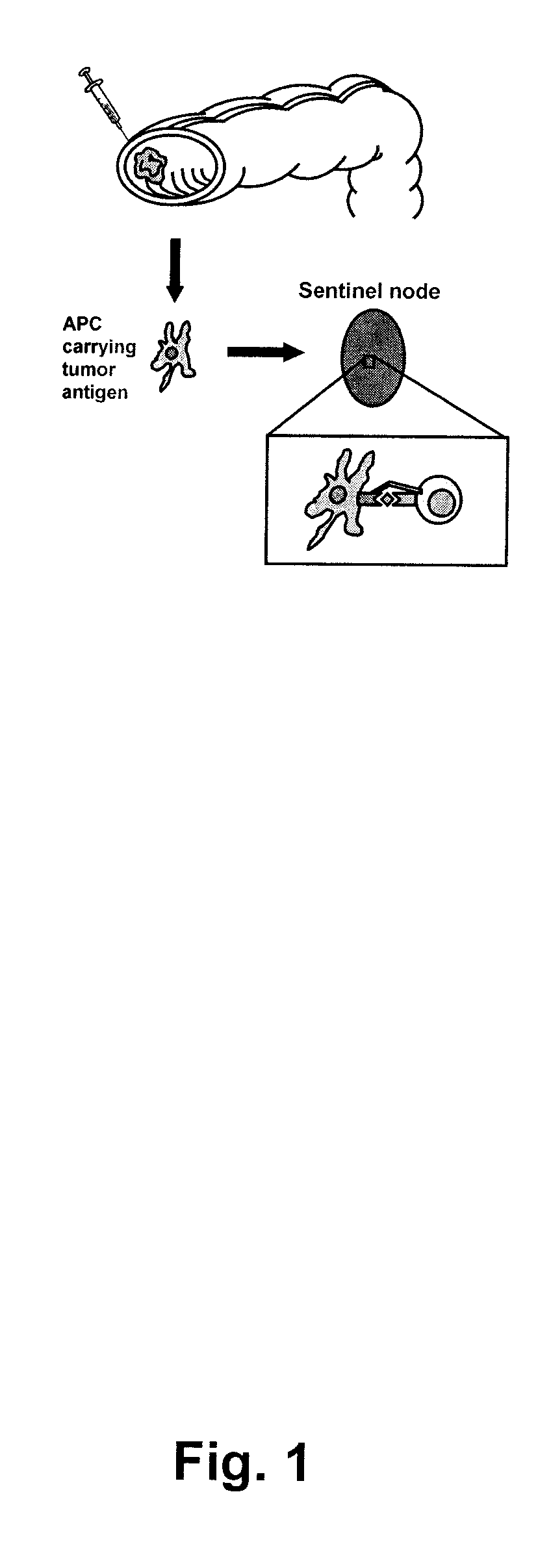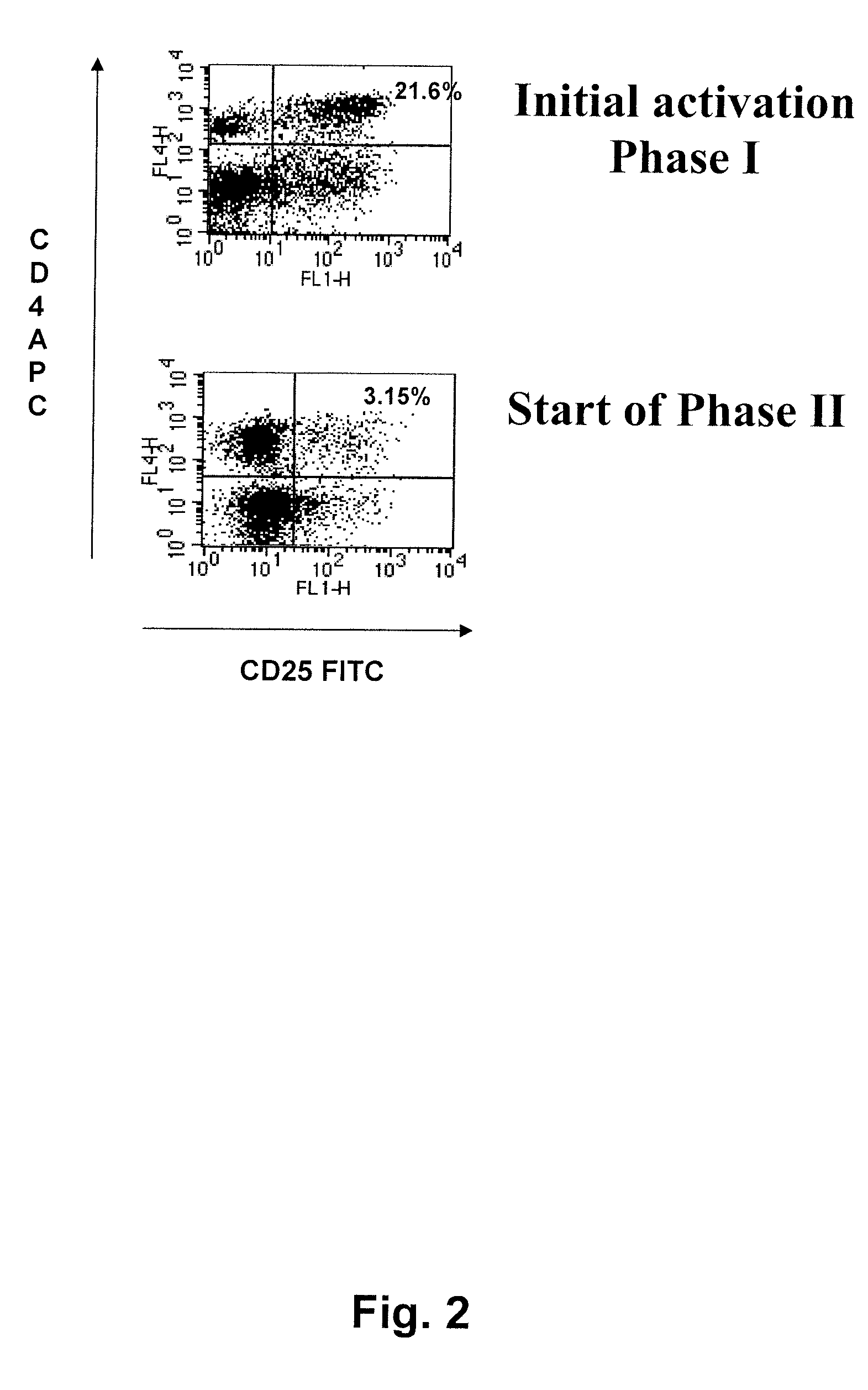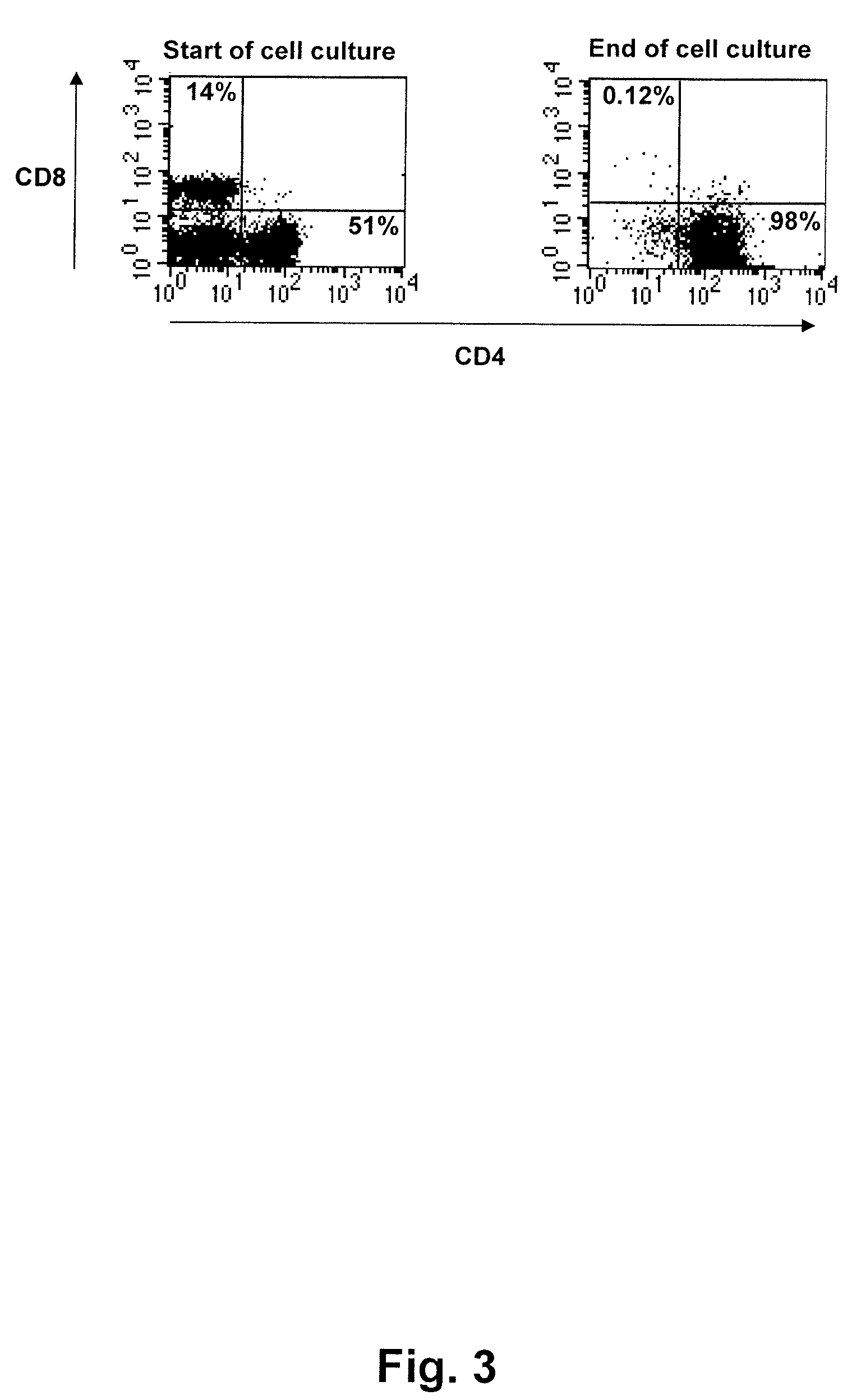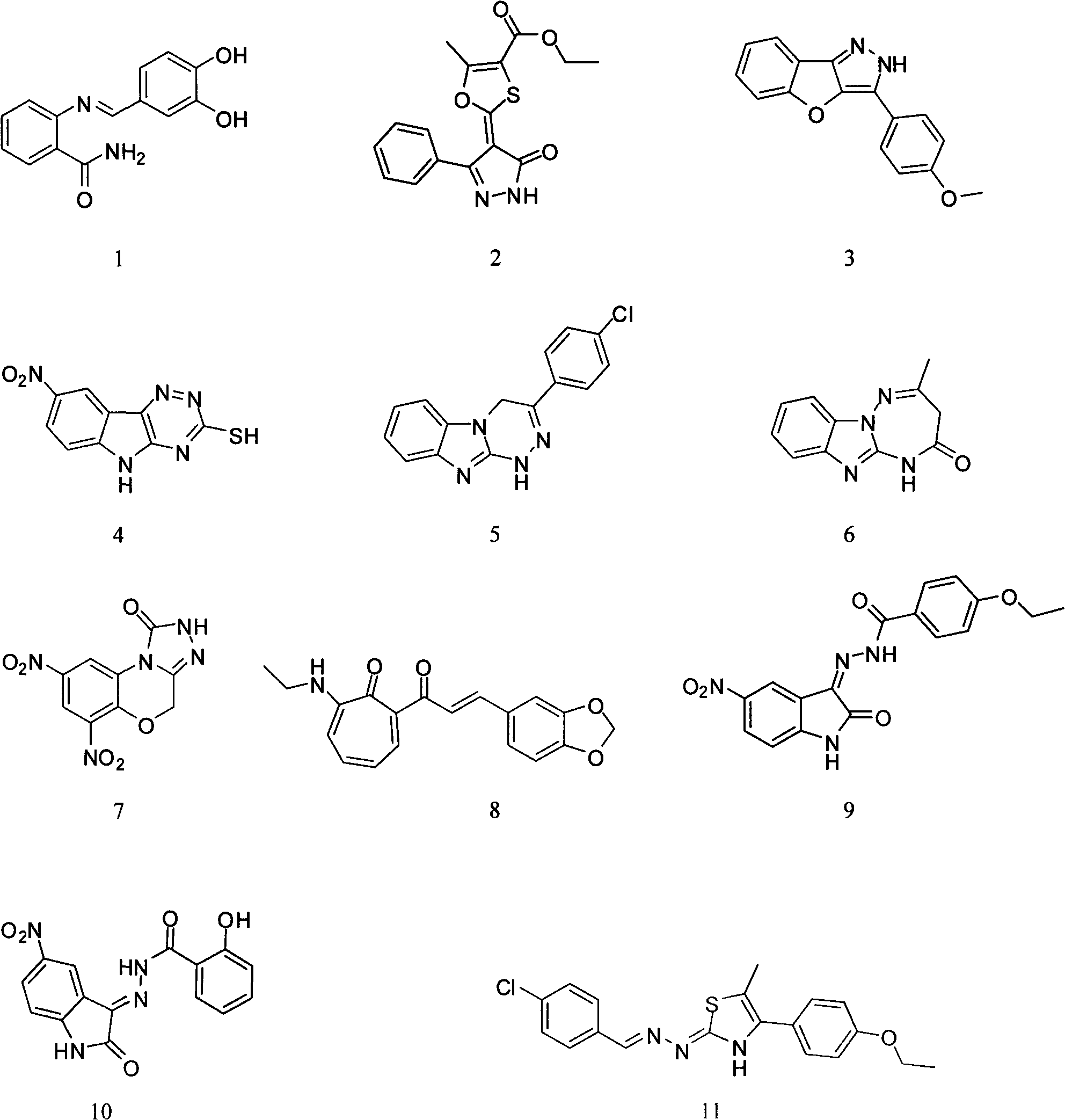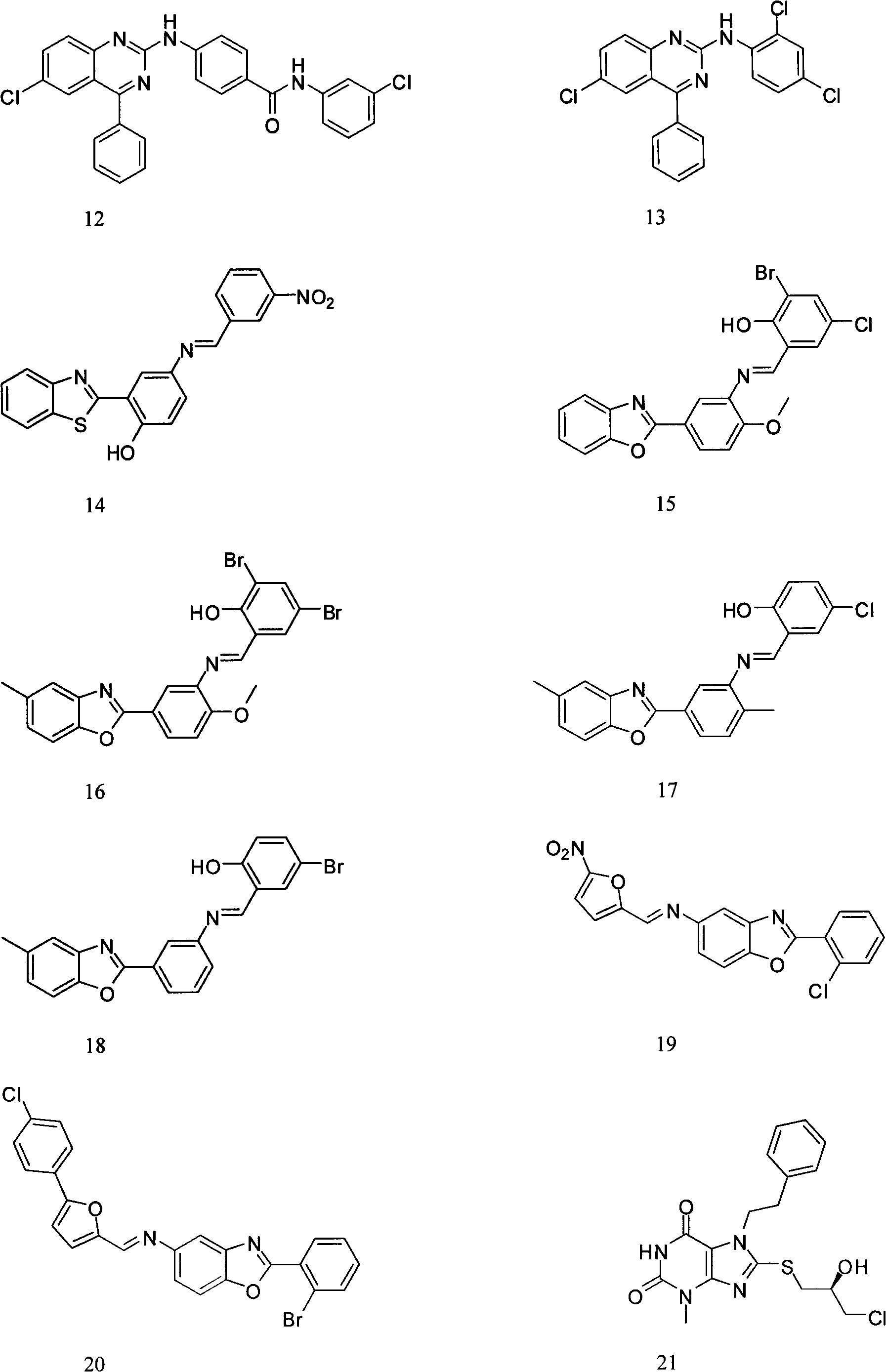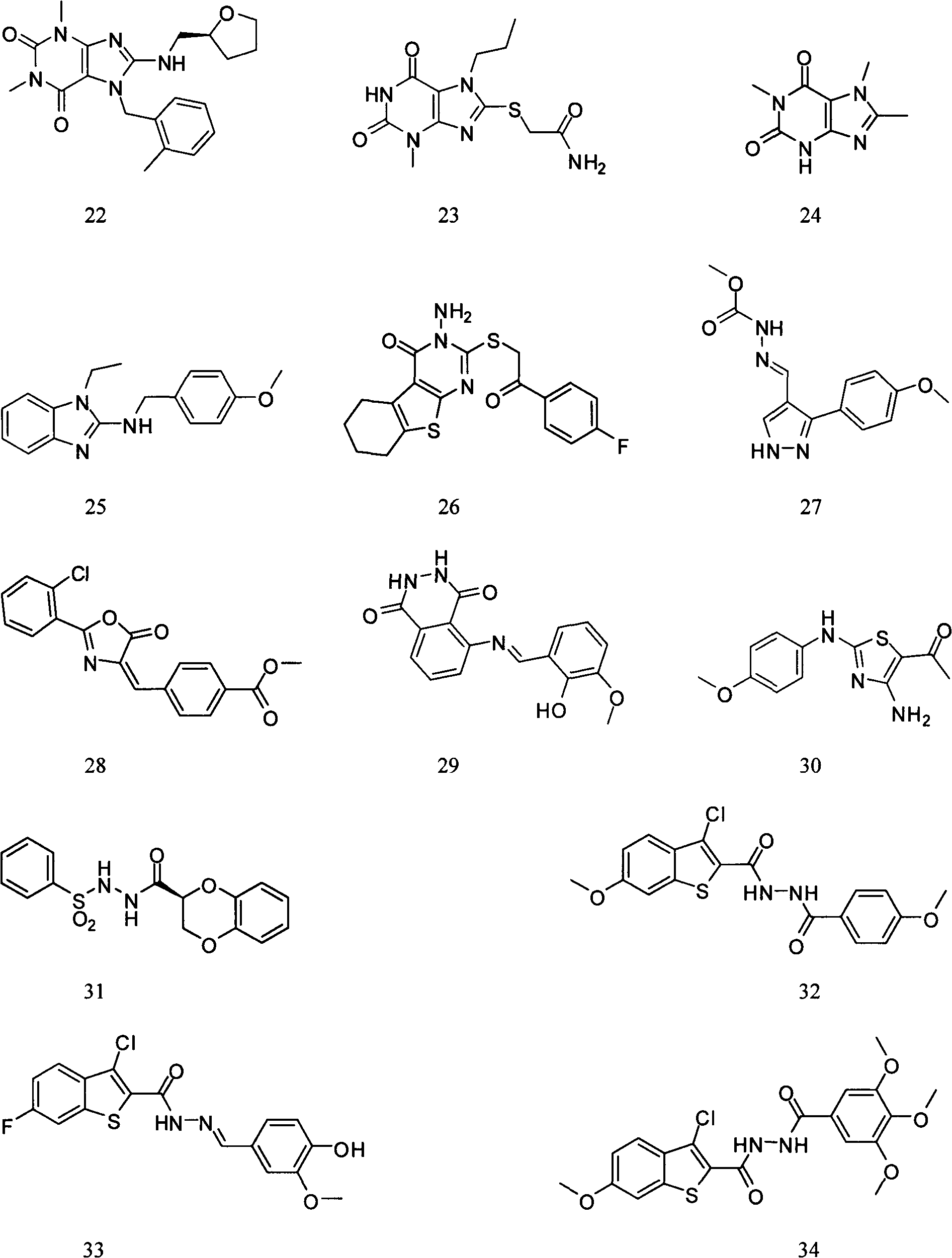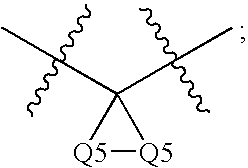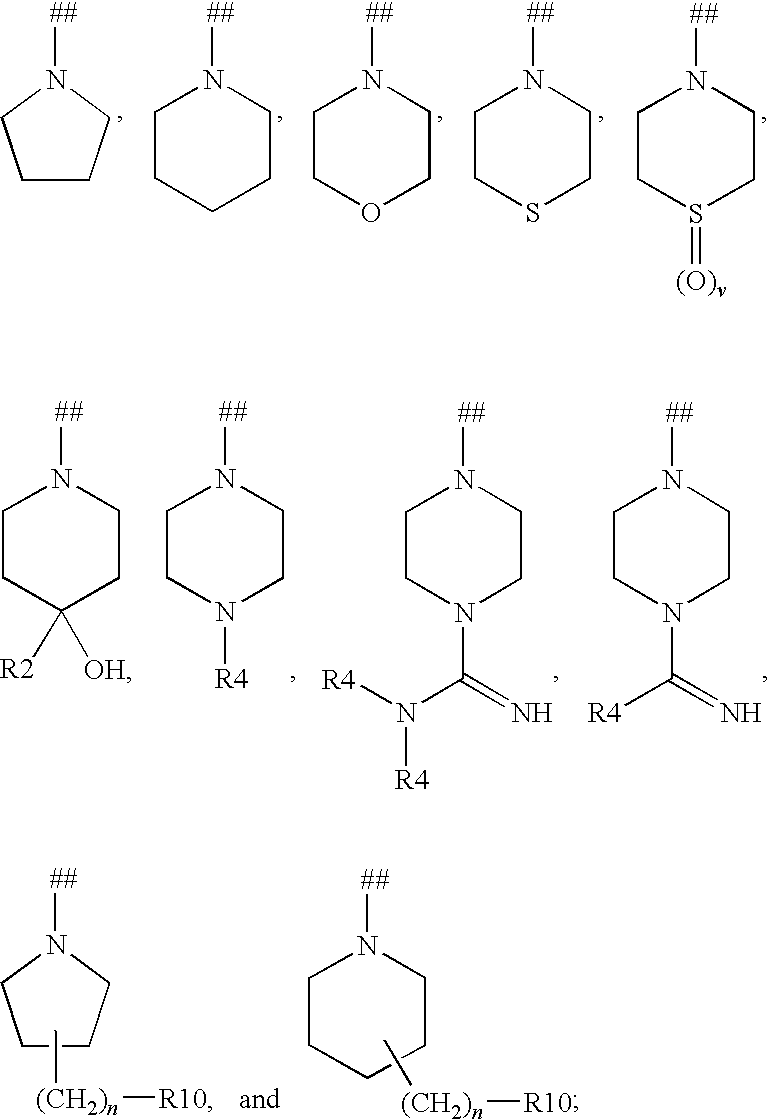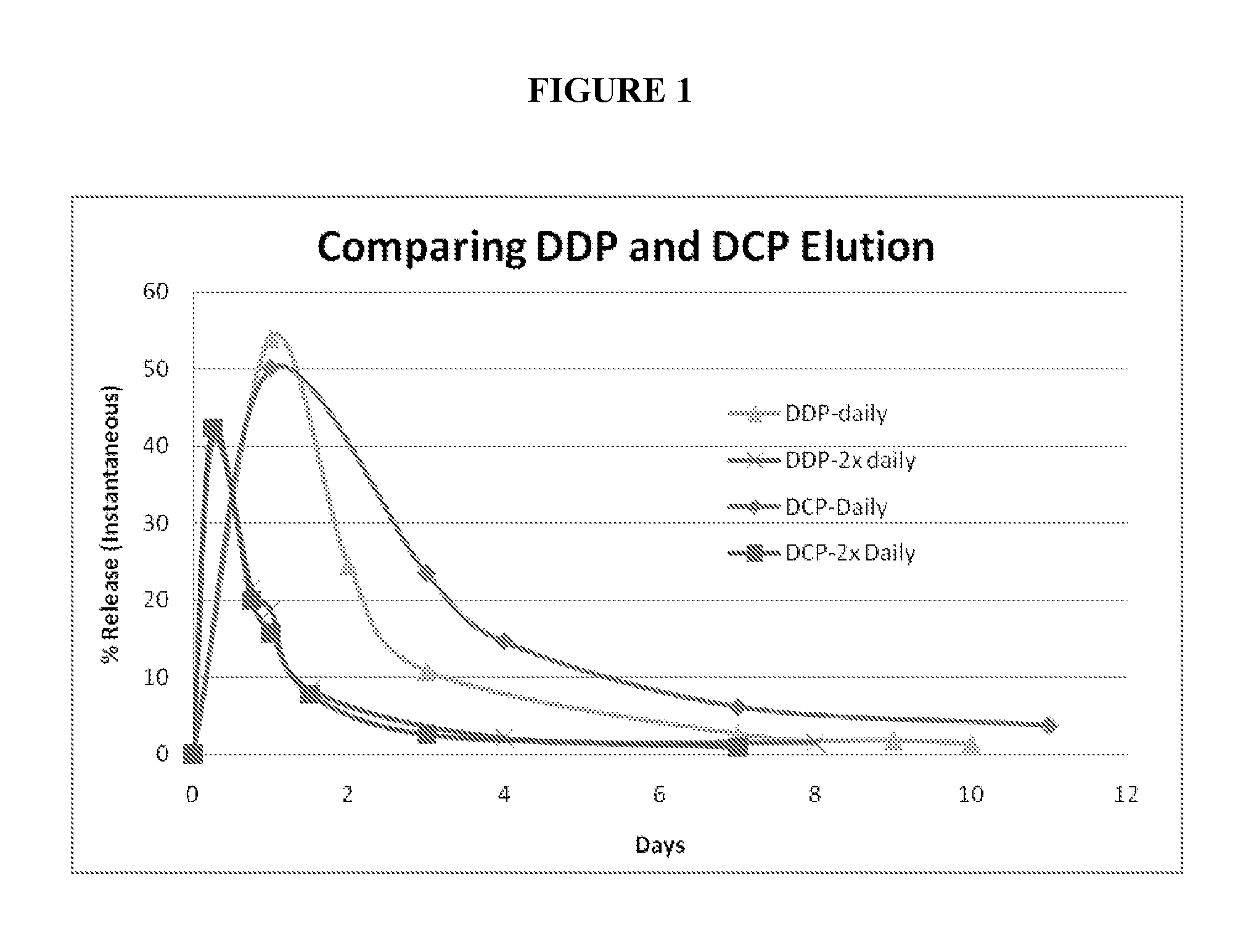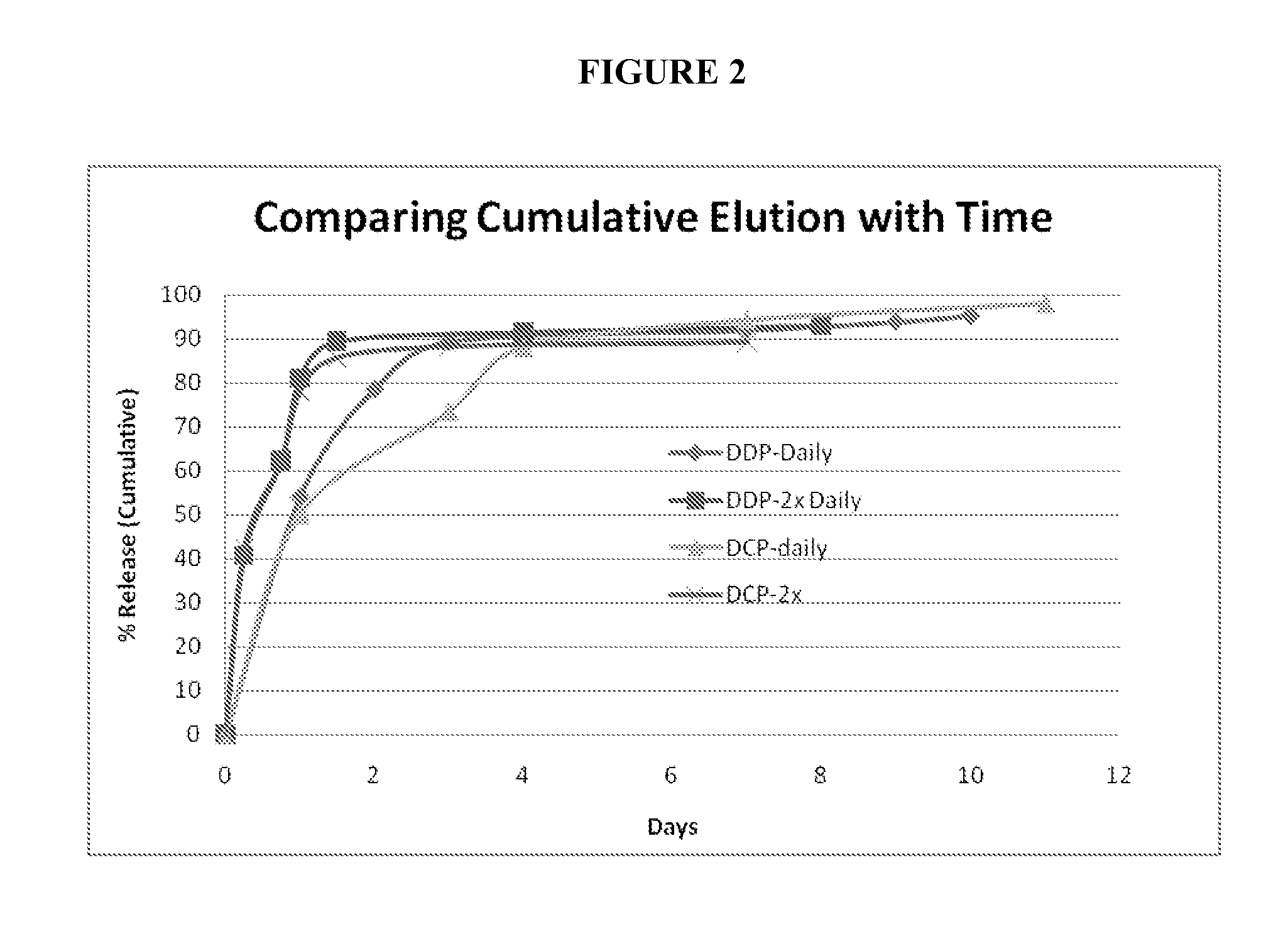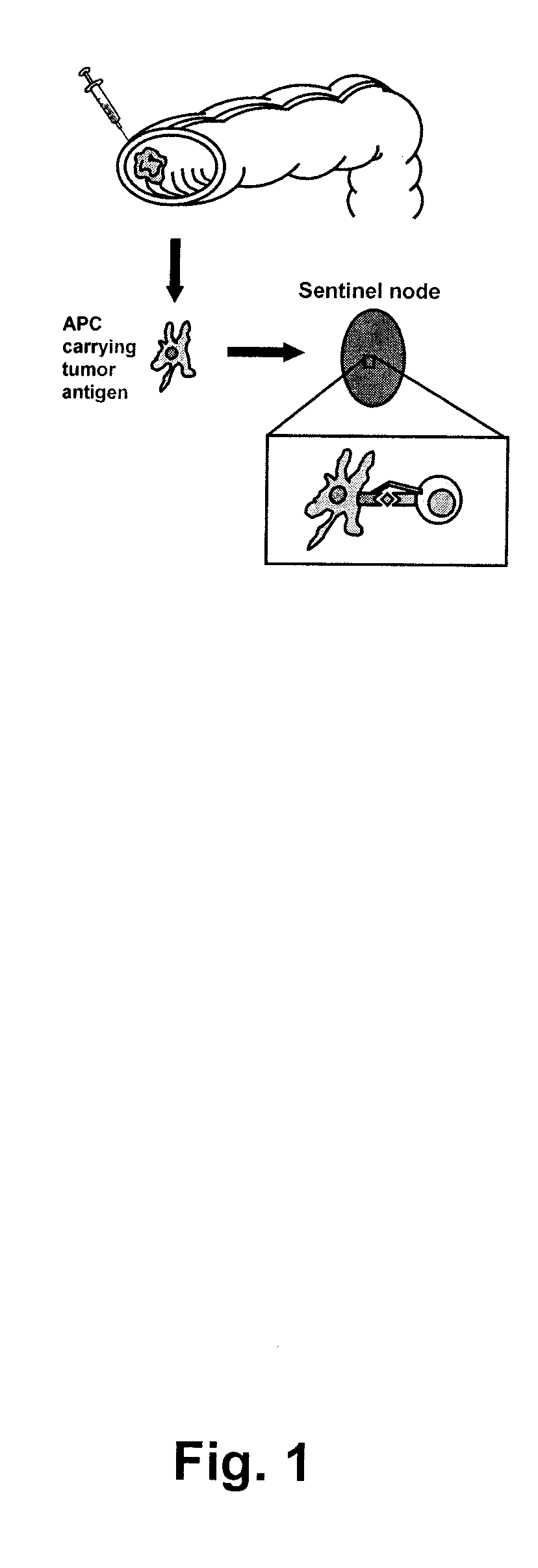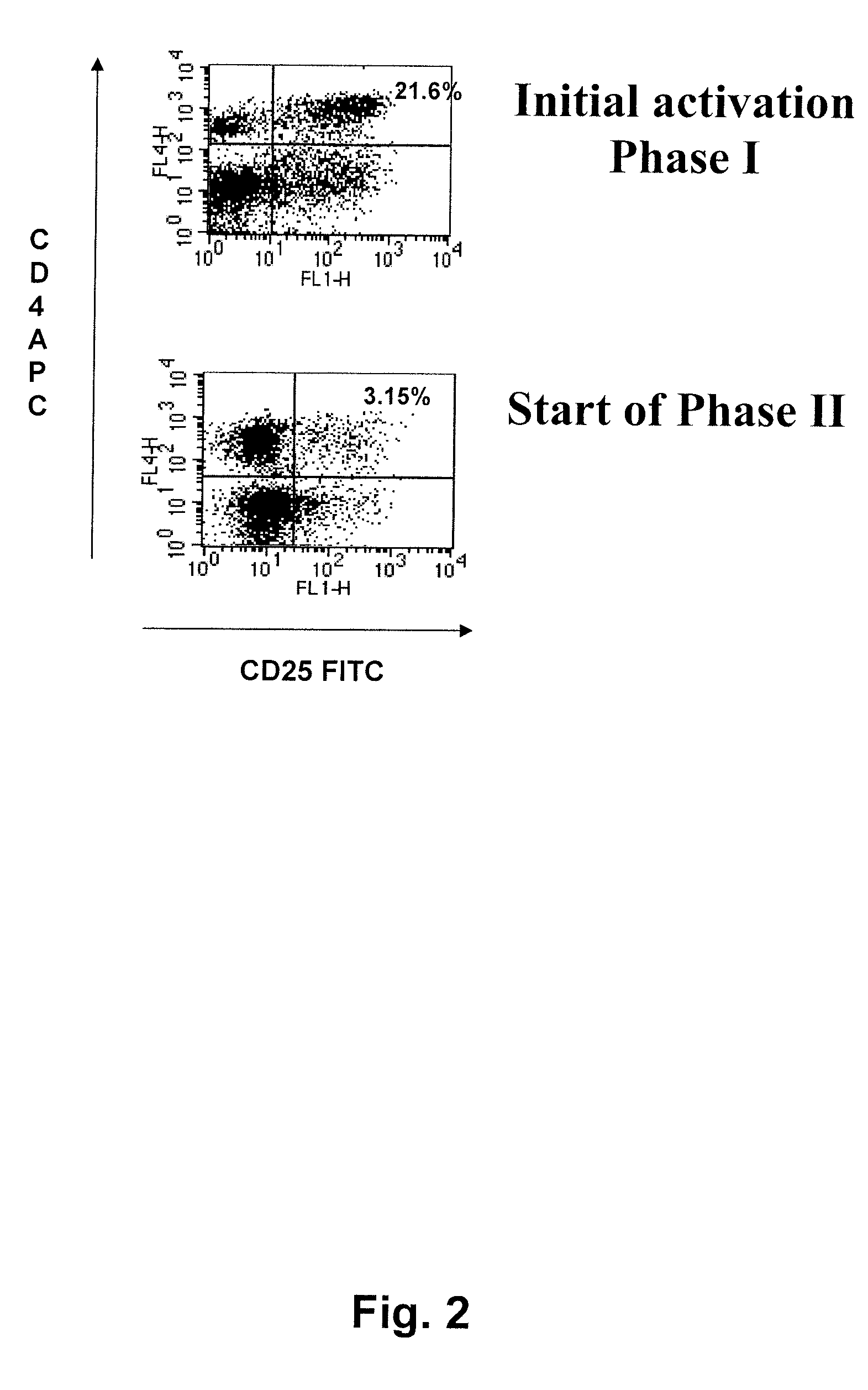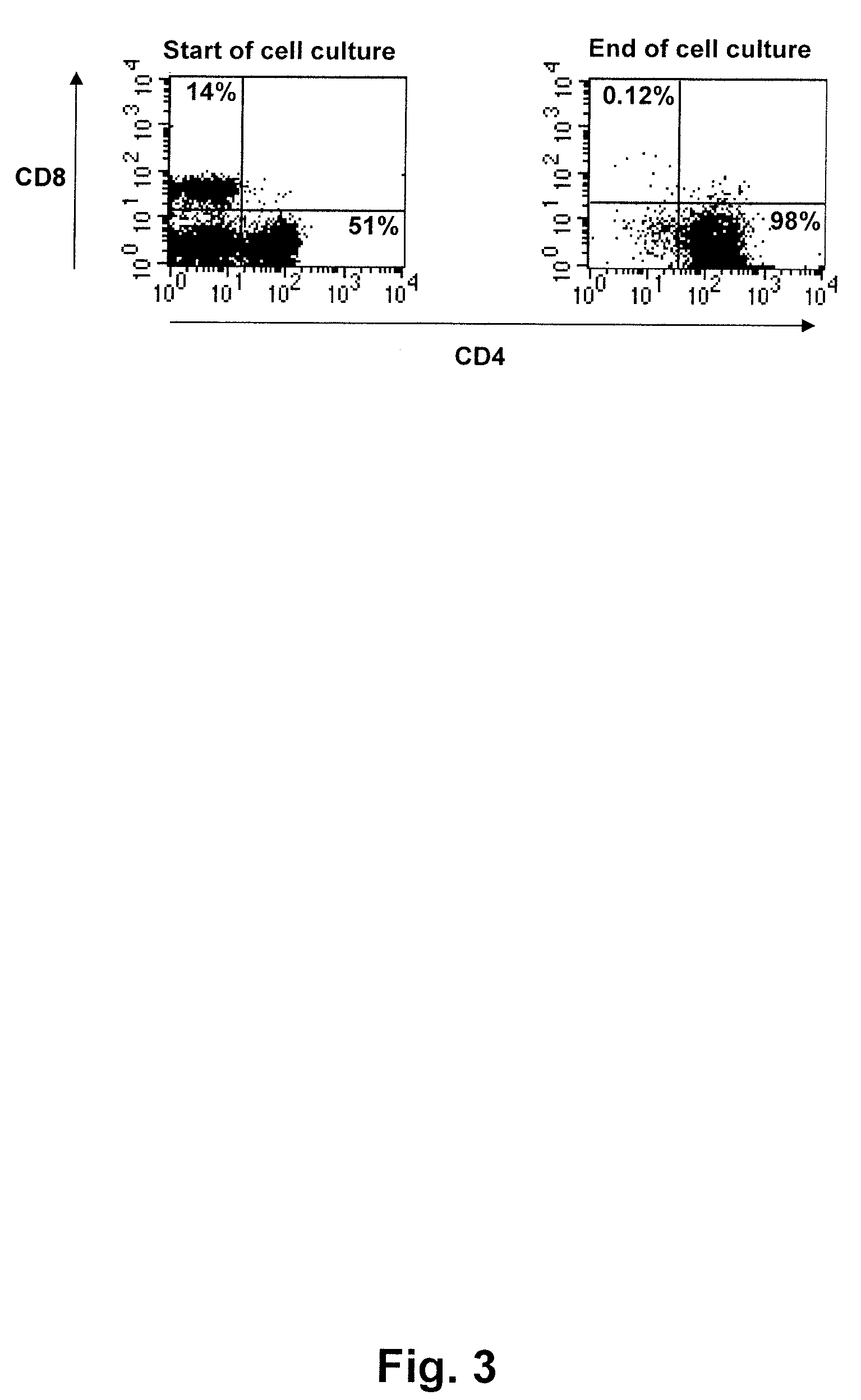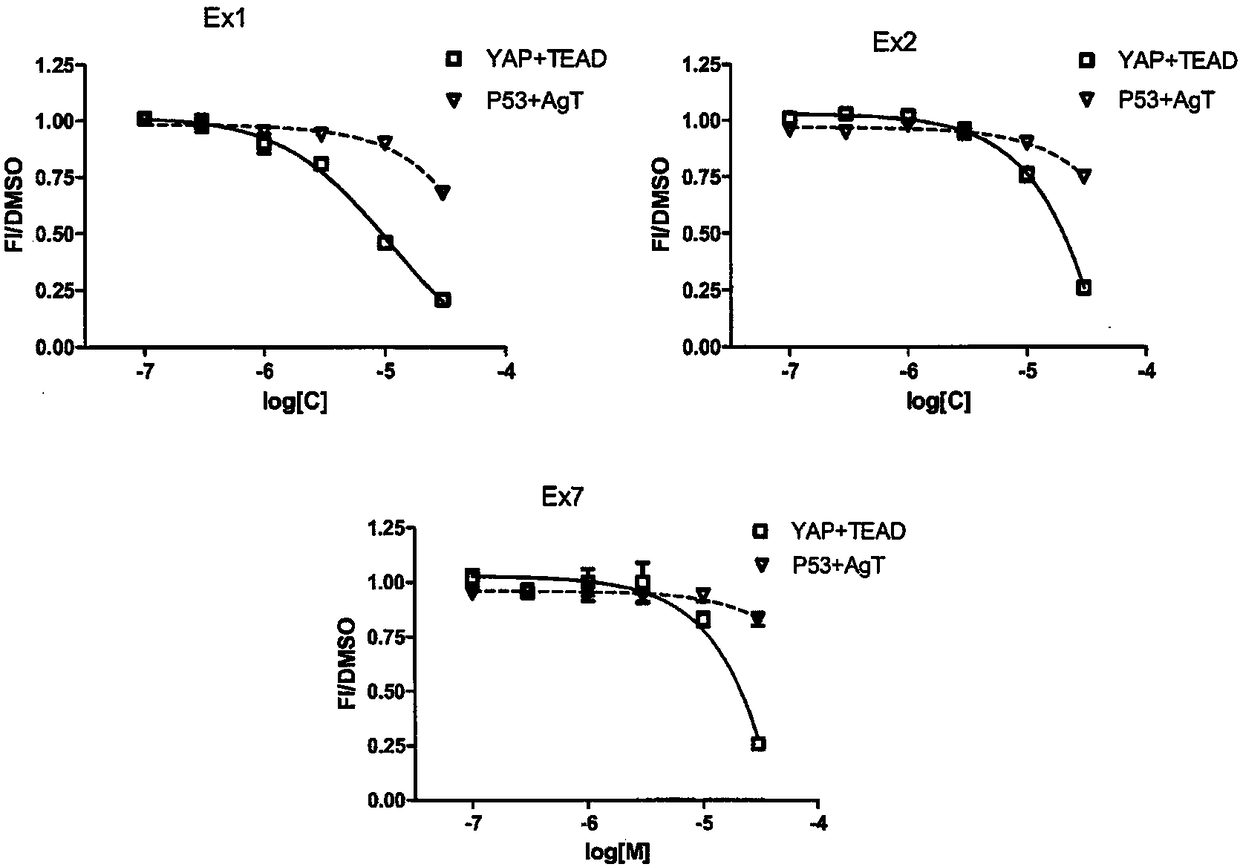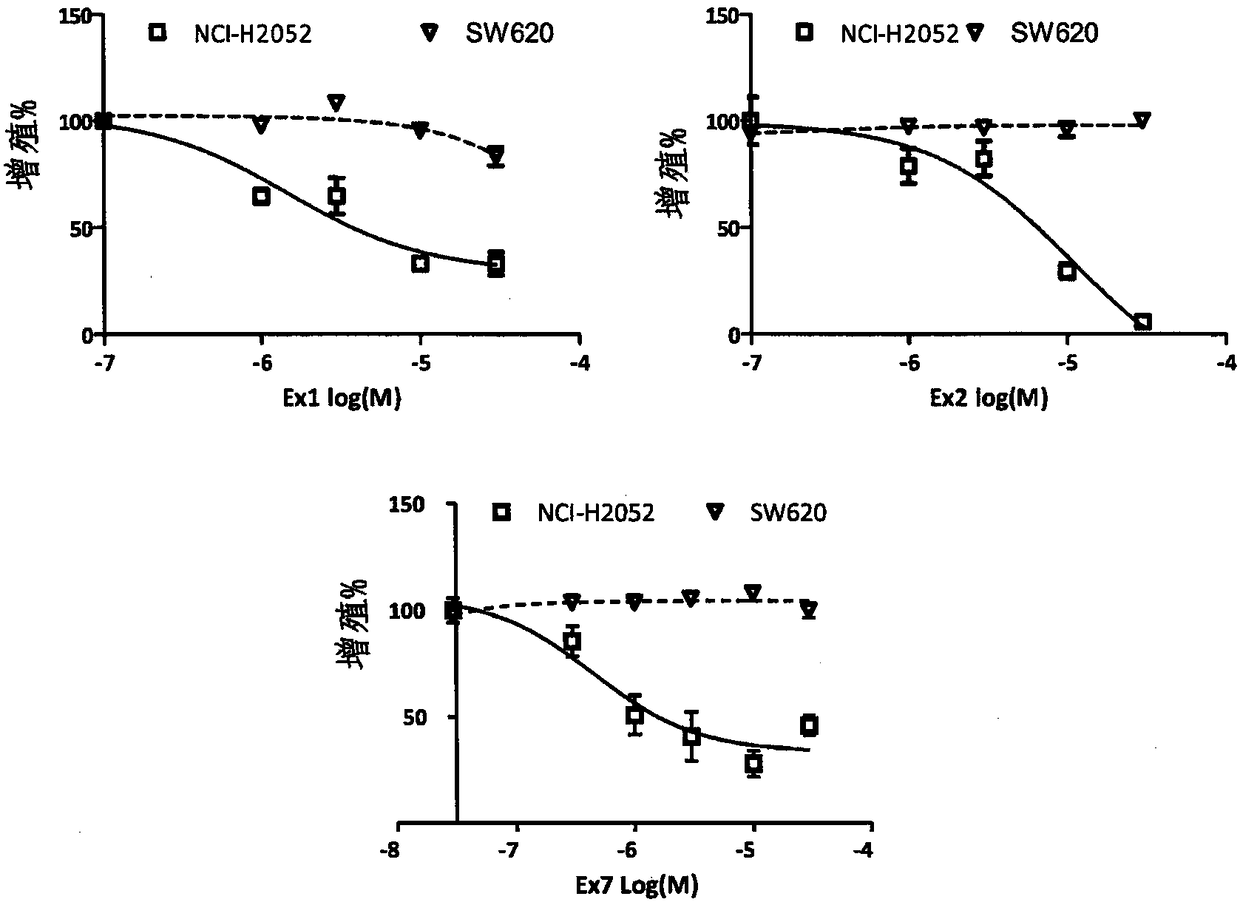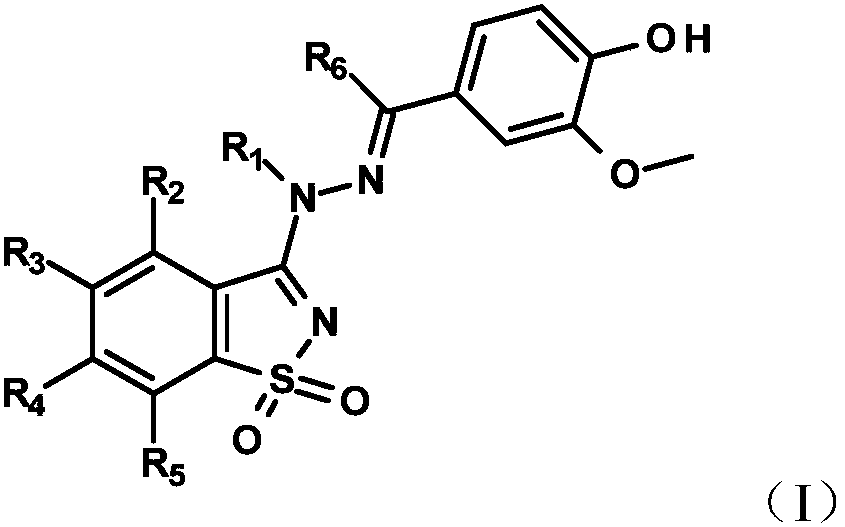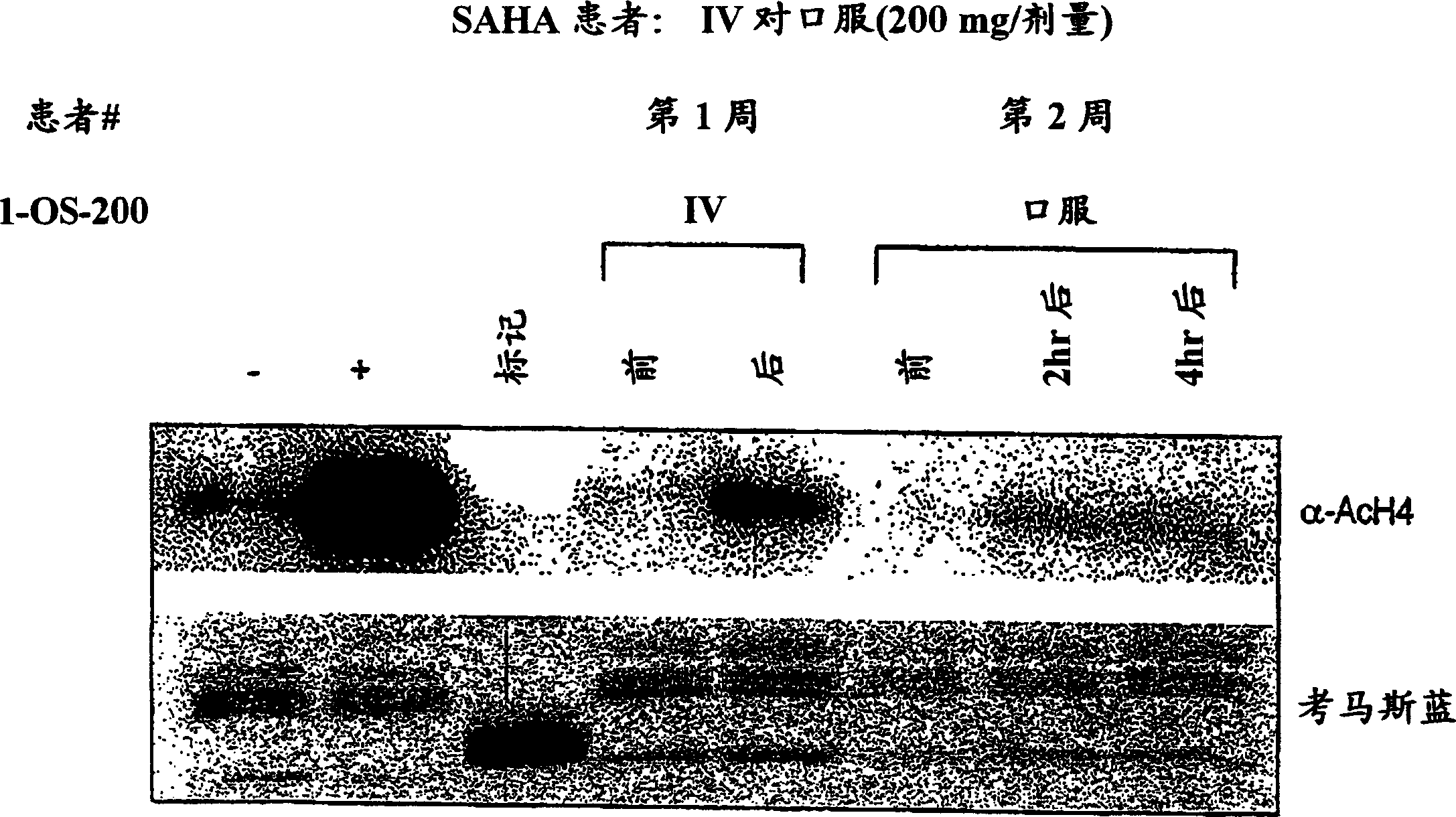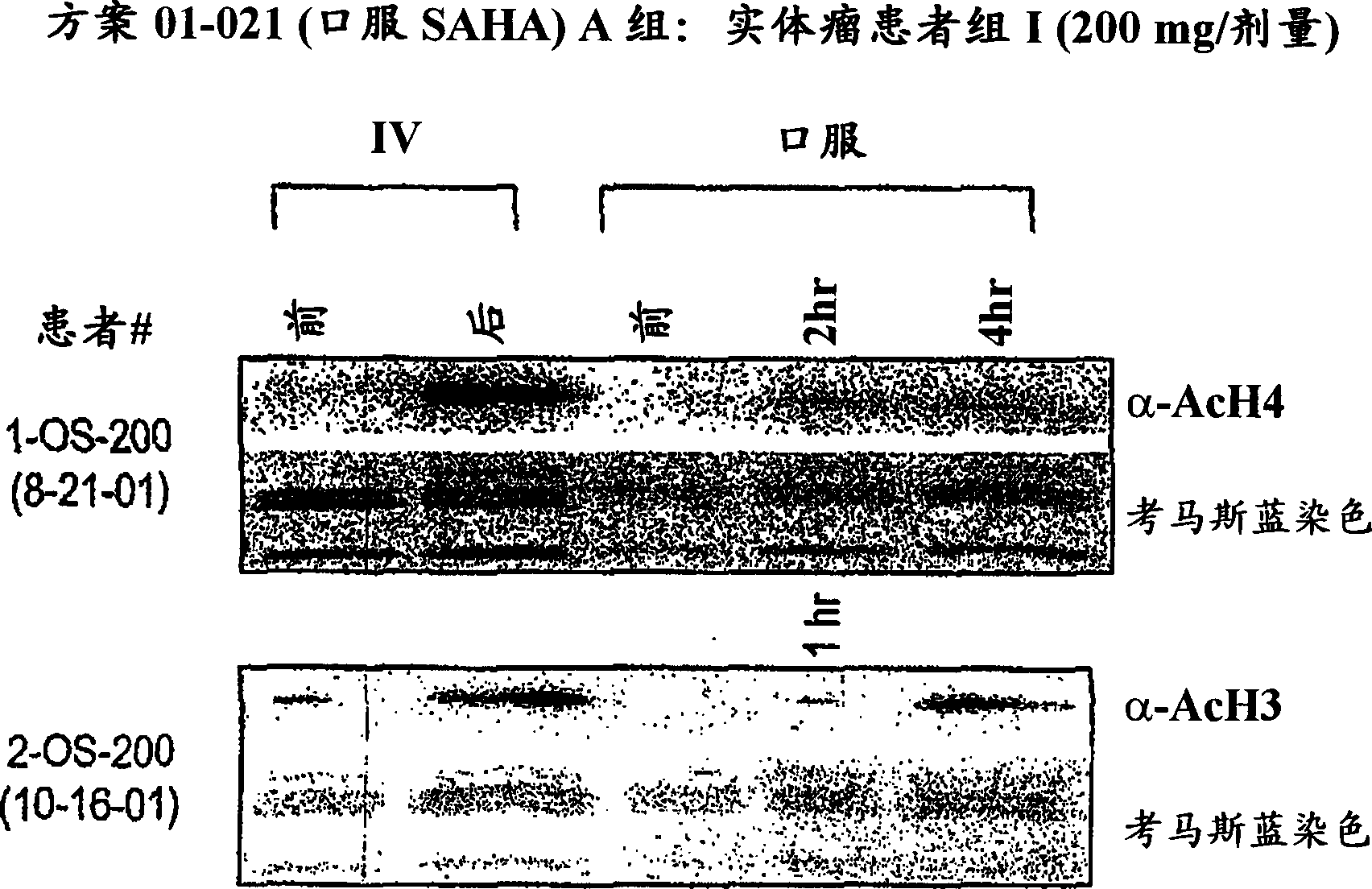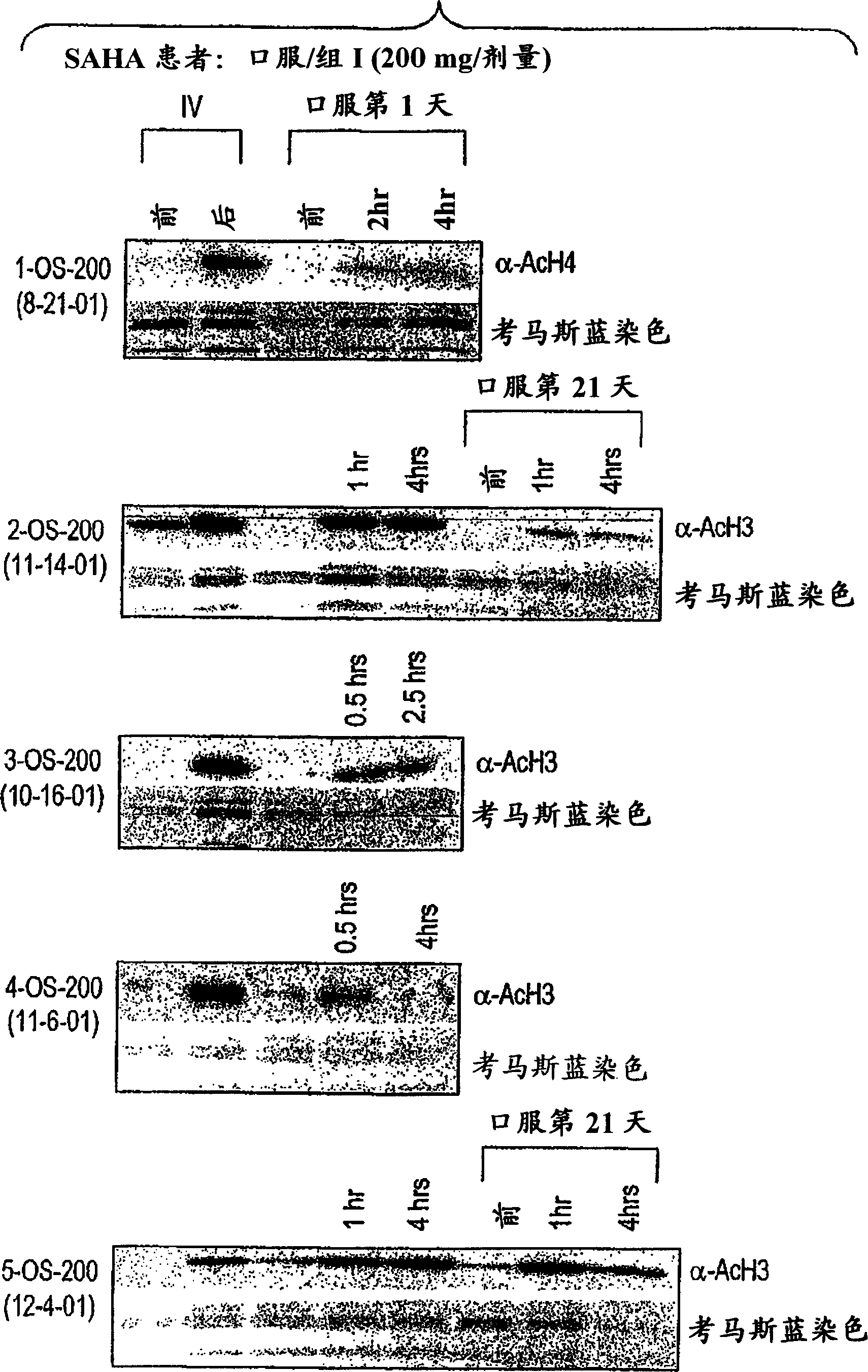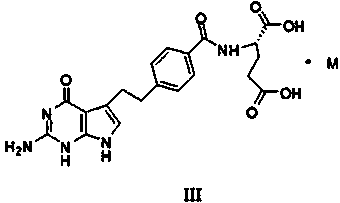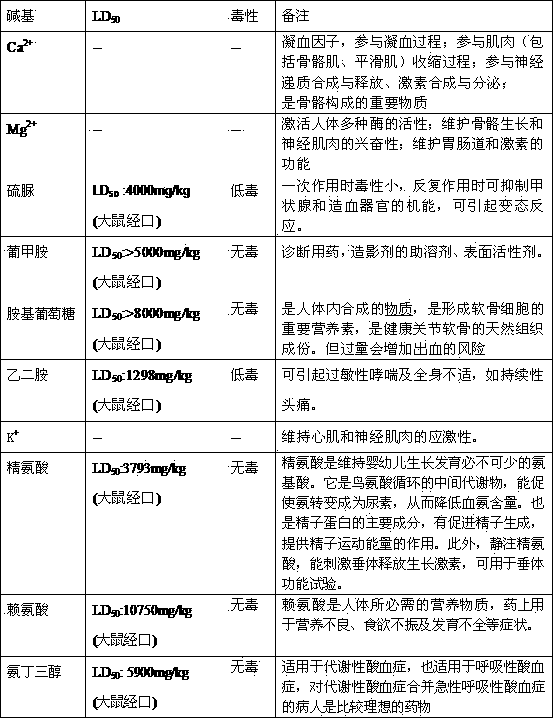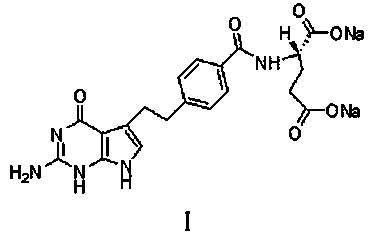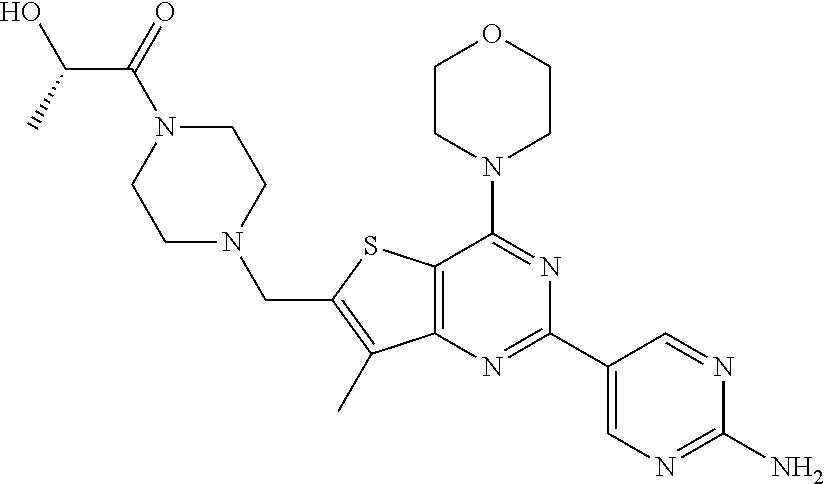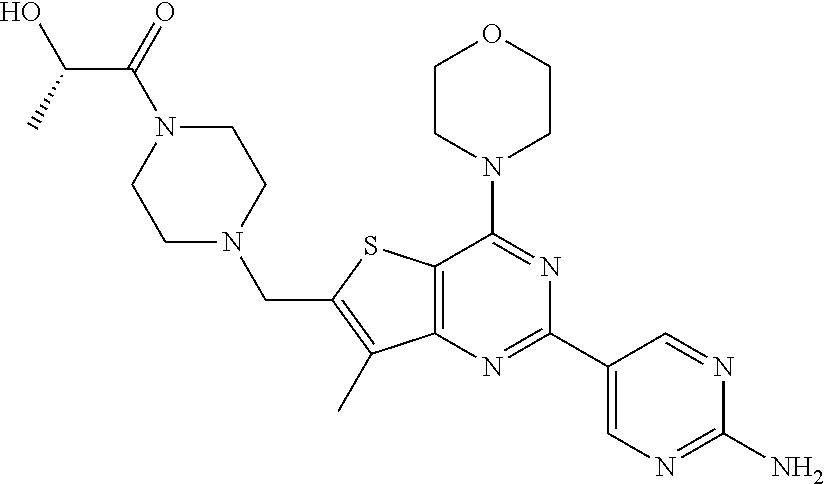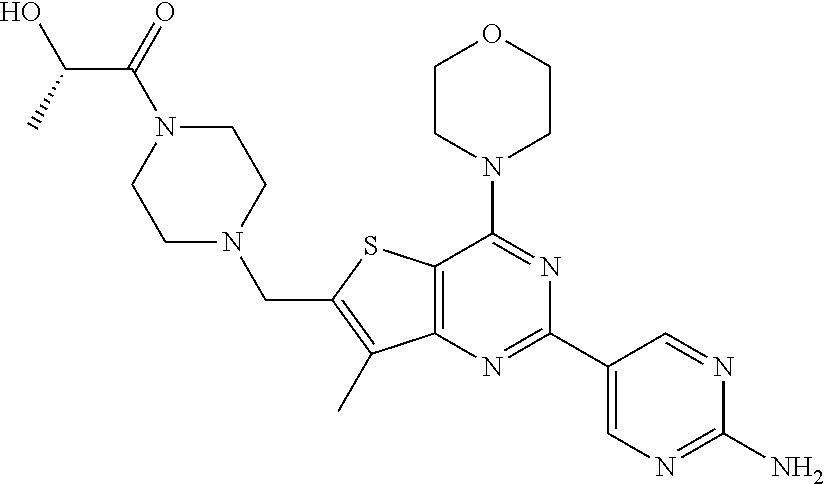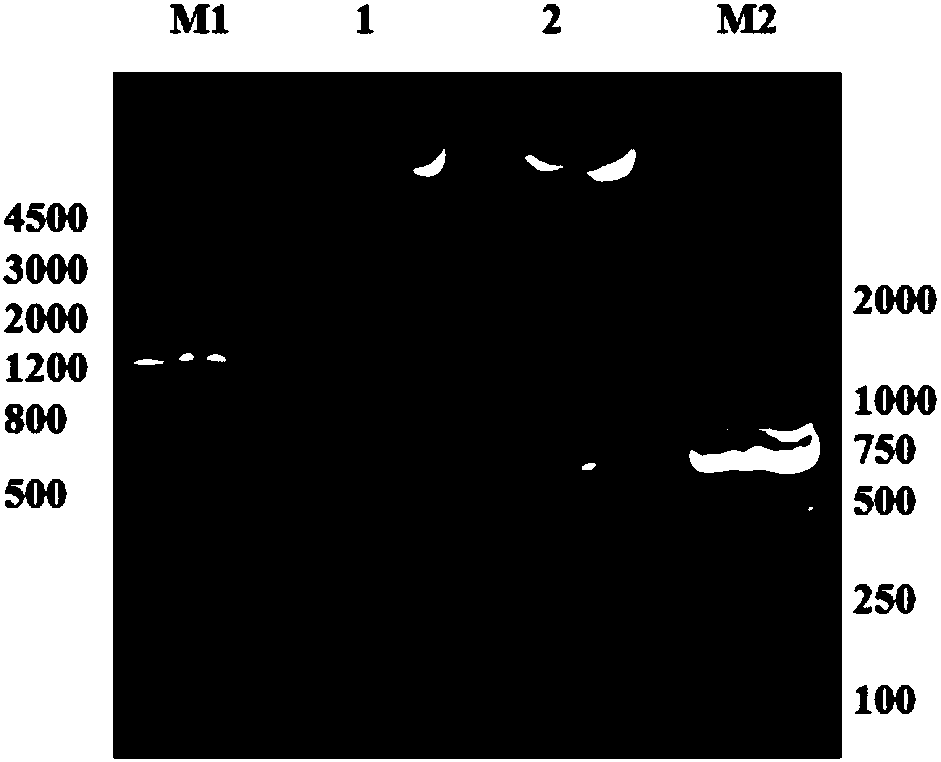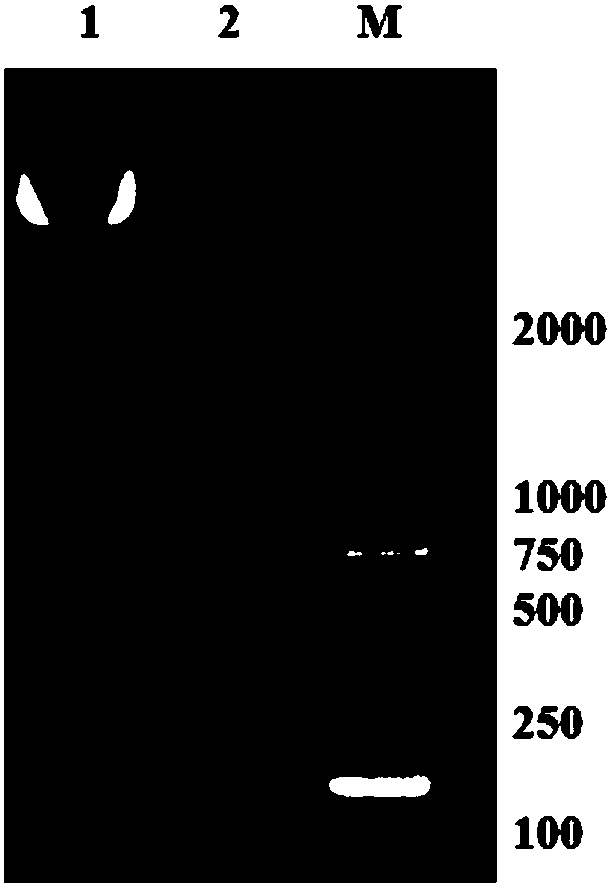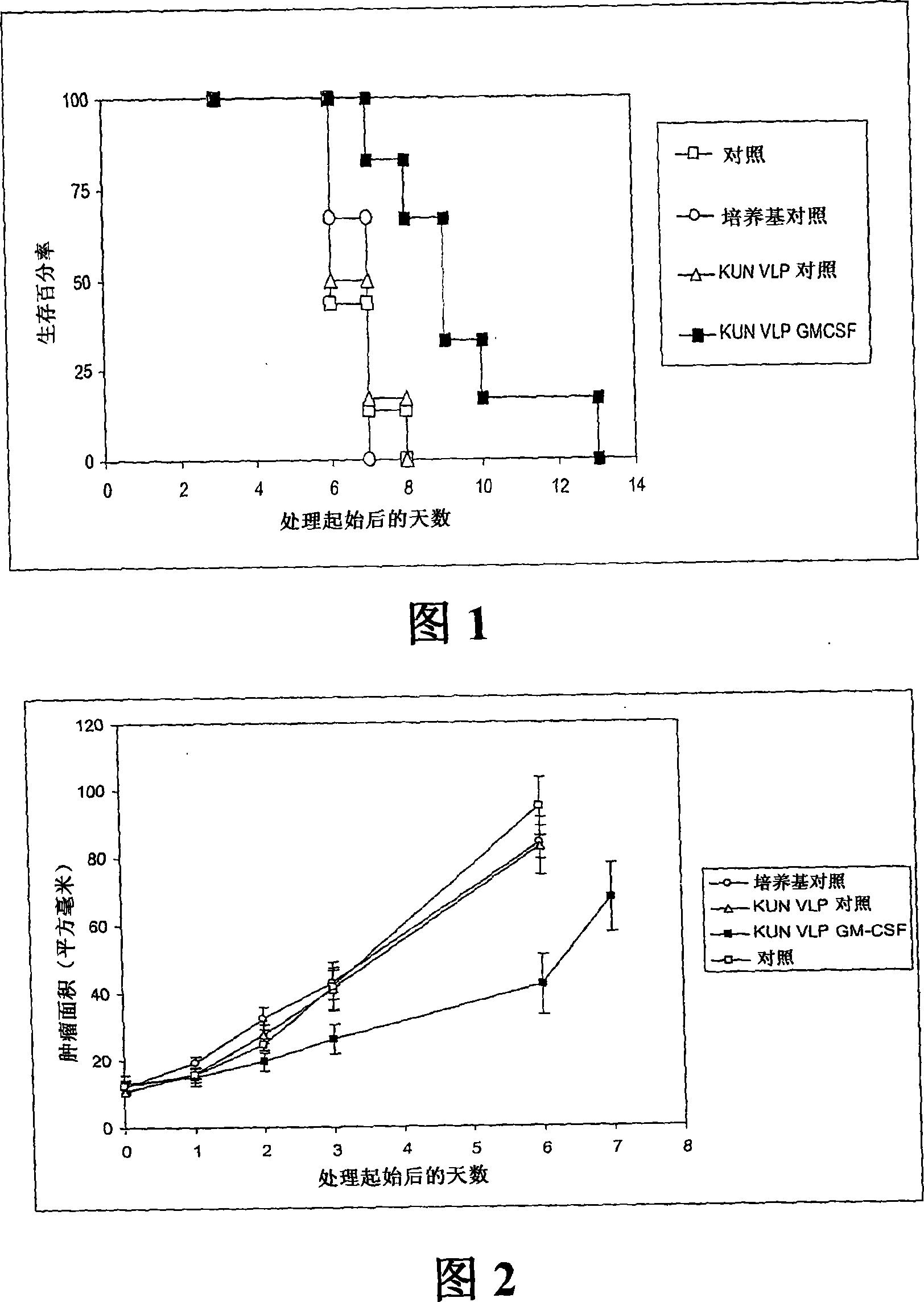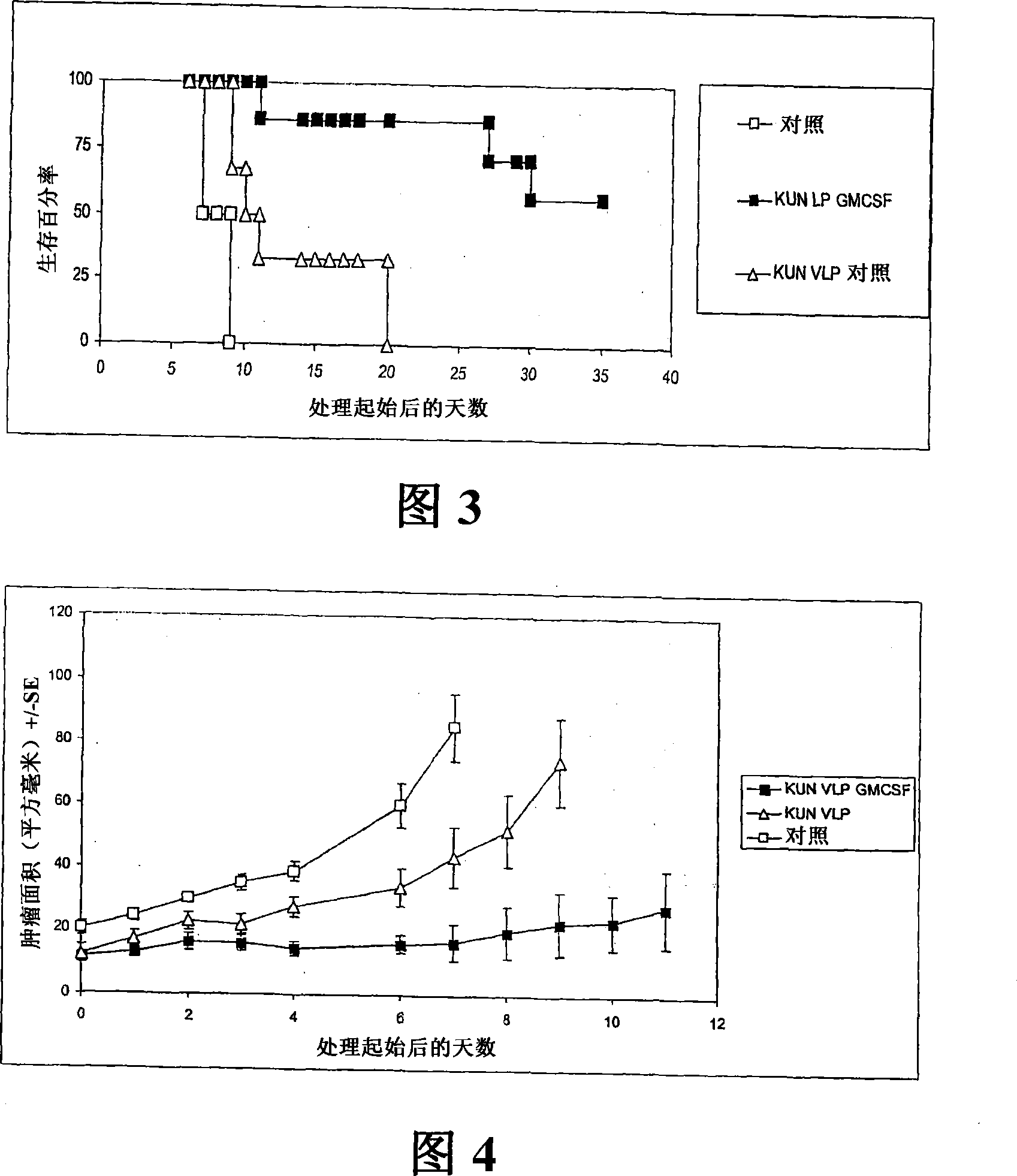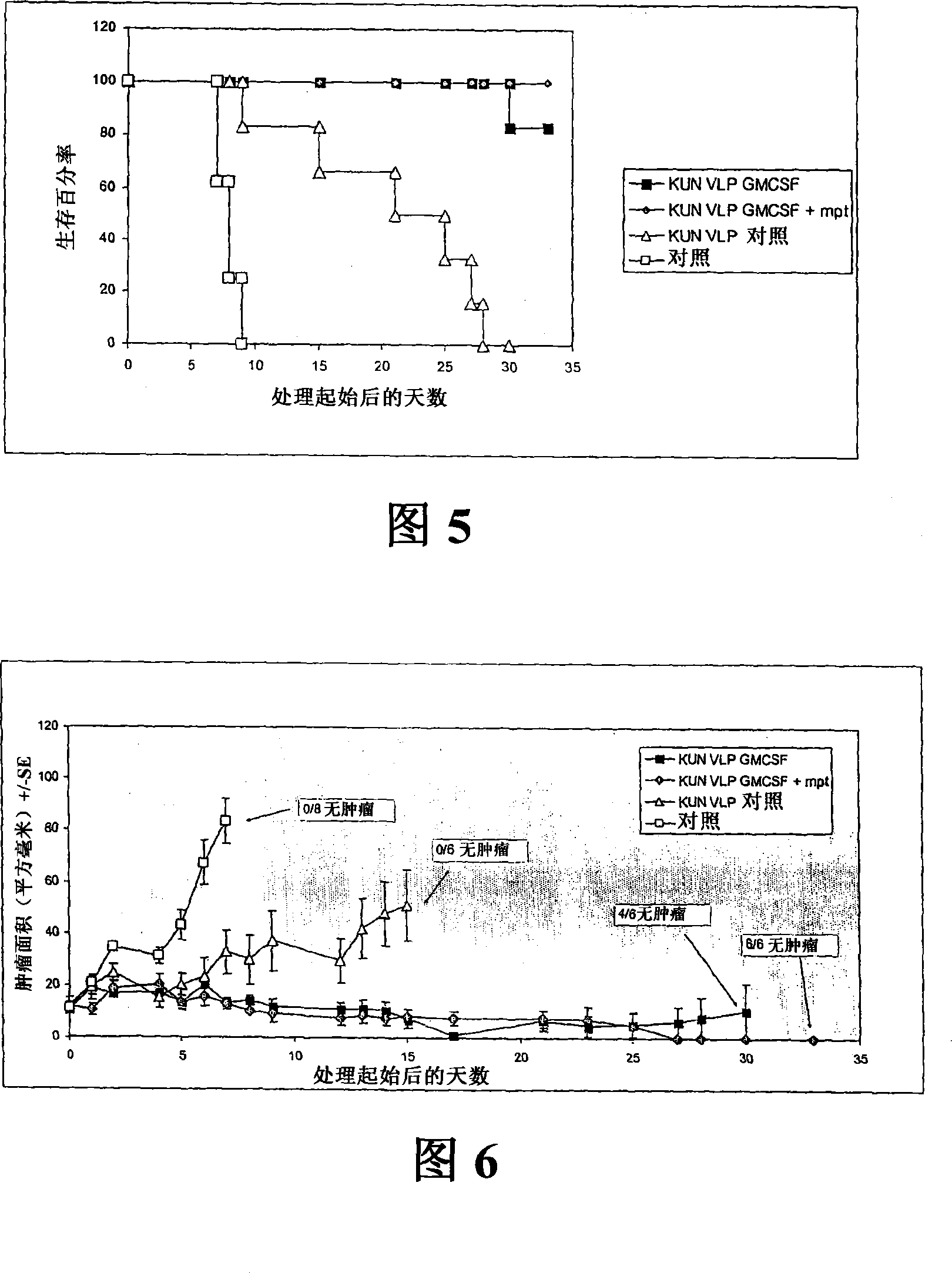Patents
Literature
114 results about "Mesothelioma" patented technology
Efficacy Topic
Property
Owner
Technical Advancement
Application Domain
Technology Topic
Technology Field Word
Patent Country/Region
Patent Type
Patent Status
Application Year
Inventor
Cancer that begins in the tissue that lines the lungs, heart, stomach, and other organs.
Mesothelioma therapeutic agent
InactiveUS20070134242A1Immunoglobulins against cytokines/lymphokines/interferonsImmunoglobulins against cell receptors/antigens/surface-determinantsInterleukin 6Mesothelioma
The present invention provides a mesothelioma therapeutic agent containing an interleukin-6 (IL-6) antagonist such as antibody to IL-6 receptor (IL-6R), and a mesothelioma cell growth inhibitor containing an IL-6 antagonist such as antibody to IL-6R.
Owner:CHUGAI PHARMA CO LTD
CDK inhibitor for the treatment of mesothelioma
ActiveUS8912194B2Prevent proliferationOrganic active ingredientsOrganic chemistryMesotheliomaCDK inhibitor
The invention provides a low molecular weight ATP-competitive CDK inhibitor for use in the treatment of mesothelioma. The compound can be administered together with one or more cytotoxic or cytostatic agents.
Owner:NERVIANO MEDICAL SERVICES SRL
Pyrvinium For The Treatment of Cancer
InactiveUS20090099062A1Promote degradationImprove stabilityBiocideOrganic active ingredientsDiseaseNon cancer
The present invention concerns a pyrvinium compound or an analog thereof for the treatment of cancers. This compound inhibits Wnt activity in the cells of cancers such as adrenocortical, hepatocellular, hepatoblastoma, malignant melanoma, ovarian, Wilm's tumor, Barrett's esophageal, glioma, bladder, breast, gastric, head & neck, lung cell, mesothelioma, and cervical cancers. The present invention also provides a method for assaying for compounds that alter Wnt pathway activity. Also provided are methods for treating Wnt-related non-cancer disease states.
Owner:VANDERBILT UNIV
Kinase inhibitors useful for the treatment of proliferative diseases
The present invention relates to novel kinase inhibitors and modulator compounds useful for the treatment of various diseases. More particularly, the invention is concerned with such compounds, kinase / compound adducts, methods of treating diseases, and methods of synthesis of the compounds. Preferrably, the compounds are useful for the modulation of kinase activity of Raf kinases and disease polymorphs thereof. Compounds of the present invention find utility in the treatment of mammalian cancers and especially human cancers including but not limited to malignant melanoma, colorectal cancer, ovarian cancer, papillary thyroid carcinoma, non small cell lung cancer, and mesothelioma. Compounds of the present invention also find utility in the treatment of rheumatoid arthritis and retinopathies including diabetic retinal neuropathy and macular degeneration.
Owner:DECIPHERA PHARMA LLC
Prognostic and diagnostic method for cancer therapy
InactiveUS20090170715A1Sugar derivativesMicrobiological testing/measurementTherapy resistantCancers diagnosis
The present invention provides novel methods and kits for diagnosing the presence of cancer within a patient, and for determining whether a subject who has cancer is susceptible to different types of treatment regimens. The cancers to be tested include, but are not limited to, prostate, breast, lung, gastric, ovarian, bladder, lymphoma, mesothelioma, medulloblastoma, glioma, and AML. Identification of therapy-resistant patients early in their treatment regimen can lead to a change in therapy in order to achieve a more successful outcome. One embodiment of the present invention is directed to a method for diagnosing cancer or predicting cancer-therapy outcome by detecting the expression levels of multiple markers in the same cell at the same time, and scoring their expression as being above a certain threshold, wherein the markers are from a particular pathway related to cancer, with the score being indicative or a cancer diagnosis or a prognosis for cancer-therapy failure. This method can be used to diagnose cancer or predict cancer-therapy outcomes for a variety of cancers. The markers can come from any pathway involved in the regulation of cancer, including specifically the PcG pathway and the “stemness” pathway. The markers can be mRNA, microRNA, DNA, or protein.
Owner:ORDWAY RES INST
Methods of treating cancer with hdac inhibitors
InactiveUS20070060614A1Better pharmacokinetic profileImprove bioavailabilityBiocideAnimal repellantsDosing regimenOncology
The present invention relates to methods of treating cancers, e.g., mesothelioma or lymphoma. More specifically, the present invention relates to methods of treating mesothelioma or diffuse large B-cell lymphoma (DLBCL), by administration of pharmaceutical compositions comprising HDAC inhibitors, e.g., suberoylanilide hydroxamic acid (SAHA). The oral formulations of the pharmaceutical compositions have favorable pharmacokinetic profiles such as high bioavailability and surprisingly give rise to high blood levels of the active compounds over an extended period of time. The present invention further provides a safe, daily dosing regimen of these pharmaceutical compositions, which is easy to follow, and which results in a therapeutically effective amount of the HDAC inhibitors in vivo.
Owner:MERCK HDAC RESEARCH LLC +1
Kinase inhibitors useful for the treatment of myleoprolific diseases and other proliferative diseases
Compounds of the present invention find utility in the treatment of mammalian cancers and especially human cancers including but not limited to malignant, melanomas, glioblastomas, ovarian cancer, pancreatic cancer, prostate cancer, lung cancers, breast cancers, kidney cancers, cervical carcinomas, metastasis of primary tumor sites, myeloproliferative diseases, leukemias, papillary thyroid carcinoma, non small cell lung cancer, mesothelioma, hypereosinophilic syndrome, gastrointestinal stromal tumors, colonic cancers, ocular diseases characterized by hyperproliferation leading to blindness including various retinopathies, rheumatoid arthritis, asthma, chronic obstructive pulmonary disease, mastocyctosis, mast cell leukemia, a disease caused by c-Abl kinase, oncogenic forms thereof, aberrant fusion proteins thereof and polymorphs thereof, or a disease caused by c-Kit kinase, oncogenic forms thereof, aberrant fusion proteins thereof and polymorphs thereof.
Owner:DECIPHERA PHARMA LLC
Treatments of therapy resistant diseases and drug combinations for treating the same
InactiveUS20080312199A1Accurately predict resistanceEasy to carryAntibacterial agentsBiocideCancers diagnosisMesothelioma
The present invention provides novel methods and kits for diagnosing the presence of cancer within a patient, and for determining whether a subject who has cancer is susceptible to different types of treatment regimens. The cancers to be tested include, but are not limited to, prostate, breast, lung, gastric, ovarian, bladder, lymphoma, mesothelioma, medullablastoma, glioma, and AML. Identification of therapy-resistant patients early in their treatment regimen can lead to a change in therapy in order to achieve a more successful outcome. One embodiment of the present invention is directed to a method for diagnosing cancer or predicting cancer-therapy outcome by detecting the expression levels of multiple markers in the same cell at the same time, and scoring their expression as being above a certain threshold, wherein the markers are from a particular pathway related to cancer, with the score being indicative or a cancer diagnosis or a prognosis for cancer-therapy failure. This method can be used to diagnose cancer or predict cancer-therapy outcomes for a variety of cancers. The markers can come from any pathway involved in the regulation of cancer, including specifically the PcG pathway and the “stemness” pathway. The markers can be mRNA, microRNA, DNA, or protein.
Owner:ORDWAY RES INST
Kinase inhibitors useful for the treatment of proliferative diseases
The present invention relates to novel kinase inhibitors and modulator compounds useful for the treatment of various diseases. More particularly, the invention is concerned with such compounds, kinase / compound adducts, methods of treating diseases, and methods of synthesis of the compounds. Preferrably, the compounds are useful for the modulation of kinase activity of Raf kinases and disease polymorphs thereof. Compounds of the present invention find utility in the treatment of mammalian cancers and especially human cancers including but not limited to malignant melanoma, colorectal cancer, ovarian cancer, papillary thyroid carcinoma, non small cell lung cancer, and mesothelioma. Compounds of the present invention also find utility in the treatment of rheumatoid arthritis and retinopathies including diabetic retinal neuropathy and macular degeneration.
Owner:DECIPHERA PHARMA LLC
Mesothelioma therapeutic agent
ActiveUS20080274106A1Immunoglobulins against cytokines/lymphokines/interferonsImmunoglobulins against cell receptors/antigens/surface-determinantsInterleukin 6Growth retardant
The present invention provides a mesothelioma therapeutic agent containing an interleukin-6 (IL-6) antagonist such as antibody to IL-6 receptor (IL-6R), and a mesothelioma cell growth inhibitor containing an IL-6 antagonist such as antibody to IL-6R.
Owner:CHUGAI PHARMA CO LTD
Dihydropyridopyrimidinyl, dihydronaphthyidinyl and related compounds useful as kinase inhibitors for the treatment of proliferative diseases
The present invention relates to novel dihydropyridopyrimidinyl, dihydronaphthyridinyl, and related compounds which are kinase inhibitors and modulator useful for the treatment of various diseases. More particularly, the invention is concerned with such compounds, kinase / compound adducts, methods of treating diseases, and methods of synthesis of the compounds. Preferably, the compounds are useful for the modulation of kinase activity of Raf kinases and disease polymorphs thereof. Compounds of the present invention find utility in the treatment of mammalian cancers and especially human cancers including but not limited to malignant melanoma, colorectal cancer, ovarian cancer, papillary thyroid carcinoma, non small cell lung cancer, and mesothelioma. Compounds of the present invention also find utility in the treatment of rheumatoid arthritis and retinopathies including diabetic retinal neuropathy and macular degeneration.
Owner:DECIPHERA PHARMA LLC
Kinase inhibitors useful for the treatment of proliferative diseases
The present invention relates to novel kinase inhibitors and modulator compounds useful for the treatment of various diseases. More particularly, the invention is concerned with such compounds, kinase / compound adducts, methods of treating diseases, and methods of synthesis of the compounds. Preferrably, the compounds are useful for the modulation of kinase activity of Raf kinases and disease polymorphs thereof. Compounds of the present invention find utility in the treatment of mammalian cancers and especially human cancers including but not limited to malignant melanoma, colorectal cancer, ovarian cancer, papillary thyroid carcinoma, non small cell lung cancer, and mesothelioma. Compounds of the present invention also find utility in the treatment of rheumatoid arthritis and retinopathies including diabetic retinal neuropathy and macular degeneration.
Owner:DECIPHERA PHARMA LLC
N-acyl ureas exhibiting anti-cancer and anti-proliferative activities
Compounds of the present invention find utility in the treatment of mammalian cancers and especially human cancers including, but not limited to, malignant melanomas, solid tumors, glioblastomas, ovarian cancer, pancreatic cancer, prostate cancer, lung cancers, breast cancers, kidney cancers, hepatic cancers, cervical carcinomas, metastasis of primary tumor sites, myeloproliferative diseases, chronic myelogenous leukemia, leukemias, papillary thyroid carcinoma, non-small cell lung cancer, mesothelioma, hypereosinophilic syndrome, gastrointestinal stromal tumors, colonic cancers, ocular diseases characterized by hyperproliferation leading to blindness including various retinopathies, diabetic retinopathy, rheumatoid arthritis, asthma, chronic obstructive pulmonary disease, mastocytosis, mast cell leukemia, and diseases caused by PDGFR-α kinase, PDGFR-β kinase, c-KIT kinase, cFMS kinase, c-MET kinase, and oncogenic forms, aberrant fusion proteins and polymorphs of any of the foregoing kinases.
Owner:DECIPHERA PHARMA LLC
System and method for raman chemical analysis of lung cancer with digital staining
InactiveUS20120083678A1Accurate and reliable diagnostic informationOvercome limitationsRadiation pyrometryDiagnostics using spectroscopyData setMesothelioma
The present disclosure provides for a system and method for diagnosing biological samples that combines the visual staining features familiar to pathologists with the accurate, reliable, and nondestructive capabilities of Raman chemical imaging. The invention disclosed herein may be applied to diagnose lung cancer samples. A method may comprise illuminating a biological sample to generate interacted photons, filtering said interacted photons using a tunable filter, and detecting interacted photons to generate a test Raman data set representative of said sample. The method may further comprise applying at least one chemometric technique and / or a digital stain to said test Raman data set. This test Raman data set may be analyzed to diagnose said sample as comprising at least one of: adenocarcinoma, mesothelioma, and combinations thereof. A system may comprise an illumination source, a tunable filter, and a detector configured to generate a test Raman data set representative of a biological sample.
Owner:CLEMLMAGE
Kinase inhibitors useful for the treatment of proliferative diseases
The present invention relates to novel kinase inhibitors and modulator compounds useful for the treatment of various diseases. More particularly, the invention is concerned with such compounds, kinase / compound adducts, methods of treating diseases, and methods of synthesis of the compounds. Preferrably, the compounds are useful for the modulation of kinase activity of Raf kinases and disease polymorphs thereof. Compounds of the present invention find utility in the treatment of mammalian cancers and especially human cancers including but not limited to malignant melanoma, colorectal cancer, ovarian cancer, papillary thyroid carcinoma, non small cell lung cancer, and mesothelioma. Compounds of the present invention also find utility in the treatment of rheumatoid arthritis and retinopathies including diabetic retinal neuropathy and macular degeneration.
Owner:DECIPHERA PHARMA LLC
Methods of treating mesothelioma with suberoylanilide hydroxamic acid
InactiveUS7148257B2Simple processPotent inhibitor of histone deacetylaseBiocideOrganic chemistryMesotheliomaCancer research
Methods for treating mesothelioma comprising administering the histone deacetylase inhibitor suberoylanilide hydroxamic acid (SAHA) are disclosed.
Owner:MERCK HDAC RESEARCH LLC +1
Prognostic and diagnostic method for disease therapy
Owner:ORDWAY RES INST
Targeted osmotic lysis of cancer cells
A targeted osmotic lysis (TOL) of tumor cells that over-express voltage-gated sodium channels (VGSCs) has been developed that uses a combined therapy of a drug that blocks sodium, potassium-adenosine triphosphatase (Na+, K+-ATPase) that is then followed by an activation of VGSCs, for example, by electrical or pharmacological stimulation. Activation of VGSCs conducts sodium into the cancer cells in much greater amounts than non-cancer cells. Water follows this sodium gradient into the cancer cells, causing swelling and lysis. Because non-cancerous cells do not over-express VGSCs, less sodium and less water will enter the cells, and the non-cancerous cells will not lyse. This method is applicable to all cells that over-express VGSCs, including, but not limited to, highly invasive breast cancer, prostate cancer, small cell lung cancer, non-small cell lung carcinoma, lymphoma, mesothelioma, neuroblastoma, and cervical cancer.
Owner:BOARD OF SUPERVISORS OF LOUISIANA STATE UNIV & AGRI & MECHANICAL COLLEGE
Method for expansion of tumour-reactive T-lymphocytes for immunotherapy of patients with specific cancer types
ActiveUS7951365B2Conducive to survivalRaise the ratioBiocideInanimate material medical ingredientsDiseasePresent method
Methods for treating a patient suffering from a neoplastic disease are disclosed and described. A number of diseases can be treated under the present methods, including without limitation gall bladder cancer, hepato cellular cancer, ovarian cancer, small intestine cancer, lung cancer, mesothelioma, breast cancer, kidney cancer, pancreas cancer, prostate cancer, carcinoid cancer, leiomyosarcoma, or metastasis thereof. A general method for providing such treatment may include: 1) identifying in a patient one or more sentinel and / or metinel lymph nodes draining the neoplasm; 2) resecting the one or more nodes and, optionally all or part of the tumour or metastasis; 3) isolating tumour-reactive T-lymphocytes from said lymph nodes; 4) in vitro expanding said tumour-reactive T-lymphocytes; and 5) administering the thus obtained tumour-reactive T-lymphocytes to the patient.
Owner:SENTOCLONE INT AB
Polo like kinase1 (PLK1) inhibitor and use thereof
InactiveCN102151272AHas inhibitory effectAntineoplastic agentsHeterocyclic compound active ingredientsDiseaseMelanoma
The invention relates to the field of pharmaceutical chemistry, in particular to medical use of 34 compounds and medicinal composition containing the compounds, particularly use as Polo like kinase 1 inhibitor. Diseases associated with the Polo like kinase 1 inhibitor include melanoma, liver cancer, kidney cancer, acute leukemia, non-small-cell lung cancer, prostatic cancer, cancerous goiter, skin cancer, colorectal cancer, pancreatic cancer, ovarian cancer, breast cancer, myelodysplastic syndromes, esophageal cancer, gastrointestinal tract cancers or mesothelioma.
Owner:CHINA PHARM UNIV
Cyclopropane amides and analogs exhibiting Anti-cancer and Anti-proliferative activities
Compounds of the present invention find utility in the treatment of mammalian cancers and especially human cancers including, but not limited to, malignant melanomas, solid tumors, glioblastomas, ovarian cancer, pancreatic cancer, prostate cancer, lung cancers, breast cancers, kidney cancers, hepatic cancers, cervical carcinomas, metastasis of primary tumor sites, myeloproliferative diseases, chronic myelogenous leukemia, leukemias, papillary thyroid carcinoma, non-small cell lung cancer, mesothelioma, hypereosinophilic syndrome, gastrointestinal stromal tumors, colonic cancers, ocular diseases characterized by hyperproliferation leading to blindness including various retinopathies, diabetic retinopathy, rheumatoid arthritis, asthma, chronic obstructive pulmonary disease, mastocytosis, mast cell leukemia, and diseases caused by PDGFR-α kinase, PDGFR-β kinase, c-KIT kinase, cFMS kinase, c-MET kinase, and oncogenic forms, aberrant fusion proteins and polymorphs of any of the foregoing kinases.
Owner:DECIPHERA PHARMA LLC
Methods for treating diseases of the lung
Provided herein are methods of treating diseases of the lung in a mammal, including cancer of the lung, mesothelioma, emphysema, and bronchopleural fistula. The methods comprise delivering a biocompatible hydrogel polymer optionally comprising a therapeutic agent directly to a target site using a minimally invasive delivery device, wherein the biocompatible hydrogel polymer gels at the target site.
Owner:C P MEDICAL CORP
Method for expansion of tumour-reactive t-lymphocytes for immunotherapy of patients with specific cancer types
ActiveUS20090022695A1Conducive to survivalRaise the ratioBiocideMammal material medical ingredientsDiseaseCancer type
Methods for treating a patient suffering from a neoplastic disease are disclosed and described. A number of diseases can be treated under the present methods, including without limitation gall bladder cancer, hepato cellular cancer, ovarian cancer, small intestine cancer, lung cancer, mesothelioma, breast cancer, kidney cancer, pancreas cancer, prostate cancer, carcinoid cancer, leiomyosarcoma, or metastasis thereof. A general method for providing such treatment may include: 1) identifying in a patient one or more sentinel and / or metinel lymph nodes draining the neoplasm; 2) resecting the one or more nodes and, optionally all or part of the tumour or metastasis; 3) isolating tumour-reactive T-lymphocytes from said lymph nodes; 4) in vitro expanding said tumour-reactive T-lymphocytes; and 5) administering the thus obtained tumour-reactive T-lymphocytes to the patient.
Owner:SENTOCLONE INT AB
New compounds inhibitors of the YAP/TAZ-TEAD interaction and their use in the treatment of malignant mesothelioma
Owner:INVENTIVA
Methods of treating cancer with HDAC inhibitors
InactiveCN1870985ATotal daily dose highInhibit deacetylase activityAnhydride/acid/halide active ingredientsDosing regimenBlood level
The present invention relates to methods of treating cancers, e.g., mesothelioma or lymphoma. More specifically, the present invention relates to methods of treating mesothelioma or diffuse large B-cell lymphoma (DLBCL), by administration of pharmaceutical compositions comprising HDAC inhibitors, e.g., suberoylanilide hydroxamic acid (SAHA). The oral formulations of the pharmaceutical compositions have favorable pharmacokinetic profiles such as high bioavailability and surprisingly give rise to high blood levels of the active compounds over an extended period of time. The present invention further provides a safe, daily dosing regimen of these pharmaceutical compositions, which is easy to follow, and which results in a therapeutically effective amount of the HDAC inhibitors in vivo.
Owner:MERCK HDAC RESEARCH LLC +1
Pemetrexed salt and preparation method thereof
The invention discloses a pemetrexed salt and a preparation method and use thereof, the pemetrexed salt can be dipotassium salt, arginine salt, heme-L-lysinate salt and tromethamine salt of the pemetrexed, and the pemetrexed salt can be used for treatment of various cancers such as mesothelioma, lung cancer and the like.
Owner:CHONGQING PHARMA RES INST
Methods of treating mesothelioma with a pi3k inhibitor compound
Methods are provided for treating mesothelioma patients with a dual PI3K / mTOR inhibitor, GDC-0980: (S)-1-(4-((2-(2-aminopyrimidin-5-yl)-7-methyl-4-morpholinothieno[3,2-d]pyrimidin-6-yl)methyl)piperazin-1-yl)-2-hydroxypropan-1-one, and having the structure:
Owner:F HOFFMANN LA ROCHE & CO AG
Chimeric antigen receptor, gene thereof and recombinant expression vector of gene as well as CARMSLN-NKT cell and preparation method and application of CARMSLN-NKT cell
InactiveCN107793483AEnhanced ability to target and recognize MSLN antigens on the surface of cancer cellsEnhance specific killing activityAntibody mimetics/scaffoldsMammal material medical ingredientsSequence signalAntigen receptor
The invention discloses a chimeric antigen receptor, a gene thereof and a recombinant expression vector of the gene as well as a CARMSLN-NKT cell and a preparation method and application of the CARMSLN-NKT cell. The chimeric antigen receptor is MSLNScFv-CD8-CD137-CD3 zeta including tandem a CD8a signal peptide, an MSLNScFv, shortened CD8 hinge and transmembrane regions, a CD137 intracellular signal domain and a CD3zeta intracellular signal domain; and the CARMSLN-NKT cell provided by the invention has very good specific killing activity against a mesothelioma cell when co-culture is performedwith the MSLN-positive mesothelioma cell.
Owner:伍志强
Chimeric antigen receptor, gene and recombinant expression vector thereof, CARMSLN-NKT cell and preparation method and application thereof
InactiveCN105924528AEnhanced ability to target and recognize MSLN antigens on the surface of cancer cellsEnhance specific killing activityMammal material medical ingredientsFermentationAntigen receptorCD137
The invention discloses a chimeric antigen receptor, a gene and a recombinant expression vector thereof, a CARMSLN-NKT cell and a preparation method and application thereof. The chimeric antigen receptor is MSLNScFv-CD8-CD137-CD3 zeta, and comprises a rat growth hormone signal peptide, MSLNScFv, a hinge region and a transmembrane domain of CD8, an intracellular signaling structural domain of CD137 and an intracellular signaling structural domain of CD3 zeta, which are in series connection. The CARMSLN-NKT cells and MSLN positive mesothelioma cells are co-cultured to reach specific killing activity on mesothelioma cells.
Owner:GENERAL HOSPITAL OF PLA
Flavivirus replicon constructs for tumour therapy
InactiveCN101120086AOrganic active ingredientsSsRNA viruses positive-senseParanasal Sinus CarcinomaMelanoma
Owner:レプリカン バイオテク プロプライエタリー リミテッド
Features
- R&D
- Intellectual Property
- Life Sciences
- Materials
- Tech Scout
Why Patsnap Eureka
- Unparalleled Data Quality
- Higher Quality Content
- 60% Fewer Hallucinations
Social media
Patsnap Eureka Blog
Learn More Browse by: Latest US Patents, China's latest patents, Technical Efficacy Thesaurus, Application Domain, Technology Topic, Popular Technical Reports.
© 2025 PatSnap. All rights reserved.Legal|Privacy policy|Modern Slavery Act Transparency Statement|Sitemap|About US| Contact US: help@patsnap.com
